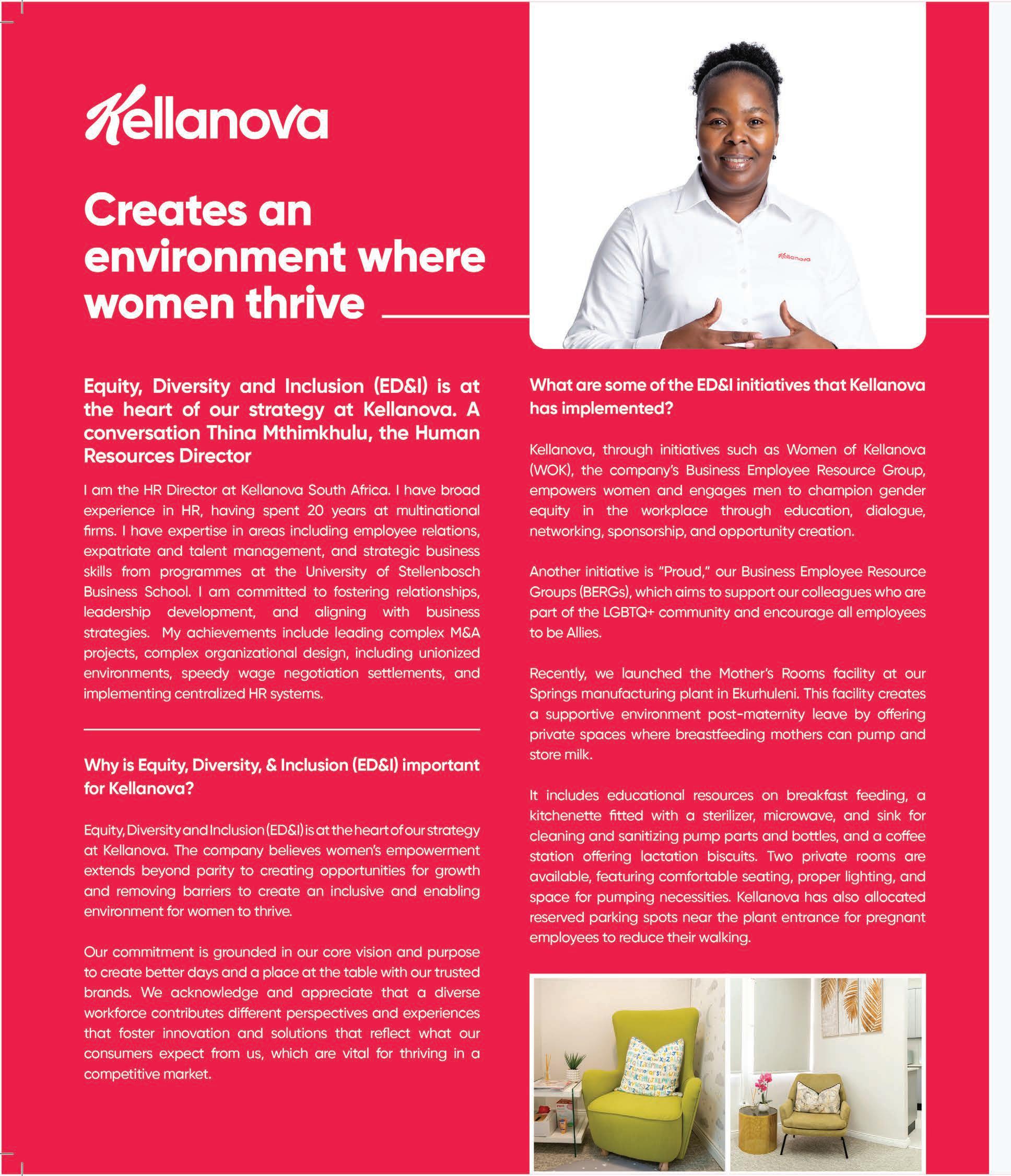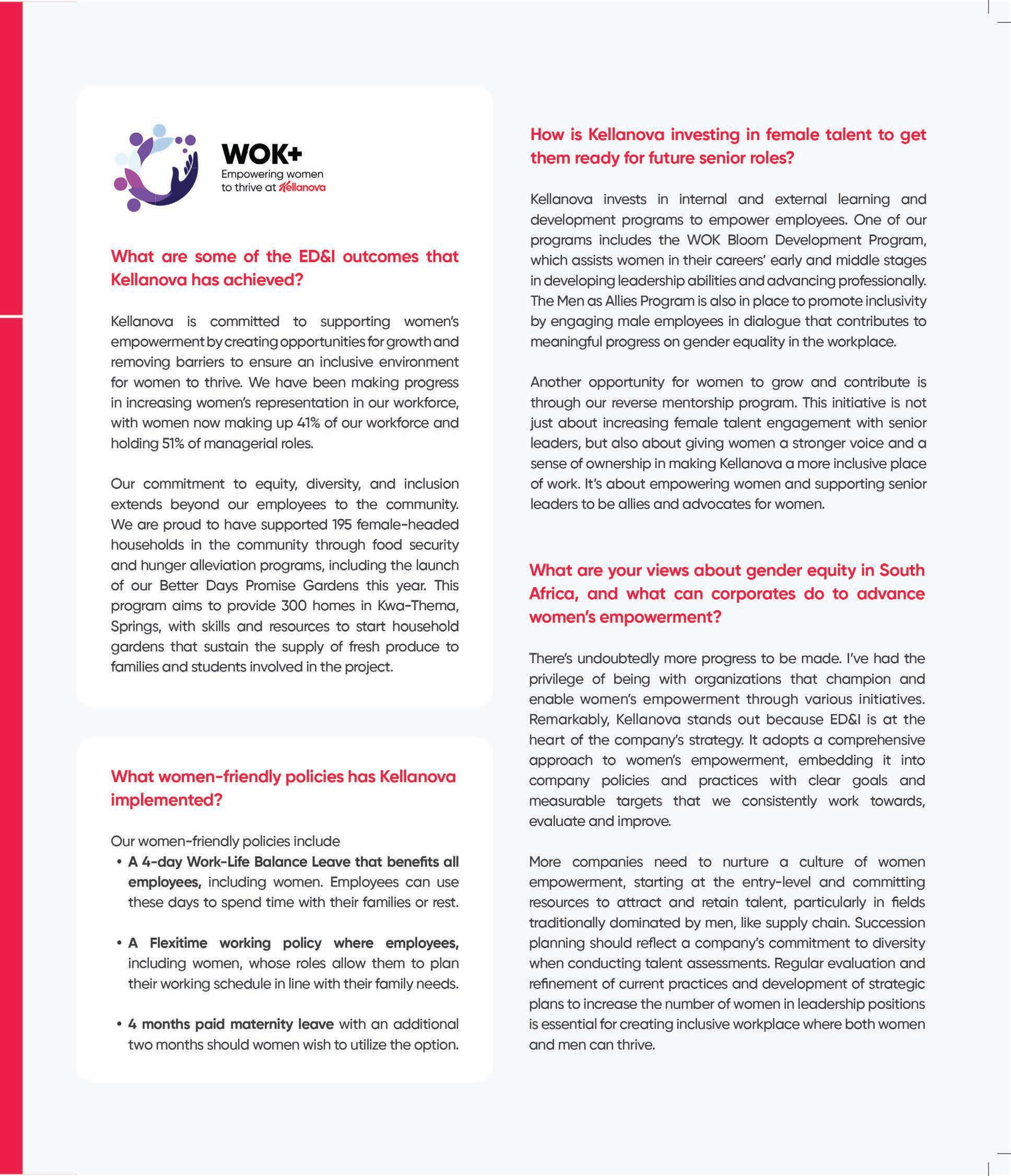













12TH AFRICA AND MIDDLE EAST GENDER MAINSTREAMING AWARDS






































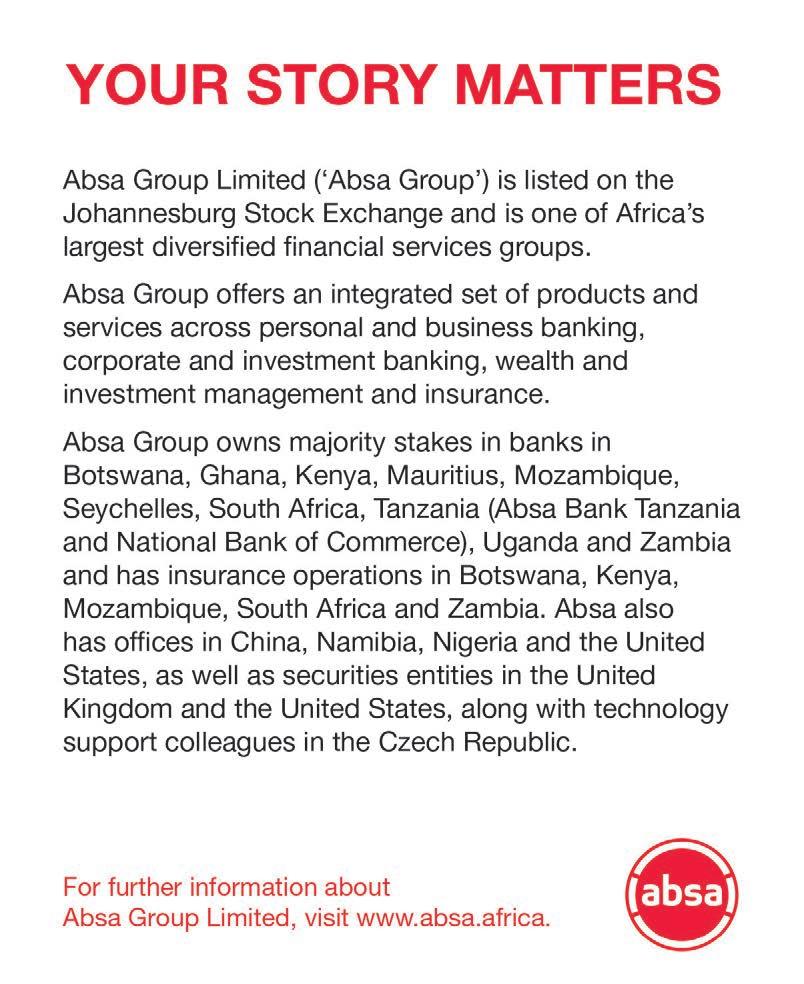
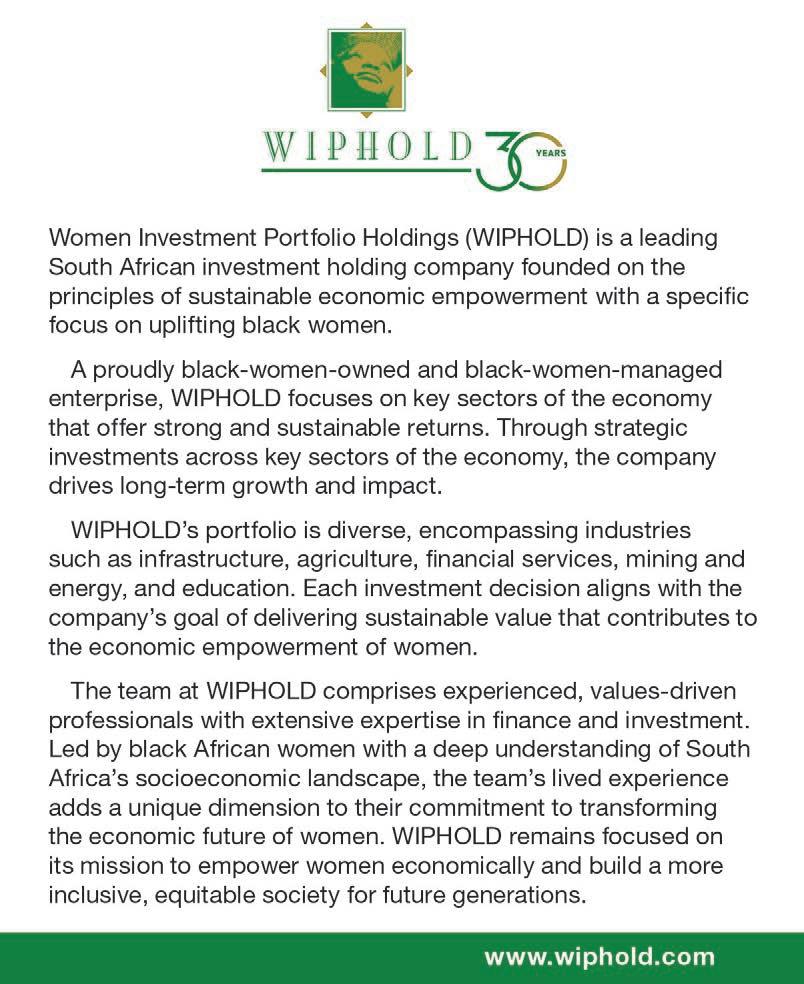

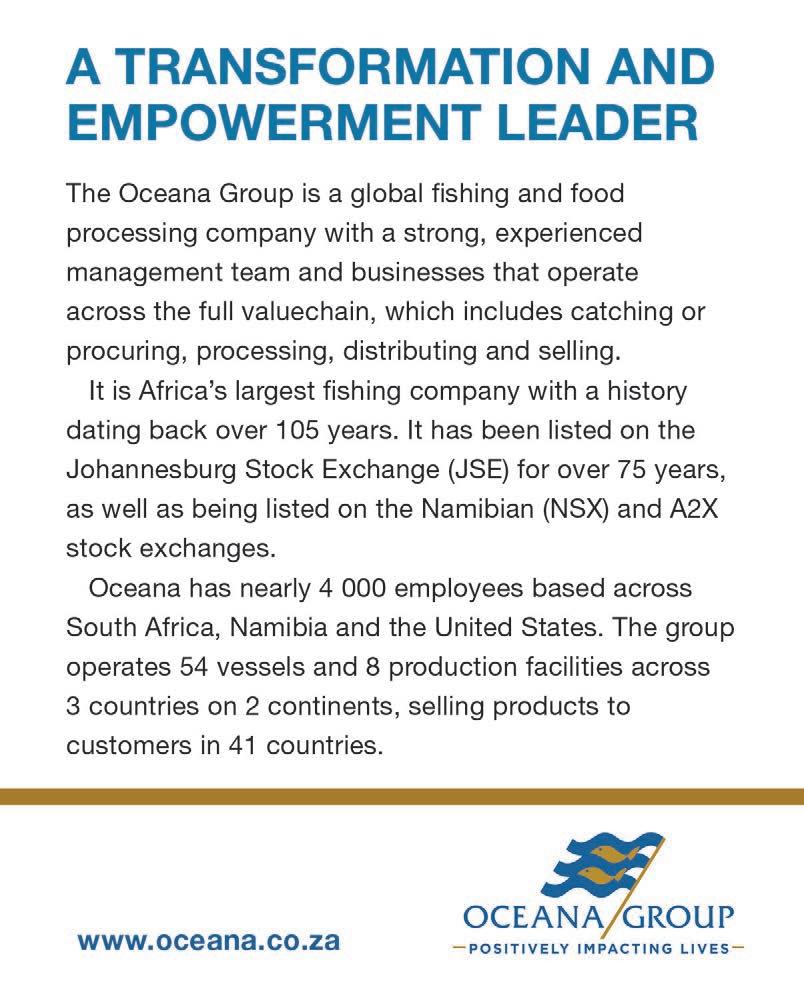




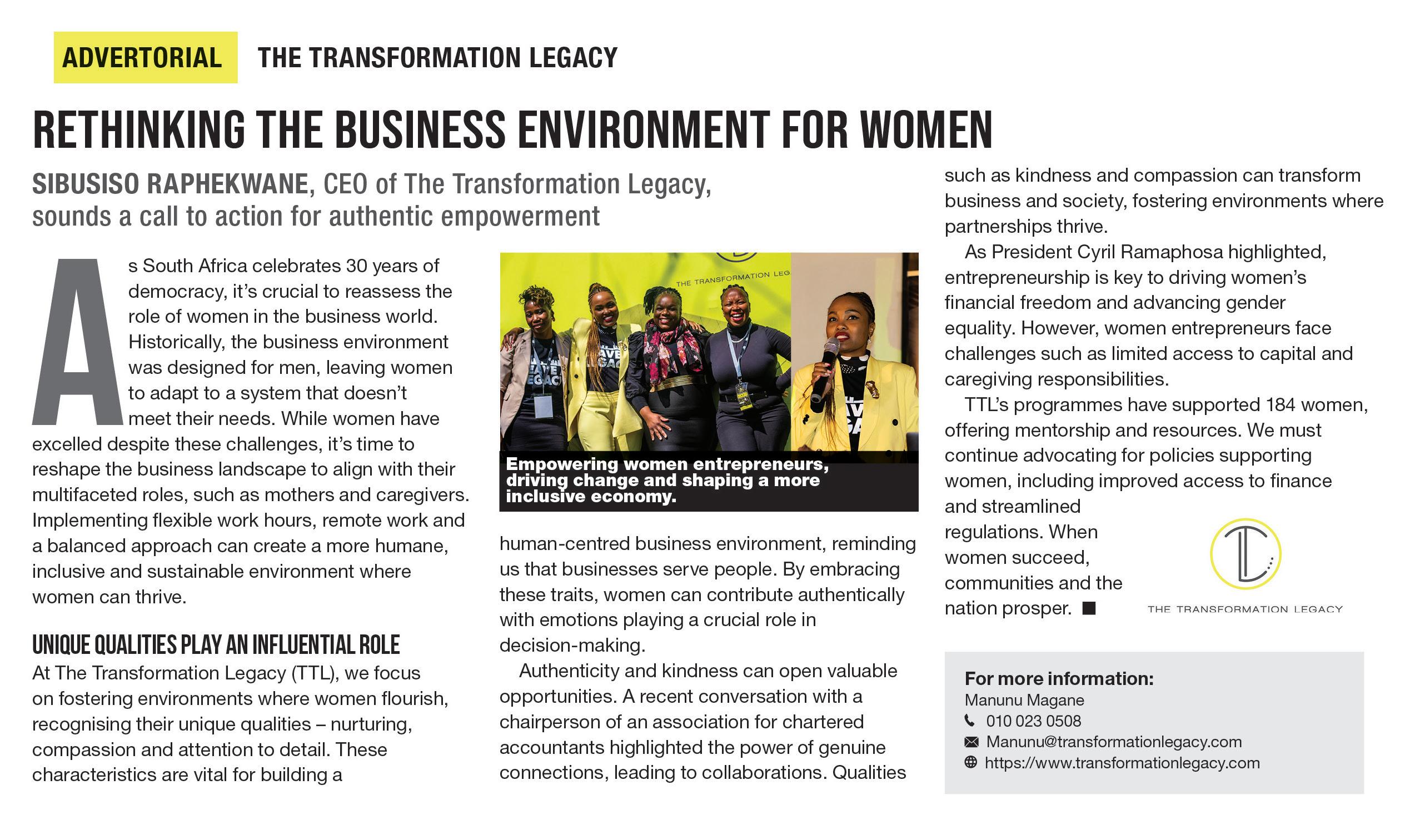
19 2024 GENDER MAINSTREAMING AWARDS
66 THE RISE OF FEMALE ENTREPRENEURS
12 BUILDING A LADDER OF ROLE MODELS
It’s not the glass ceiling we need to worry about – rather, it’s the slippery career ladder.
14 AFRICA, THE NEW BENCHMARKING HUB?
Africa is not generally considered a pioneer in gender mainstreaming or equality, but Colleen Larsen, CE of Business Engage, argues that it’s time for that to change.
16 A COLLABORATIVE APPROACH
The growth and impact of the Gender Mainstreaming Awards.







We announce the winners and nalists of the Accenture 2024 Gender Mainstreaming Awards Africa and the Middle East. SPECIAL REPORT: WOMEN IN SUPPLY CHAIN
42–55 GENDER DIVERSITY
We unpack the imperatives of creating and maintaining gender transformation within the logistics and supply chain sector.
ECONOMIC INCLUSION AND EMPOWERMENT

57 EMPOWERING WOMEN, EMPOWERING ECONOMIES
The economic inclusion of women is not just a matter of social justice; it’s a strategic business decision that can drive growth and innovation in Africa. 57

“Exxaro’s
stance on women empowerment is comprehensive and FIRMLY rooted in promoting gender equality and inclusivity within the organisation.”

– DR NOMBASA TSENGWA, CEO, EXXARO

Entrepreneurship is an important factor in economic development and growth. We share an overview of the increasing visibility and success of women in entrepreneurship, highlighting their contributions to the local economy.
75 BEYOND THE GLASS CEILING
Addressing the gender gap requires committed, intentional actions, says Videsha Proothveerajh, director of Vodacom Business.
81 HARNESSING AI TO PROMOTE GENDER EQUALITY IN THE WORKPLACE
We unpack how arti cial intelligence is emerging as a transformative tool in the pursuit of gender parity at work.
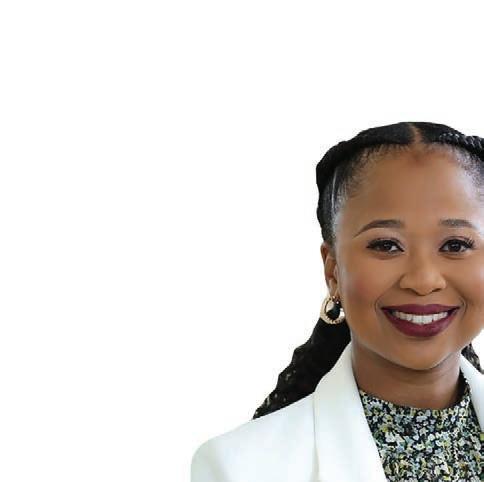




87
There is a correlation between diversity in leadership and organisational performance. We look at how two South African giants in the food sector are living proof of the role of diversity in boosting organisational performance.
The South African International Maritime Institute is committed to transforming South Africa’s maritime resources into a sustainable and thriving oceans economy. However, the attainment of this goal depends on increasing gender diversity.
Do organisations look and feel different when there’s a woman at the helm? We chat with some of South Africa’s most inspiring women to nd the answer.

The University of Pretoria is providing mentorship and championing supportive and inclusive pathways for success; For young girls excelling in science and mathematics seeing someone like them succeeding and thriving, says the University of Stellenbosch, isn’t just inspirational, it is transformational.
103
What does fair pay really mean?
107
Gender representation in the South African automotive industry is being driven from within, highlighting a move to a more representative industry.
111
Measuring the impact of social initiatives is crucial to building sustainable, successful programmes. We ask the experts to share why it is important to understand if and how social impact has been achieved as a result of investments made.

More than 50 per cent of the labour force is now female – yet matters related to menopause remain largely taboo.
The South African insurance industry is working hard to achieve better gender parity in a traditionally maledominated business. Most research is done at C-suite level, but we extrapolate what the rest of the industry looks like.
118
Women across our continent are a rising force in unexpected industries. Nearly 30 years post-Beijing, African women are rede ning leadership, breaking barriers, and blazing trails across various business sectors.




















Thi s edition of Celebrating Women is a celebration of the dynamic and transformative role women are playing across industries, not just in South Africa, but throughout the African continent and beyond. The conversation about gender mainstreaming and economic inclusion is no longer just about filling quotas. It’s about a fundamental shift in how we view leadership, equity and opportunity in the workplace.
For too long, Africa has lagged in the global narrative on gender equality, but it’s time for this to change. In her insightful piece, Colleen Larsen, CE of Business Engage, challenges Africa to rise as the new benchmarking hub for gender mainstreaming. Larsen’s bold call for action is echoed throughout this issue as we highlight the increasing need to destroy gender barriers, build supportive role models and implement tangible change.
We’re also proud to announce the finalists and winners of the 2024 Accenture Gender Mainstreaming Awards Africa & Middle East. Their stories offer compelling proof that empowering women empowers entire economies. Economic inclusion is not just a social justice imperative; it is a smart business strategy. It’s proven that when women thrive, businesses and economies prosper.
In our leadership section, we delve into insights from women trailblazers redefining leadership in unexpected sectors. From
Empowered women build empowered societies, and this issue is a testament to that truth.
entrepreneurship and the maritime industry to harnessing artificial intelligence to close gender gaps, women are innovating in ways that bring new perspectives and fresh approaches to old challenges. Leaders such as Vodacom’s Videsha Proothveerajh remind us that addressing the gender gap requires intentional, long-term actions.
This is truly the year of the African woman. As we approach nearly 30 years post-Beijing, African women are blazing trails across industries once deemed inaccessible. We must continue to amplify their voices, celebrate their victories and challenge outdated structures.
Together, let’s continue pushing boundaries and creating spaces where women are not only visible, but also integral to decision-making and economic growth. Empowered women build empowered societies, and this issue is a testament to that truth.
Raina Julies
Published by:
PIcasso Headline, a proud division of Arena Holdings (Pty) Ltd Hill on Empire, 16 Empire Road (cnr Hillside Road), Parktown, Johannesburg, 2193 PO Box 12500, Mill Street, Cape Town, 8010 www.businessmediamags.co.za
EDITORIAL
Content Manager: Raina Julies rainaj@picasso.co.za
Contributors: Trevor Crighton, Mwangi Githahu, Debbie Goodman, Martin Hopkins, Raina Julies, Colleen Larsen, Lebogang Letsoalo, Vukani Magubane, Nondumiso Mfenyana,
Busani Moyo, Ntombi Nong, Brendon Petersen, Morag Phillips, Videsha Proothveerajh, Lisa Witepski
Copy Editor: Brenda Bryden
Content Co-ordinator: Natasha Maneveldt
Online Editor: Stacey Visser vissers@businessmediamags.co.za
DESIGN
Head of Design: Jayne Macé-Ferguson
Senior Designer: Mfundo Archie Ndzo
Advert Designer: Zainab Aboo
Cover Images: supplied
SALES
Project Manager: Tarrin-Lee Watts
wattst@arena.africa | +27 87 379 7119
+27 79 504 7729
Sales: Jacqueline Bezuidenhout
PRODUCTION
Production Editor: Shamiela Brenner
Subscriptions and Distribution: Fatima Dramat, fatimad@picasso.co.za
Printing: CTP Printers, Cape Town
MANAGEMENT
Management Accountant: Deidre Musha Business Manager: Lodewyk van der Walt
General Manager, Magazines: Jocelyne Bayer






COPYRIGHT: Picasso Headline. No portion of this magazine may be reproduced in any form without written consent of the publisher. The publisher is not responsible for unsolicited material. Celebrating Women is published by Picasso Headline. The opinions expressed are not necessarily those of Picasso Headline. All advertisements/advertorials have been paid for and therefore do not carry any endorsement by the publisher.


Empathy, understanding and support in the workplace are needed to ensure that women of menopausal age can continue to make valuable contributions, writes LIEN POTGIETER , head of marketing, Medihelp Medical Scheme
Iwork alongside skilled, ambitious, highly experienced and creative women at the pinnacle of their careers. In fact, of the 83 leadership positions, 63 per cent are lled by women. Furthermore, half of Medihelp employees are women aged between 40 and 60, nearing perimenopause or menopause, or fully experiencing it.
This phenomenon of women over 50 excelling in the workplace is not unique to Medihelp. According to the World Economic Forum, women of menopausal age represent the fastest-growing segment of the global workforce and are staying employed longer than ever before.
Many of these women serve as role models for younger colleagues. Yet, misunderstood symptoms, such as mood swings, brain fog and low self-esteem, can affect their professional reputations. Menopausal women often reduce their work responsibilities or exit the workforce entirely, especially when there is no support in the workplace. With them, years of experience, expertise and mentorship leave.
As a woman nearing 50 myself, experiencing symptoms that echo this change in my body and demeanour, the topic of perimenopause and menopause follows me everywhere, even into online research I conduct privately because I worry how it will affect my career.
But even when I witness red faces, exhausted expressions and even tears in meeting rooms, and know what it is all about, I am unsure how to respond. And I believe many other women do the same with this natural biological transition: we sweep it under the boardroom carpet.
It all changed, however, when a journalist recently sought my opinion on menopause and its impact. The time had come to stop soldiering on silently and say and do something. I embraced the chance to re ect and advocate for the menopause issue to

MENOPAUSAL WOMEN OFTEN REDUCE THEIR WORK RESPONSIBILITIES OR EXIT THE WORKFORCE ENTIRELY, ESPECIALLY WHEN THERE IS NO SUPPORT IN THE WORKPLACE.
have a place in the organisation’s inclusivity policy and our employee value proposition.
In collaboration with our principal of cer, Varsha Vala, and our head of human resources, Sandra Minne, (both in their early 50s), we promptly developed our own survey. The response rate was overwhelming! Women expressed a desire for reliable information about perimenopause and menopause along with access to tailored counselling on these topics. Respondents also highlighted the importance of medical and holistic support for symptom management and options for special leave and breaks.
I found one respondent’s comment particularly touching. She wrote: “I do believe that especially women are very unkind to one another when it comes to something as natural as menopause. Most women I know mark it off as ‘not that bad’ or we are ‘kidding to get attention’ and have no sympathy, even though it might be different from their experience. There must be more understanding in the workplace.”
This poignant feedback underscores the critical need for empathy, understanding and practical solutions in the workplace to support women through menopause while keeping them as an engaged, productive part of the team.
By fostering a supportive environment and openly addressing these issues, we can help ensure that female employees don’t become marginalised or isolated during this natural human transition.


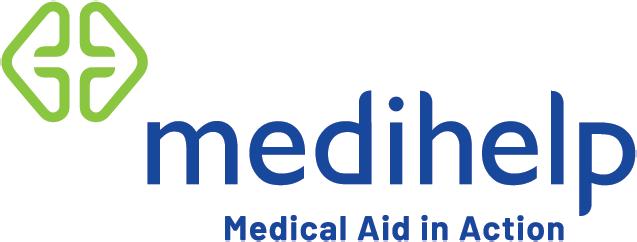
For more information: www.medihelp.co.za
It’s not the glass ceiling we need to worry about – rather, it’s the slippery career ladder. To rectify this, we need a new narrative, writes COLLEEN LARSEN , CE of Business Engage

For decades, the “glass ceiling” has been identi ed as the chief obstacle foiling the career trajectory of ambitious women. I’d like to propose that this ceiling is not a problem – not because it doesn’t exist, but because few women manage to reach a level where it becomes a challenge. That’s because they’ve all fallen off the career ladder well before they can reach the highest rung.
There are many reasons for this, but one of the most inhibiting challenges facing females is the dearth of role models who may inspire them.
That’s not to say there aren’t enough women in business, government or other areas to provide examples aspiring young females can look up to. Certainly, there is a growing number of women leaving their mark,
BY RECOGNISING THE WOMEN WHO MAY NOT YET BE RIGHT AT THE VERY TOP, BUT ARE NEVERTHELESS MAKING PROGRESS, WE ENCOURAGE OTHERS TO TAKE THAT FIRST STEP.
changing the way we think about leadership and forging new paths.
The problem is not that role models do not exist; it’s that the narrative around them is deeply awed.
One of the most glaring errors in that narrative is how we de ne role models. Merriam-Webster.com de nes a role model as “a person whose behaviour in a particular role is imitated by others”.
But when it comes to women, it should be the willingness – or rather insistence on –offering a hand up to the women who wish to follow in their footsteps that sets them apart as role models.
The reality is that we often overlook the women standing right in front of us, doing just this. Kudos go to the women inhabiting corner of ces, but those who have taken the rst step forward are equally deserving of recognition – even if that step is a small one. Because when we acknowledge the
trajectory they have set in motion, we make room for others to move forward, too.
This is essential because the gap between the starting point and the end goal can often feel intimidating – if not downright unattainable. By recognising the women who may not yet be right at the very top, but are nevertheless making progress, we encourage others to take that rst step.
It’s the classic story of having the courage and motivation to move forward because you have seen someone else – someone who looks like you and has faced similar challenges – do it rst. When you see that person standing on the rung ahead of you, you know you can also make it there. And then you can make it to the next and the next – all the way to the top.
There’s plenty of anecdotal evidence to prove just how powerful a motivator this can be. One of my favourite stories is that of Buhle Hanise, president of the African Women Accountants Association (AWCA), whose decision to study a CA(SA) quali cation was made after the organisation’s founder, Sindi Zilwa, spoke about the profession at her school. It’s a prime example of how a goal can be inspired by seeing someone else achieving. When someone else can, and does, we believe that we can, too.
It’s not dif cult to nd the reason for this lack of female role models. Women are certainly in the eld making their mark and helping corporates and other entities meet their aims. But we don’t often hear about them – that’s because we are extremely reticent about making our accomplishments known. Women are still being socialised in a way that reinforces humility and warns against bragging. They’re accustomed to keeping mum about their achievements – so it’s not surprising that when corporates look for people to promote or advance, no women raise their hands and say, “Pick me.”
What they don’t realise is that this reticence affects the next generation of would-be future female leaders. When they refuse to acknowledge their acts of greatness, no matter how small, they deny others the opportunity to see the potential we all hold. They don’t put themselves forward as role models and so other women continue to believe there are no females for them to emulate. There is yet another dimension of the narrative that must change:
THERE IS A STORY OF STRUGGLE BEHIND EVERY SUCCESS; EACH OF US HAS FACED DIFFICULTY AND EACH OF US HAS FOUND THE RESOURCES AND METTLE TO OVERCOME IT.
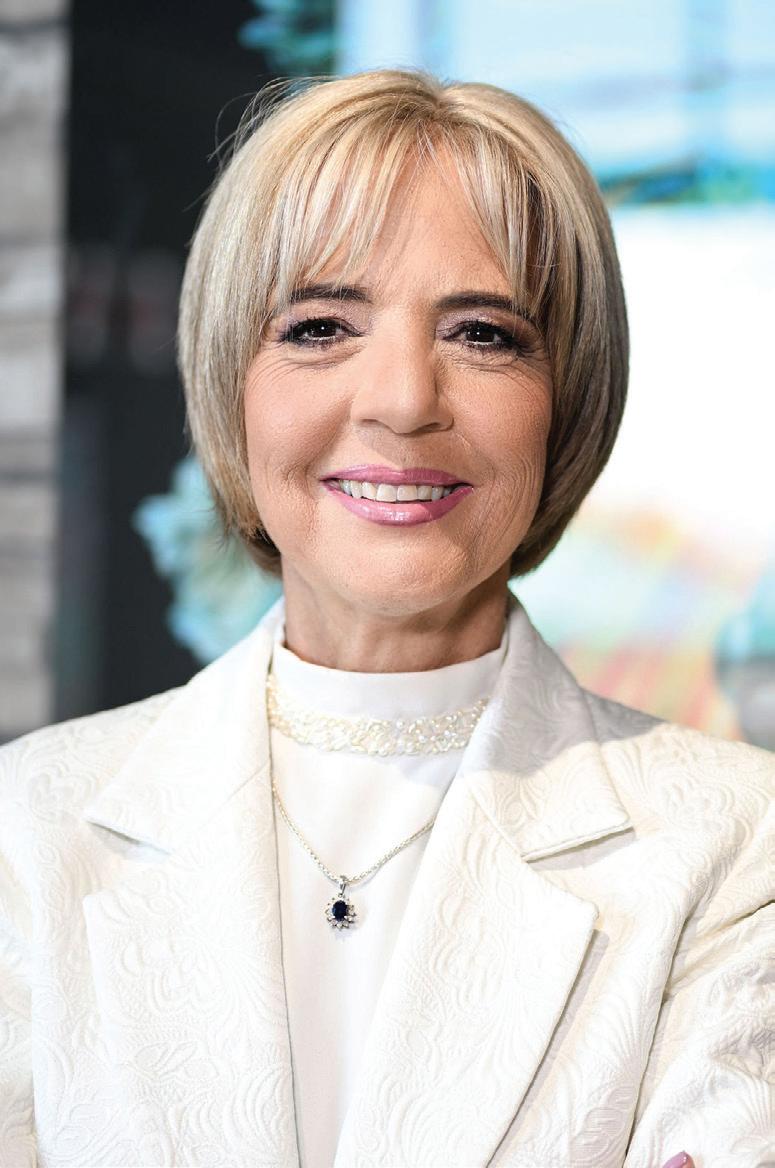
we need to recognise our own achievements and take pride in them.
This was brought home when I was introduced to Dr Adriana Marais. Dr Marais is a truly fascinating woman: a theoretical physicist and the founder of Proudly Human, which conducts experiments around the habitation of extreme environments essentially to help people prepare for life on a different planet. She is also a director of the Foundation for Space Development Africa, an organisation working to send Africa’s rst mission to the moon.
Dr Marais has successfully raised funding for the installation of a telescope on the moon and has received a string of accolades in recognition of this and other accomplishments (including recently qualifying as a nalist in RMB’s Fearless Thinker Award).
Dr Marais says: “We want African children to look up at the moon, and feel a sense of belonging. We want data from the Africa2Moon telescope to be accessible to researchers across the continent to drive
increased participation in space exploration and STEM (science, technology, engineering and mathematics) in Africa.”
However, unless we become more outspoken about what we have accomplished, those African children will remain oblivious to the possibilities within our grasp. Unless we proudly and boldly draw attention to all we have done, others will be blind to the potential that lies within them.
Of course, when we hear stories such as those of Dr Marais, it’s the triumphs we tune into. We seldom hear about the times leaders have tripped up. Because of this, we imagine that all successful women –from the innovative entrepreneur to the leader of a thriving company – must have had a smooth path.
Intellectually, we know this cannot be true. There is a story of struggle behind every success; each of us has faced dif culty and each of us has found the resources and mettle to overcome it. It’s important to share these stories; to be frank about the journey as we enjoy arriving at the destination.
Doing this creates hope. It allows the women who feel daunted and overwhelmed to take stock and know that others have been in this precise position and carried on to achieve their desired outcome. We need to talk about how women have encountered opportunities disguised as challenges and how this made them greater by encouraging them to nd solutions.
When we do this, when we change the narrative around what it means to be a female role model, we will create a community of women who support each other; a community that understands success can take many shapes and forms and that there are many milestones on this journey. What’s more, we can begin to understand the role and responsibility we all have as we tackle the slippery ladder. We need to establish a squad of cheerleaders on every rung of that ladder so that those at the very bottom can maintain their momentum all the way to the very top.
Africa is not generally considered a pioneer in gender mainstreaming or equality, but COLLEEN LARSEN , CE of Business Engage, argues that it’s time for that to change
When discussing equity and inclusion, we tend to hold up examples of corporates leading the way and the women at their helm. We congratulate their forward-thinking mindsets and commend their efforts. And, indeed, we should. But while we acknowledge those who excel, those who are steadfastly moving forward, perhaps not at quite the same pace, tend to be overlooked.
There are literally thousands of such women in Africa; women whose progression is chipping away at old-fashioned business models. And while they are seeing the fruits of their labour in terms of individual advancement, the establishments that have welcomed their efforts and embraced diversity are winning, too. After all, South Africans are familiar with the positive impact that can be wrought by bringing together people from different backgrounds with different talents and different ways of thinking.
It’s ironic, then, that when it comes to benchmarking progress in gender diversity and advancement, we continue to look to countries such as the United States and the United Kingdom (UK) for guidance, upholding them as role models in this area.
The reality is that, in many instances, corporates and other entities in South Africa and other countries throughout the continent are making far greater progress. Consider, for example, that gender advancement moved

to the top of corporate agendas in the UK only after a commission ordered compliance, threatening penalties for those failing to meet quotas.
In South Africa, corporates and government entities have been working hard to increase female representation in the workplace for several years – no speci c gender regulation required. We do this because we understand that diversity makes business sense.
The Netherlands is another country where female advancement has been bolstered by government intervention, with gender balance laws stating that 40 per cent of every company’s workforce must comprise women. Dutch companies moved to comply with the law, but very few exceeded the stipulated
quota. Again, South Africa stands in contrast to this example, with many companies meeting parity without guidance from speci c gender legislation. Other African countries are making similar headway. (It’s worth noting that the African Champion of the Gender Mainstreaming Awards, Standard Chartered, operates across the continent.) Kenya stands out in this regard, while Zambia should be commended for its efforts to further girls’ attainment of education.
It’s fair to say that different countries have different areas of strength, which may be why indexes, such as the World Economic Forum, indicate that our continent is not as far along as we would like it to be. But take a deeper look at each territory, unpack its stories, examine where they are moving forward and it becomes clear that this continent has the potential to stand as an example to others.
How do we harness this potential? How can we ensure that Africa takes its rightful place as the benchmark for gender advancement? Business Engage is taking steps in this regard with the introduction of a platform called Impact For People, which invites people to tell their stories. This ensures we give acknowledgement where it is due. Importantly, though, we are bringing attention to the fact that gender advancement is not simply about numbers.
For every manager, executive and board member, there is a community bene tting from the impact they have made. We must hear how they have changed the lives of those around them and those coming behind them. We need to hear how their leadership journey has changed them, too, and what we can learn from their lessons.
Above all, we must stay focused on our efforts. A recent report by the Institute for Security Studies shows that reducing gender inequality in the continent could lead to an economy that’s US$259-million larger in 2043, compared to current path forecasts. There can be no stronger argument for making Africa a hub for gender mainstreaming.
IN SOUTH AFRICA, CORPORATES AND GOVERNMENT ENTITIES HAVE BEEN

LISA WITEPSKI chats with Colleen Larsen, CE of Business Engage, about the growth and impact of the Gender Mainstreaming Awards
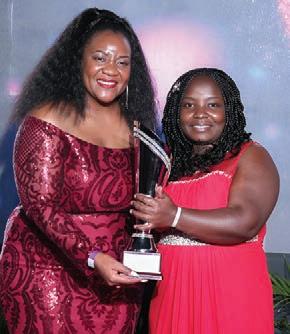



It’s amazing what can be achieved when like-minded entities join together on issues that matter to them, says Colleen Larsen, CE of Business Engage.
“The emphasis here is on collaboration – the headway we’ve made in changing the way organisations approach inclusiveness and gender diversity is not our own accomplishment, but something we have achieved by working side by side,” she explains.
There is no doubt this collaborative approach is yielding dividends. Since its establishment in 2011, Business Engage has amassed 115 corporate members – and counting. Moreover, the organisation has expanded beyond South Africa’s borders and now has a presence in Uganda, Tanzania, Namibia, Botswana, Ghana, Nigeria, Zimbabwe, Kenya and Zambia.
The pro le enjoyed by the Gender Mainstreaming Awards has kept pace with the organisation’s growth. From the rst event in 2012 where 190 people were hosted in the city hall, the 2023 edition attracted a 600-strong crowd in Johannesburg, an audience of 300 in Nairobi and further attendees in Ghana and Nigeria. The awards
event was, furthermore, streamed to more than 5 800 people.
While this is impressive, Larsen maintains that it’s not the increasing interest from corporates that she considers Business Engage’s greatest success. Rather, it’s the development the organisation has achieved through collaboration that matters. She cites the example of a company that was named as a runner-up in several categories several years ago, but didn’t record any wins. Two years later, after acting on the feedback and guidance provided by the judges, the same company was named the Gender Mainstreaming Champion in Southern Africa.
“This proves the effectiveness of our interventions. Far from having a prescriptive approach, we believe in holding conversations with our members and offering input so they can grow stronger. We don’t see ourselves as activists, but rather as
inspirers: we’ll tell you what’s working (and what isn’t) so that it’s possible to make positive change and inspire others to join the movement as we move forward. And we really love this process,” Larsen says.
Larsen informs that Business Engage operates across three pillars. The rst, Engage Stakeholders, aims to do just that: working with stakeholders to create improvement. Underpinned by initiatives, such as the Gender Mainstreaming Awards, and various research activities, this pillar is headed by a steering committee comprising representatives from each member corporate. Larsen explains that the reciprocal relationship created through this model allows for closer partnerships based on the real understanding of corporates’ needs and challenges.
“FAR FROM HAVING A PRESCRIPTIVE APPROACH, WE BELIEVE IN HOLDING CONVERSATIONS WITH OUR MEMBERS AND OFFERING INPUT SO THEY CAN GROW STRONGER.” – COLLEEN LARSEN
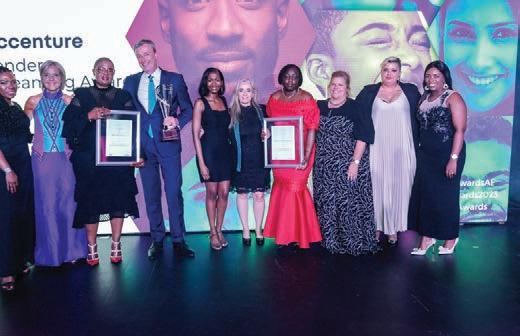




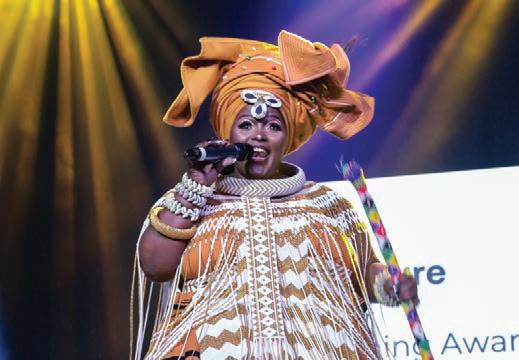
The second pillar, Build, incorporates the Masterclass series based on the books penned by Larsen, Gender Matters and The Board Masterclass Series, and aims to create a pipeline of people ready to step into senior management positions.
Finally, Connect is a series of monthly events that bring together corporates across various industries, strengthening their efforts in gender mainstreaming by creating a platform to share knowledge and best practice. “The idea is to avoid groupthink and blockages by creating a space where they can learn and grow together. After all, we are all working towards a common objective. We all want to see real change,” Larsen comments.
She says while Business Engage is always eager to explore new opportunities, the organisation’s priority lies in ensuring its interventions carry real impact. “We are not chasing numbers. This is about creating lasting, sustainable impact, which means that any work we undertake is carried out slowly, consistently and deliberately. We are also keenly aware that what works and what’s important for an organisation in Johannesburg differs from what will work in Durban and again in Nairobi.”
This insight has led the organisation’s expansion into new territories and will continue to do so as the aim is to set up operations in a further six African countries within the next two to three years.
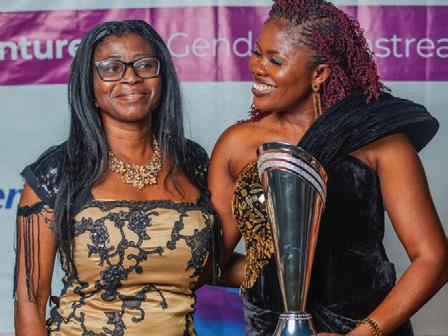
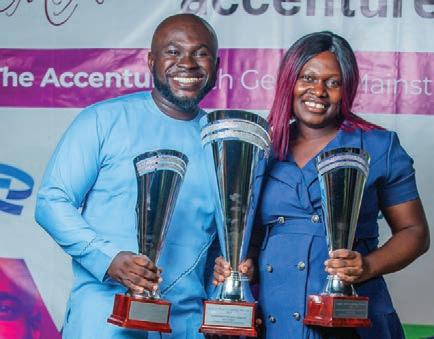


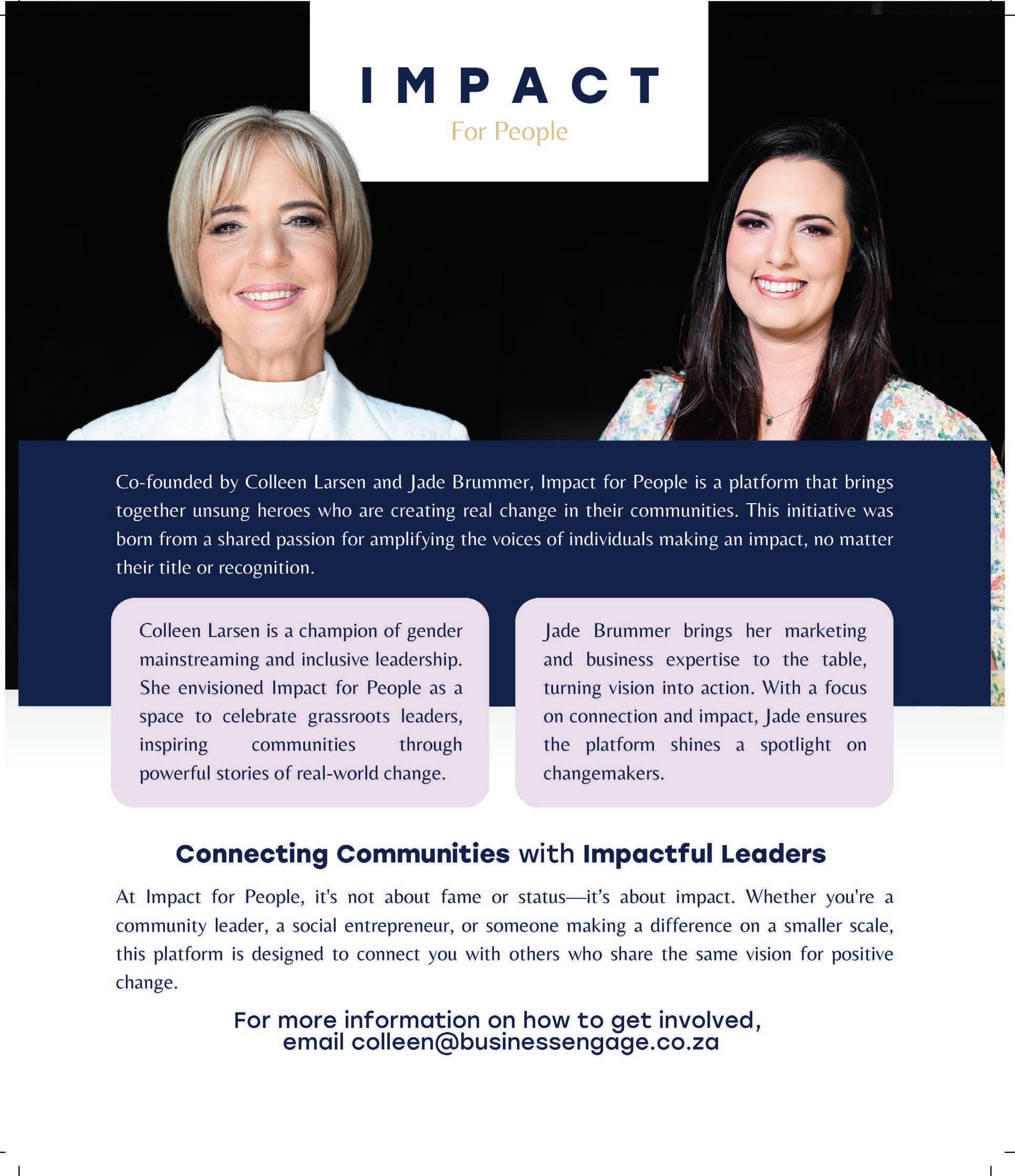

This award represents the pinnacle of recognition for outstanding commitment to advancing gender equality and inclusivity across the continent. Companies and individuals vying for this coveted award have demonstrated exceptional leadership and innovation in gender mainstreaming as a business imperative. The Overall Africa and Middle East Champion Award serves as an inspiration, highlighting the critical role of gender mainstreaming in driving positive change.
(including executive committees and pipeline development)
CRITERIA: The key focus of the 30% Club, an affiliate of Business Engage, is to encourage corporates to aim to achieve a minimum of 30 per cent female representation on boards. It is acknowledged that board diversity both in respect of gender and skill set leads to more successful boards. The board of an organisation considers the strategy of the business with management and has oversight of the implementation of that strategy.
The crux of this award is to recognise and acknowledge companies that have successfully transformed their boards and board subcommittees while ensuring that female directors are judged on their experience, contribution to and involvement in the board and not their gender. It seeks to acknowledge companies that challenge themselves to diversify their boards. In summary, entries may be based on:
1. Number of nonexecutive women directors on the board;
2. Number of women on subcommittees and a list of which subcommittees;
3. Entrants to supply the board diversity policy/framework, which they are obliged to give the JSE; and/or
4. Pipeline development – details of the outlined hard plan to improve the number of women on the board.
‘‘Gender mainstreaming means the process of identifying gender gaps and making women’s, men’s, girls’ and boys’ concerns and experiences integral to the design, implementation, monitoring and evaluation of policies, legislation and programmes in all sectors of life to ensure that they benefit equally.” – 30% Club.
CRITERIA: In a multinational, those in charge of governance in the respective regions are expected to play a major role in shaping business and economic activities. They are expected to come up with a framework that will underpin the principles, policies, laws and regulations they put in place to guide these economic and business activities and the compliance thereof. We are mindful, however, that to reach this status, a pipeline programme is required to make available this talent for consideration. This reward recognises those multinationals that have successfully put in place a programme/s to shift the statistics in terms of women on their executive committees and have made successful appointments or have developed a pipeline programme geared towards appointments in the future. Judging will be based on the following:
1. Number of women in executive management.
2. How many of these are board directors on the board of that company?
3. What roles do they occupy?
4. What programmes have been put in place to provide support for the existing women on the exco?
5. What programmes have been put in place to create a succession pipeline for women to break the glass ceiling and get onto the exco?

CRITERIA: This award recognises organisations that have developed strategies or have already implemented measures for the progressive realisation of a greater representation and meaningful participation of women in decision-making structures, which must include:
1. Setting targets for such representation and participation.
2. Building women’s capacity to participate.
3. Enhancing the understanding and attitudes of men to accept the capabilities and participation of women as their equals.
4. Developing support mechanisms for women.
CRITERIA: Empowerment of women in the workforce means allowing women to have more control over their lives. It means giving them the freedom to make their own schedules, learn new skills and gain self-reliance. This does not have to relate to your own company, but can be empowering women generally in the workplace. Empowerment is created when the strengths that women already bring to the company are recognised and utilised. Research provided by the United Nations has shown that businesses that promote women empowerment and gender equality are more profitable. As more businesses take part in gender equality measures and see their revenue increase as a result, the case for empowering women in the workplace is likely to become a more recognised goal.
This award recognises and acknowledges organisations that have not only advanced women in their workplaces through training and capacity building, but have also successfully transformed corporate behaviour and practices.
CRITERIA: We consider women’s entrepreneurship development to be an important channel to women’s economic empowerment and a pillar on the road to sustainable development. Through setting up their own businesses, women can transform their opportunity to gain economic independence, overcome poverty and improve their wellbeing. Through this process, women can also become drivers of change and take a long-term perspective, accounting for the consequences of our actions for our children and their children and grandchildren to secure a better future.
This award recognises and acknowledges organisations that have strategies in place to allow for future empowerment of women-owned or women-managed businesses or that have successfully used enterprise development as a mechanism to empower women-owned or women-managed businesses. It also includes organisations that source products and services from previously underused women-owned suppliers, resulting in a number of growth-orientated women entrepreneurs who are able to service various corporates.
Sustainable development cannot be achieved without more equitable distribution of resources and the eradication of poverty. Empowering women means giving the opportunity to thousands of women to get out of the poverty trap.
CRITERIA: Women with disabilities are particularly disadvantaged due to the multiple forms of discrimination they experience. For example, disabled girls are the least prioritised in terms of access to school and education. Development activities such as income-generating programmes for women are largely not accessible to women with disabilities and do not take active steps to include disabled women. This award recognises and acknowledges companies that have strategies in place to allow for future disability programmes or have implemented sustainable disability programmes that have enhanced skills and provided employment opportunities for people with disabilities.
CRITERIA: Sustainable development cannot be achieved without a more equitable distribution of resources and the eradication of poverty. Empowering women means giving thousands of women the opportunity to get out of the poverty trap. Women not only constitute the vast majority of the world’s poor, but are also at a higher risk of poverty compared to men. Poverty does not only refer to material resources, such as money, food or housing, but also to social resources such as access to education, healthcare or meaningful relations with other people.
This award recognises and acknowledges organisations that have strategies in place to allow for future programmes or have implemented sustainable initiatives around poverty alleviation that have enhanced skills and provided income opportunities, which have positively impacted the lives of women and poor communities.

CRITERIA: Women are severely under-represented in decision-making processes across the continent, including South Africa and internationally. Education has been identified as the major obstacle to women’s access to leadership, and cost as the key barrier to girls’ education. Poverty and familial obligations end many girls’ hopes for education or the opportunity to fulfil their dreams.
This award recognises and acknowledges organisations that have strategies in place to allow for future education of young women or have implemented initiatives with the objective of addressing social inequities by educating and empowering young women leaders from diverse economic backgrounds. These initiatives have positively impacted the lives of young women who will become the next generation of women leaders.
CRITERIA: As from January 2017, the board of directors or the nomination committee of all JSE-listed companies must have a policy on the promotion of gender diversity at board level. The company is required to report to shareholders in its annual report on how the board of directors or the nomination committee have considered and applied the policy of gender diversity in the nomination and appointment of directors. If applicable, the board of directors or the nomination committee must further report progress in respect thereof on agreed voluntary targets.
This award is to recognise and acknowledge companies that have embraced both the spirit and the letter of this new listing requirement. It also recognises organisations reporting on pipeline development and further recognises whether the organisation has referred to gender or gender policies in the previous year’s reports. At the same time, the award recognises that many organisations report on “transformation” or “diversity and inclusion”, which may include racial, gender and other transformation issues. It is acknowledged that, like many of the other categories in the awards, the criteria for a winning award this year would naturally be set slightly lower than what would be expected in the following years as organisations get to grip with this new focus in their reporting requirements. In 2017, the organisers reserved the right to “recognise” an organisation or organisations and not bestow an award as such. This is currently the only award where nominations are actively sought by the awards’ organisers. Organisations are, of course, welcome to apply to be included in this category.
The vision of the 30% Club is to ensure “that gender balance on boards not only encourages better leadership and governance, but ALSO THAT DIVERSITY FURTHER contributes to better all-round board performance and ultimately increased corporate performance for both companies and their shareholders”.

CRITERIA: Male or female who is actively sponsoring others up the ranks. They have ingrained into their leadership style a recognition of the provable benefits to their business that diversity brings, with special emphasis on gender. The nomination is made by a person or group of people who know the nominee very well, primarily in a business role, and the nominee accepts the nomination in writing.
CRITERIA: A female growing her career who understands the responsibility that comes with being a role model and the need to inspire others to do the same. The nominee is nominated by a person or group of people who know her very well, primarily in a business role, and the nominee accepts the nomination in writing.
CRITERIA: This award seeks to identify an individual who is recognised among their colleagues and/or community for their ground-breaking, innovative thought leadership on tackling gender mainstreaming issues. The individual needs to be able to demonstrate confidence and steadfastness in the pursuit of those ideas. Their ideas must be/have been actionable by a broader audience. Implementation or actionability of ideas by either the individual or a broader group is key.
LISTED
Winner Tiger Brands
Finalist Assmang (Pty) Ltd Black Rock Mine Operations
Finalist Sibanye Stillwater Limited
Finalist Assmang (Pty) Ltd Khumani Iron Ore Mine
NONLISTED
Winner KLM Empowered Human Solutions Specialists (Pty) Ltd
Finalist African Female Voices
Finalist CMS South Africa
Finalist TransEra Solutions (Pty) Ltd
OVERALL WINNERTiger Brands
PRIORITISING LEADERSHIP AND REPRESENTATION

Tiger Brands is making signi cant strides in fostering workforce diversity, enhancing African, Coloured and Indian (ACI) representation and promoting gender equity and inclusion of people with disabilities. Throughout the year, the company launched various women’s development programmes to meet its gender equity objectives. The Tiger Women’s Network provides valuable networking and growth opportunities, including personalised coaching and mentorship.
The company continues to prioritise leadership development and cultural transformation by offering training on unconscious bias and hosting dialogues that support a culture of diversity and nondiscrimination. As of 2023, Tiger Brands' workforce comprises 96 per cent ACI representation, with 64 per cent at the top management level. Internal leadership placements stood at 83 per cent ACI, and 100 per cent of the management trainee intake was ACI.
Women constitute 31 per cent of the overall workforce, with 30 per cent in top management and 46 per cent at senior management levels. Impressively, 82 per cent of the year's management trainee intake was female. New hires mainly belonged to Generation Y, with a notable 97 per cent ACI and 52 per cent female representation.



THE 2024 AFRICA GENDER MAINSTREAMING CHAMPION: STANDARD CHARTERED BANK
LISTED
Winner Assmang (Pty) Ltd Khumani Iron Ore Mine
Finalist BAT South Africa
MULTINATIONAL
Winner Accenture South Africa (Pty) Ltd
Finalist Kearney Africa
NONLISTED
Winner Eyelight Optometrists
Finalist KLM Empowered Human Solutions Specialists (Pty) Ltd
Finalist Webber Wentzel
Finalist Construction Diary
NONPROFIT
Special mentionRe Aga Mmogo Rehabilitation Centre
Special mentionF. Ismail Group
OVERALL WINNER KLM Empowered Human Specialists (Pty) Ltd
KLM Empowered is dedicated to fostering diversity and inclusion, ensuring people with disabilities have opportunities to reach their full potential.

It believes everyone possesses unique talents and is committed to breaking down barriers to inclusion. KLM Empowered designs training programmes catering to people with disabilities and creates environments accommodating diverse needs. It aims to help businesses become more inclusive, advocating for policies and practices that integrate persons with disabilities into the workforce, ensuring they can access the same opportunities as their nondisabled peers.
Through its commitment to equity, KLM Empowered plays a crucial role in reshaping South Africa’s workforce, promoting a culture of inclusivity where diversity is recognised as a key driver of innovation and growth.

LISTED
Winner Tiger Brands
Finalist Spur Corporation Limited
Finalist Assmang (Pty) Ltd Khumani Iron Ore Mine
Finalist TransUnion GCC Africa
MULTINATIONAL
Winner Kearney Africa
Finalist Metropolitan Life of Botswana
Finalist Accenture South Africa (Pty) Ltd
Finalist CMS South Africa
NONLISTED
Winner African Marine Solutions Group (Pty) Ltd
Finalist Liz's Legal Trainee Mentorship Programme
Finalist African Female Voices
Finalist A Seat at the Table
Finalist ABSIP Women in Focus (AWIF)
OVERALL WINNERKearney Africa

Kearney Africa has taken signi cant steps to invest in empowering women across the continent. As part of its commitment to gender equality and inclusive economic growth, Kearney Africa actively promotes initiatives that support women's advancement in business and leadership roles. One of Kearney’s key activities is its participation in mentorship and leadership programmes designed to equip women with the skills and networks they need to excel in the workplace. The rm partners with local organisations and international bodies to provide training, resources and opportunities aimed at developing female leaders in industries ranging from technology to agriculture.
Through these initiatives, Kearney Africa is helping unlock the untapped potential of women and contributing to corporate success and socioeconomic development across Africa. By investing in women, the rm supports the creation of more inclusive and resilient economies, positioning Africa for sustainable growth.
LISTED
Winner Santam Limited
Finalist BAT South Africa
Finalist Assmang (Pty) Ltd Beeshoek Iron Ore Mine
MULTINATIONAL
Winner Kellanova
Finalist PwC Southern Africa
NONLISTED
Winner African Bank
Finalist UpTime Consulting (Pty) Ltd
Finalist Shared Value Africa
Finalist Nestlé
Finalist CMS South Africa
GOVERNMENT
Winner Energy and Water SETA
OVERALL WINNERSantam Limited



REFLECTING THE SOUTH AFRICA WE LIVE IN
Santam is committed to building a business that re ects the diverse South Africa where it operates, ensuring representation across all its structures. Through its Black Broker Development Programme, the company has empowered over 600 emerging intermediaries, demonstrating its dedication to fostering growth among under-represented groups. As of the latest gures, 76 per cent of Santam's employees are black and 46 per cent of its board members are female, showcasing its commitment to diversity and inclusion at every level of the organisation.
In 2023, Santam directed over R3.2-billion of its procurement spend towards black-owned suppliers, contributing to economic empowerment and supporting local businesses. The company has also invested R117-million in the ASISA Enterprise and Supplier Development Fund, which is dedicated to the sustainable development of small and medium enterprises across South Africa. Further re ecting its commitment to social impact, Santam has spent R13.6-million on learnerships and internships and invested R171-million in nancial education initiatives to empower communities.
Additionally, approximately 300 000 access policies have been sold to historically uninsured individuals, advancing nancial inclusion and providing vital coverage to those without it previously. These efforts illustrate Santam’s commitment to being a company that serves and represents everyone in South Africa.
LISTED
Winner Coronation Fund Managers
MULTINATIONAL
Finalist PwC Southern Africa
NONLISTED
Finalist CMS South Africa
OVERALL WINNERCoronation Fund Managers

Coronation Fund Managers believes that transformation, diversity and inclusion are vital to a healthy business, economy and society. These principles have been ingrained in its culture since the company was founded in 1993 and, over the past 30 years, it has been actively involved in transforming the nancial services sector and South African society, empowering employees, supporting businesses and bene tting the communities where it operates. Women represent 51 per cent of its employees and 50 per cent of its board directors. Black individuals account for 64 per cent of its employees and 86 per cent of its new starters.
Additionally, black investment professionals manage R254-billion, representing 42 per cent of Coronation Managers’ total assets under management. The company is a Level 1 B-BBEE contributor as measured by the nancial sector code.
Winner London Stock Exchange Group
Finalist BMW Group Financial Services South Africa
Finalist TransUnion Africa
OVERALL WINNERLondon Stock Exchange Group
The London Stock Exchange Group (LSEG) aims to champion diversity, starting with a leadership team that embodies its mission and values and fosters a culture of belonging. LSEG’s leaders are accountable for upholding and demonstrating the company's culture daily. They are expected to embed inclusive
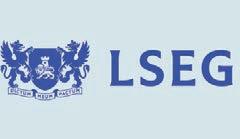
LISTED
Winner Assmang (Pty) Ltd Beeshoek Iron Ore Mine
Finalist Sasol Limited
Finalist Assmang (Pty) Ltd Khumani Iron Ore Mine
Finalist Nedbank Group Limited
Finalist Spur Corporation Limited
NONLISTED
Winner Accenture South Africa (Pty) Ltd
Finalist Nestlé
Finalist WomHub
Finalist P zer Laboratories (Pty) Ltd
Finalist Regent Hill International School
OVERALL WINNERAssmang (Pty) Ltd Beeshoek Iron Ore Mine
Assmang (Pty) Ltd Beeshoek Iron Ore Mine, a mining company jointly owned by African Rainbow Minerals and Assore Limited, is a prominent player in the country’s iron ore industry. The Beeshoek Iron Ore Mine, located near Postmasburg in the Northern Cape, is deeply committed to economic empowerment and community development. Through its broad-based black economic empowerment initiatives, the company has created opportunities for historically disadvantaged South Africans. These efforts include equity ownership, procurement from local black-owned suppliers and the development of small and medium enterprises that bene t from the mining value chain.

Additionally, Beeshoek mine invests in social upliftment projects, such as education, healthcare and infrastructure development, aimed at uplifting the surrounding communities. The company also provides job opportunities and training and skills development programmes, enabling employees and community members to participate more fully in the economy. Through these initiatives, the company demonstrates a strong commitment to contributing to South Africa’s broader economic transformation agenda while ensuring sustainable and responsible mining practices at Beeshoek.
behaviours in their day-to-day work and understand how even the smallest decisions can promote inclusion.
LSEG recognises there is still more to be done. To help track progress, the group has established diversity goals for its senior leadership, focusing on gender and ethnicity.
The goals are as follows:
• Gender: maintain at least 40 per cent representation of women in senior leadership.
• Ethnicity: achieve 25 per cent representation of under-represented ethnic groups in senior leadership roles by 2027.
LISTED
Winner Standard Chartered Bank South Africa
Finalist Standard Chartered Bank Zambia
Finalist Spur Corporation Limited
Finalist Zanaco Plc
NONLISTED
Winner Pfizer Laboratories (Pty) Ltd
Finalist InsureGuard (Pty) Ltd
Finalist Centre for Supplier Development
Finalist Accenture South Africa (Pty) Ltd
Finalist Kearney Africa
OVERALL WINNER
Pfizer Laboratories (Pty) Ltd
Standard Chartered Bank South Africa

P zer Laboratories is a committed investor in South African communities, particularly in empowering women. The company collaborates with local organisations to provide healthcare services, education and economic opportunities tailored to the unique challenges faced by women. P zer supports programmes offering skills development, entrepreneurship training and leadership workshops, helping women build sustainable livelihoods. Additionally, P zer invests in maternal and reproductive health initiatives, ensuring women have access to essential healthcare. By fostering partnerships that focus on women's advancement and economic inclusion, P zer is actively contributing to stronger, healthier communities across South Africa, making a lasting impact on the lives of countless women.



Standard Chartered South Africa is actively involved in empowering women through various initiatives, most notably the Women in Tech Incubator Programme. This programme, in collaboration with WomHub, focuses on supporting women entrepreneurs in the technology sector. It offers a comprehensive range of resources, including mentorship, training, networking opportunities and access to funding. The programme aims to cultivate a supportive ecosystem to help women thrive in STEM (science, technology, engineering and mathematics) industries by developing their innovative tech-based business ideas and accelerating their growth.
Additionally, the Futuremakers by Standard Chartered project helps underprivileged youth, particularly girls and individuals with disabilities, by promoting education, employability and entrepreneurship.
GENDER REPORTING OF JSE-LISTED COMPANIES AWARD
Winner Spur Corporation Limited
Finalist Absa Group Limited
Finalist Clicks Group Limited
Finalist Coronation Fund Managers Limited
Finalist Kumba Iron Ore
RMB'S AFRICA'S FEARLESS THINKER AWARD
Finalist Mary Bomela
Finalist Emma Whalley-Hands
Finalist Dr Adriana Marais
Finalist Dr Augusta Dorning
Winner Albertinah Kekana CA(SA) CEO of Royal Bafokeng Holdings
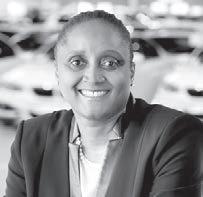
POSITIVE ROLE MODEL SOUTHERN AFRICA AWARD
PROVINCIAL
Liezel Holmes Gauteng
Colleen Carr Cape Town
Janine Govender KwaZulu-Natal
Mashudu Ndou Mpumalanga COUNTRY
Priscillah Ndadi Botswana
Ashleigh Chabvuta Namibia
Logamal Ramiah South Africa
Nachilala Nkombo Zambia
OVERALL WINNER
Buhle Hanise CA(SA) Head of business experience at BDO South Africa

This award celebrates C-suite executives who have acted as guiding lights within their organisations, providing direction, mentorship and unwavering support to emerging leaders. These individuals have not only sponsored rising talents, but also embodied inclusivity, ensuring that diverse voices are heard and elevated to leadership positions. Their efforts have illuminated the path to success for the next generation of leaders, fostering a culture of growth, empowerment and equity.
Edna Montse Winner
Dr Ntombi Mhangwani South Africa
Newton Jazire Botswana
Diana Johnson Western Cape
Mashudu Ndou Mpumalanga
Nkhonde Fumbeshi Zambia
This award honours leaders who have played a pivotal role in igniting the potential of emerging leaders within their organisations. These individuals have actively nurtured and advanced diverse talent, serving as catalysts for growth and change. By providing mentorship, sponsorship and opportunities for development, they have empowered future leaders to rise through the ranks, ensuring the leadership pipeline is rich with inclusive and innovative voices. Their commitment to fostering an environment where all employees can thrive has made a lasting impact on the organisation's leadership landscape.
Fatima Hayat Winner
Khethiwe Nkuna South Africa
Christopher SeagatengBotswana
Dr Shiksha Gallow Eastern Cape
Dr Ashlesha Singh KwaZulu-Natal
Priscillah Ndadi Finalist Botswana
Scott Senwelo Finalist Botswana
Shobana Maikoo Finalist South Africa
Gavin Mkhabela Finalist South Africa
Beacon And Catalyst category
Shaleenah Marie


This is only the second time in 12 years that this award has been granted to a recipient.
This award recognises visionary leaders who have broken new ground in fostering inclusivity within their organisations and beyond. These trailblazers have led by example, pioneering initiatives that elevate diverse voices and pave the way for under-represented groups. Their bold and innovative approaches have set new standards for inclusion, challenging the status quo and creating a more equitable and diverse landscape. Through their actions, they have not only sponsored and mentored emerging leaders, but also inspired systemic change, making a lasting impact on their organisations and industries.
Inclusive Leader –Trailblazer Trophy
Minister Peggy Serame, Botswana

Mashudu Ndou South Africa
Nkhonde Fumbeshi Zambia
Priscillah Ndadi Botswana

GENDER MAINSTREAMING AWARDS CHAMPION EAST AFRICA NMB Bank Plc
LISTED
Winner NMB Bank Plc
Finalist BAT Kenya
Finalist Absa Bank Kenya
NONLISTED
Winner Senaca East Africa Limited
Finalist AZA Finance
Finalist MAPA Enterprises
OVERALL WINNERNMB Bank Plc
NMB Bank Plc is committed to promoting gender parity and creating an inclusive culture that fosters diversity, recognising that such values are key to driving innovation and enhancing organisational performance.

For NMB, gender parity means achieving a balanced representation of men and women across the workforce while cultivating an environment that embraces diversity as a catalyst for growth.
The bank has introduced several initiatives to challenge the barriers preventing women from progressing. These include targeted recruitment efforts, exible and gender-sensitive work and leave policies, mentorship programmes and female leadership training, aimed at equipping women with the skills and experiences necessary to succeed and break through traditional limitations in the workplace.
NMB also understands that leadership is a continuous journey. Female leaders are encouraged to embrace change, collaborate and build strong networks across the organisation, leveraging relationships as a vital resource in their growth. The bank supports the concept of “Lean In” where female leaders can engage with mentors and sponsors to help navigate their leadership path.
Men are seen as key allies in promoting gender parity. By addressing unconscious bias and taking an active role in gender mainstreaming strategies, men contribute to building a more balanced and inclusive workforce. NMB believes bold actions in closing the gender gap will lead to more diverse leadership, better products, and services that cater to the ambitions of women and men. NMB is an inclusive banking sector that values the contributions of all individuals.
LISTED
Winner East Africa Breweries Limited
Finalist Absa Bank Kenya
Finalist NMB Bank Plc
NONLISTED
Winner Supermamas Ventures Limited
Finalist Essenspark Limited
Finalist Lady Askari
OVERALL WINNERSupermamas Ventures Limited






Founded with the mission to create a community for mothers, Supermamas Ventures provides resources, networking opportunities and educational programmes aimed at enhancing the business skills and personal growth of mothers.
It focuses on helping mothers balance their family responsibilities while pursuing entrepreneurial ambitions. Through a wide range of workshops, events and online resources, Supermamas equips mothers with the necessary tools to succeed in various business sectors. It covers topics, such as nancial literacy, marketing strategies, business management and personal branding, offering mothers the con dence and skills to run successful ventures.
The venture actively connects mothers with mentors and business leaders who can provide guidance and support on their entrepreneurial journeys.
Additionally, Supermamas partners with various organisations to provide mothers with funding and business growth opportunities, contributing to the economic empowerment of women in Kenya. By championing the potential of mothers in business, Supermamas Ventures is helping to rede ne what it means to be both a successful entrepreneur and a dedicated parent in Kenya.
Winner BAT Kenya
Finalist Standard Chartered Bank Uganda
Finalist Lady Askari
LISTED
Winner Bamburi Cement Plc
Finalist Absa Bank Kenya
Finalist Credit Bank Plc
Finalist NMB Bank Plc
Finalist Prudential Assurance Uganda Ltd
NONLISTED
Winner Senaca East Africa Limited
Finalist Nutravest
Finalist RWK & Associates
OVERALL WINNERBamburi Cement Plc

Bamburi Cement Plc is dedicated to driving economic empowerment within the industry and local communities through strategic programmes and partnerships. The company's commitment to diversity, equity and inclusion is evident through initiatives such as the "Women on Wheels" programme, which trains and recruits women as truck drivers, challenging gender biases in the transport industry. Additionally, its collaboration with the International Finance Corporation on the "Sourcing2Equal" programme aims to boost the participation of women-owned enterprises in its supply chain, offering procurement opportunities and capacity-building support.
Through its diverse initiatives, Bamburi Cement Plc not only contributes to economic empowerment, but also champions sustainable business practices that uplift communities while advancing industry standards.
Winner NMB Bank Plc
Finalist Ruby Organics Africa Limited
Winner East Africa Breweries Limited
Finalist AZA Finance
Finalist Kenya Mortgage Re nance Company
Finalist NMB Bank Plc
LISTED AND MULTINATIONAL
Inclusive Leader: East Africa
Risper Ohaga
Lillian Ngala
Betty Korir
Beatrice Kirubi
Kariuki Ngari
Elizabeth Wasunna-Ochwa
Risper Ohaga

Risper Ohaga
LISTED AND MULTINATIONAL
NONPROFIT
Jaine Mwai
Elizabeth Wasunna-Ochwa
Elizabeth Rossiello
Wanjiku Wanjohi
Fay Majid Elhassan
Ambassador Amina
Mohamed CBS, CAV
ENTREPRENEUR AND SELF-EMPLOYED
Favor Gakii
Christine Khasinah
Elizabeth Baruka Samba
Dr Regina King'ori
Positive Role Model: East Africa
Jaine Mwai

GENDER MAINSTREAMING
ECONOMIC EMPOWERMENT AWARD
Winner ImpactHER Foundation Ltd/Gte
Finalist Standard Chartered Bank Ghana Plc
Finalist Wema Bank Plc
Finalist Giddins Ghana Limited Company
EQUAL REPRESENTATION AND PARTICIPATION AWARD
Special MentionGiddins Ghana Limited Company
INVESTING IN YOUNG WOMEN AWARD
Winner Wema Bank
Finalist Illuminate Nigeria Development Network
Finalist Giddins Ghana Limited Company
Finalist Standard Chartered Bank Ghana PLC
Finalist Syldem Company Limited
MAINSTREAMING GENDER AND DISABILITY AWARD
Winner BAT West and Central Africa
Finalist Standard Chartered Bank Ghana PLC
Finalist Illuminate Nigeria Development Network
WOMEN EMPOWERMENT IN THE COMMUNITY AWARD
Winner Women Impacting Nigeria
Finalist Women in STEM Gambia
Finalist Standard Chartered bank Ghana PLC
WOMEN EMPOWERMENT IN THE WORKPLACE AWARD
Winner Transnational Corporation Plc
Finalist Giddins Ghana Limited Company
Finalist BAT West and Central Africa
INCLUSIVE LEADER AWARD
Finalist Christabel Chanda Mulenga-Ginsberg
Finalist Efe Ukala
Finalist Umaru Yakubu Kirawa
Finalist Otaosese Akhigbe

POSITIVE ROLE MODEL AWARD
GROUP 1
Finalist
Anikeade Funke - Treasure Akintoye
Finalist Martina Eve Brooks
Finalist Joyce Daniels
Finalist Omotola Adedapo
Finalist Dr. Owen Omogiafo
Finalist Nana Jukwa Someah-Kwaw
Finalist Theodora Addea Gyambrah
Winner Dr Loretta Oduware Ogboro-Okor
GROUP 2
Finalist
Dr Emefa Aku Ansah
Finalist Linda Ewoenam Donkor
Finalist Florence Ekong
Finalist Otaosese Akhigbe
Finalist Gwen Z Abiola-Oloke
Winner Oluwatoyin Aralepo

Please note: Winners to be announced at the end of November 2024.
POSITIVE ROLE MODEL FINALISTS UAE
Finalist
Dr Engr Suaad Al Shamsi
Finalist Farah Naz
Finalist Georgina Kelly
Finalist Hind Khlaifat
Finalist Joan Wambua
Finalist Mbali Makhathini
Finalist Mona Tajarbi
Finalist Sa ya Al Shehi
Finalist Sandi Saksena
INCLUSIVE AWARD FINALISTS UAE
Finalist
Finalist
Dr Ahmed Zaid Saeed Binhashah Al Shemeli
Mr Anthony Stabourlos
The WEP Awards in South Africa are linked to the Women’s Empowerment Principles (WEPs), an initiative by UN Women and the UN Global Compact. These principles guide businesses on promoting gender equality and empowering women across workplaces, marketplaces and communities. The awards recognise organisations that actively adopt and implement these principles, showcasing their commitment to gender equality in various areas, such as leadership, nondiscrimination, employee safety, professional development and community advocacy.
This category recognises business leaders of any age who have been instrumental in setting strong corporate commitments inclusive of progressive polices, regulations or practices that aim to promote gender equality in the workplace, marketplace and/or community. This may include company leaders taking specific roles and responsibilities in promoting gender equality within the company and making public commitments or delivering gender-sensitive messages to the public. This award is not intended only for C-level executives but may be granted to employees at director and management level, as well as emerging leaders promoting gender equality in corporate settings, and individual entrepreneurs and founders. This award may be granted to a leader of any age, but young leaders and enterprise founders below the age of 30 who display particularly innovative solutions or leadership qualities may be considered for additional special recognition.
Winner Lyn Mansour – KLM Empowered Human Solutions Specialists (Pty) Ltd
FinalistCaroline Njuguna – Becandsure Financial Services
This category recognises corporate champions who promote gender equality through community engagement and partnerships. This engagement may include integrating gender equality into their sustainability strategies, CSR or philanthropy programmes, and especially supporting and collaborating with NGOs, international organisations or other organisations committed to promoting gender equality within wider communities. Beyond community engagement, this category will also award actions to promote transformational action or systemic change through partnerships. This can include individual companies participating in any advocacy or multistakeholder platforms to promote gender equality.
WinnerSanofi South Africa
FinalistNedbank Limited
FinalistAngloGold Ashanti Limited
This category recognises commitment to transparency and reporting of gender data that goes beyond minimum requirements and seeks to measure, analyse and report on performance of their gender policies and practices across the value chain. The category will reward companies and organisations that have accountability frameworks in place and have set targets and consistently reported and taken steps to improve their performance on gender indicators (i.e. recruitment and retention and women in management). This category may also be awarded to companies conducting an audit and analysis of a particular gender-related issue, such as the gender pay gap, or companies committing to increase the number of gender indicators they publicly report on each year. In addition, this category may be highly relevant for industry associations and stock exchanges integrating more gender criteria into their sustainability and/or reporting criteria.
WinnerNedbank Limited
FinalistAspen Pharmacare Holdings Limited
FinalistCoronation Fund Managers
This award recognises achievements corporations have demonstrated in adopting relevant gender-inclusive measures in the workplace. This may include innovative approaches to equal recruitment, support to provide flexible work arrangements, addressing specific needs of female and male employees, transformational initiatives to support family responsibilities of female and male employees to address the unequal care burden, accelerative actions to guarantee the safety and wellbeing of female and male employees, accelerating progress towards equal pay, and promoting women’s career development and leadership. This can also include efforts towards creating broader diversity and inclusion within the workplace by addressing additional considerations such as disability, age, ethnic background, sexual orientation, gender identity and expression, among others.
WinnerAngloGold Ashanti
FinalistSano South Africa
FinalistKLM Empowered Human Solutions Specialists (Pty) Ltd
FinalistCoronation Fund Managers

ADVAITA NAIDOO Jack Hammer Global MD, Africa

ALISON BADENHORST Rand Merchant Bank Chief marketing officer

JO-ANN POHL Kearney Associate director
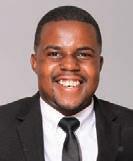
ANDREW TSURO Toastmasters Southern Africa Nonexecutive director

NAOMI WILLIAMS Livingston Leandy Incorporated Director

CARINA WESSELS Alexander Forbes Executive: Governance Legal and Compliance

DEIDRE KING Jacaranda FM MD
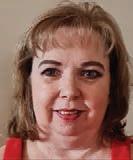
DR KAREN SMIT Vodacom Accessibility lead

SHELLEY WALTERS Inkwazi Kommunications Limited Strategic sales advisor

DHARSHNI PADAYACHEE
Rand Merchant Bank Transformation, Inclusion and Equality lead

DIONNE KERR Siyakha Consulting Group CEO

PERUSHA PILLAY-SHAIK
Bowman Gilfillan Director
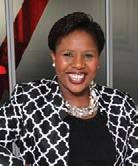
DR NTOMBI MHANGWANI Vodacom Business Executive head of marketing

ELMARIE BISSETT Nidaba Consulting Director


GAVIN FITZMAURICE Webber Wentzel Cape Town managing partner –Dispute Resolution Practice

HELENA CONRADIE Ten Four Partners Director

PATRICIA LUHANGA Electoral Commission of Zambia Corporate Affairs manager

PROFESSOR PARMI NATESAN Institute of Directors South Africa CEO

NOMAXABISO NKULA Vodacom Business Africa Lead specialist for Revenue Assurance
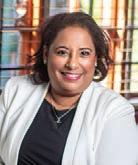
JOY-MARIE LAWRENCE Boardvisory CEO and founder

LINDA KACHINGWE SISYA FNB and RMB Africa head of marketing and communication

MALCOLM LARSEN Business Engage Company secretary
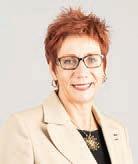
MARTIE JANSE VAN RENSBURG Board member on various boards

TSHEPO SEROKOLO Khenn Institute MD

MICHAEL JUDIN Judin Combrink Senior partner

MICHAEL PRYKE EQ Impact CEO

ENRICO BALDASSARRI Accelerated Value Generation AVC Director

ROSE MAMABOLO WBD Investment CFO

SHEPHERD SHONHIWA Nedbank Zimbabwe LImited Chairman
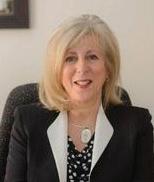
TERYL SCHROENN Business consultant

SUBASHNEE MOODLEY Livingston Leandy Incorporated MD

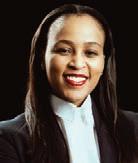

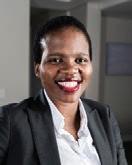
WILLIAM SURMON Botswana Insurance Company Chief sales and marketing officer
REABETSWE MOTSHEGARE Scatec ASA Human resources director
ISABELLA MAKUTA Mapletree Africa CEO
REFILOE NKADIMENG African Rainbow Capital CFO

DR MICHÉLLE BOOYSEN Petanque NXT Co-CEO

SHAMEELA SOOBRAMONEY NBI CEE

DELIWE MANYALA Botswana Insurance Company Chief human capital officer

REBECCA HARVIE Citadel Investment Services Partner
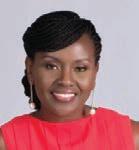
ALICE OYARO Independent consultant

ANNETTE KIMITEI Senaca East Africa MD

CHIMWEMWE NGWENYA Standard Chartered Bank Director: Transaction Banking Sales (Kenya and Zambia)

EVA KOMBA Gender, governance and development specialist

LENIN OYUGA Safaricom – Oracle Global director: key account
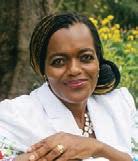
TENDAI MURAHWA Diversity Dividend Africa Ltd Managing consultant

MARGARET KIMANI Kabute Global Consulting Group MD

DR KHETSIWE DLAMINI Triple C Advisory Founder and executive director
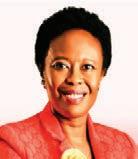


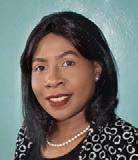
SUSAN MAINGI Coca-Cola Beverages Africa – Kenya Country lead Regulatory and Stakeholder: Engagement
ROSENARY OKELLO-ORLALE Strathmore University Business School Director – Africa Media Hub
SIENNA DUTKOWSKI Lady Askari Director of community and social affiars
SYLVIA MUKASA GlobalX Investments Ltd/ Innovation Lab Founder and CEO

DR ANNELISE BOOYSEN Your Global Village Founder-architect

NANDI MANENTSA SA Home Loans Director HR and L&D
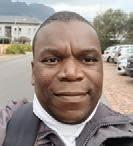
TSHILILO FARISANI Independent consultant

FATHIMA BECKMANN i-Culture Founder

MONICA KIMEU Women in Safety Excellence Secretary general

EVELYN NGATIA TechaWatt Founder and CEO

KANANA MAKENA Link 4 Change Head of partnerships and fundraising

ROY KIBUI Executive Search EMEA director

WAMBUI MBESA RELATIONAL FS CEO

ROMANA RAJPUT Interswitch Kenya Country GM
Business Engage has established the Gender Mainstreaming Awards to encourage the private sector’s involvement in advancing meaningful gender representation in business. These awards offer various categories to accommodate companies at different stages of gender diversity. The goal is to support companies at the start of their journey and encourage continued progress. All applications are online, covering both South African and international programmes. EN T ER


ABIMBOLA AGBEJULE Wema Bank Plc Head: Corporate Sustainability

CECILIA AKINTOMIDE Independent nonexecutive director
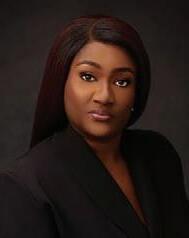
CHINWE EGWIM Coronation Merchant Bank Chief economist

GLORY EDOZIEN Inspired by Glory Academy Lead coach and consultant


OLAYINKA SUBAIR Pfizer SSA Country manager


PATRICIA SAMPSON Ministry of Sanitation and Water Resources – Ghana Director – General Administration

DR REJOICE WODOMDEDZI FOLI G-Wealth Consults CEO
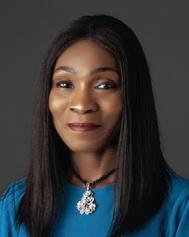
HELENE WEESIE Diageo MD
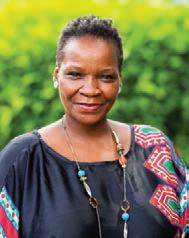
TOYIN DANIA MEST Africa Project manager

ADAM ASHCROFT The Advantage Coach, UAE CEO

DUA AL TOOBI Dubai One TV TV presenter
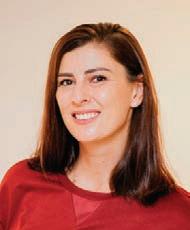
LYRITIA VAN DER LINDE South African Business Council, UAE CEO

MADHUSMITA NAYAK United Nations Ambassador for Peace in Special ECOSOC

NADA EL GAZZAR Upskill Advisory and coaching Founder and CEO

FOR THE FINAL RESULTS FOR THE PREVIOUS GMA s, CLICK HERE.







For 30 years, WIPHOLD has been at the forefront of driving economic and social transformation in South Africa, breaking barriers and creating pathways for black women to lead in the economy
Women Investment Portfolio
Holdings (WIPHOLD) is a pioneering investment holding company; its commitment to sustainable value creation goes beyond nancial returns – it is rooted in the empowerment of women and the upliftment of communities countrywide.
Founded and led by black African women with deep expertise and lived experience, WIPHOLD understands that real transformation
occurs when women are given opportunities to lead and fully participate in the economy. With an investment portfolio spanning sectors such as infrastructure, agriculture, nancial services, mining and energy and education, WIPHOLD plays a strategic role in shaping South Africa’s economic future while unlocking opportunities for black women to thrive.
WIPHOLD’s investment approach is about
more than enhancing shareholder value; it’s about creating long-term impact. The company’s mission is clear: to in uence the economic landscape in ways that bene t women, to open doors for talented black women in business, and to nd innovative ways to uplift rural and peri-urban communities economically. This commitment to social impact is deeply embedded in the company’s DNA, making WIPHOLD a driving force for inclusive economic development.

“We have always engaged closely with the communities who have no voice in mainstream economies. We believe it is our responsibility to ensure their voices are prominent in our boardrooms.” – Gloria Serobe, founder and group CEO
Key sectors of WIPHOLD’s diverse portfolio include:
• Infrastructure
• Agriculture
• Financial services
• Mining and energy
Through an investment philosophy focused on building and enhancing shareholder value, WIPHOLD seeks to:
• In uence the economic landscape to unlock opportunities for women.
• Create the pathways for talented black women to achieve success in the business world.
• Promote innovative ways to uplift rural and peri-urban communities economically.
Starting with seed capital of just R500 000, WIPHOLD has grown into
a business valued at over R3-billion. But its success is not merely measured in nancial terms. WIPHOLD takes pride in the social impact it has generated, particularly through its two key entities: the WIPHOLD Investment Trust and WIPHOLD NGO Trust. Together, these have empowered over 200 000 bene ciaries, creating a ripple effect of economic and social upliftment.
For WIPHOLD, empowerment goes far beyond traditional corporate social responsibility – it is a fundamental part of the company’s values, vision and strategy. Social impact guides both the company’s investment decisions and the structure of the WIPHOLD Group itself.
WIPHOLD’s strategic objectives continue to guide its transformative mission.
• Creating and enhancing shareholder value.
• Building sustainable, resilient business operations.
• In uencing the economic landscape to unlock opportunities for women.
• Providing platforms for talented black women to rise to senior leadership.
• Empowering rural and peri-urban communities through innovative business solutions.
WIPHOLD’s pioneering approach has rede ned what it means to invest with purpose, proving that sustainable value creation and social impact can go hand-in-hand. As the company continues its journey, it remains unwavering in its mission to empower women and shape a more inclusive South Africa.
“Over
the next decade, WIPHOLD will expand its footprint and deepen its impact in the communities where our investments make a difference, ensuring we meaningfully advance our transformation objectives.”
– Jannie Stockenström, chief investment officer
2 Trusts
1 200 & 18 000 Direct & indirect women bene ciiaries
19 200 Black women shareholders
R281 MILLION + Has owed to these organisations from WIPHOLD’s investment activities



Since its founding 30 years ago, WIPHOLD has played a pivotal role in reshaping the South African investment landscape. WIPHOLD has achieved signi cant milestones that re ect its commitment to social impact and nancial sustainability. From landmark investments to ground-breaking initiatives, these are the key moments that have shaped WIPHOLD’s legacy of transformation and upliftment.
WIPHOLD was formally established in 1994, realising a dream to advocate for a new way to empower black women in South Africa and open opportunities for inclusive participation in the country’s mainstream economy.
Founders Louisa Mojela, Gloria Serobe, Nomhle Canca and Wendy Luhabe embarked on a national roadshow to share their vision and raise the seed capital needed to launch. In its early years, WIPHOLD not only laid the foundation for a sustainable and resilient investment rm, but was also a signi cant role player in developing the framework for South Africa’s emerging black economic empowerment policy.
WIPHOLD’s rst investment was made in 1995 – a R750 000 share in JSE-listed investment company Baobab (a company that eventually led to the formation of African Bank Investments). By the time WIPHOLD exited the investment in Baobab, the value had grown to R200-million.
“There is no decision I make where I don’t ask – what does it do for the community?” – Gloria Serobe, founder and group CEO
1994
Women Investment Portfolio Holdings (WIPHOLD) is established.
Wiphold makes its rst investment – a R750 000 share in JSE-listed investment company Baobab.
By 1996, WIPHOLD had a strategically diverse investment portfolio that consisted of Bidvest, Radio Highveld (now 94.7), clothing chain store Smart Center, FMCG beauty product manufacturer Carsons, and mobile communications provider, Ericsson.
In 1997, WIPHOLD invested in a business proposition with the strategic intent of
WIPHOLD became the rst women’s empowerment group to list on the Johannesburg Stock Exchange (JSE). Wipcapital is created and WIPHOLD acquires a 49 per cent stake in Legae Securities.
WIPHOLD delists from the JSE to reclaim majority ownership of black women. WIPHOLD NGO Trust is established.
developing a strong empowerment pillar. The prospectus attracted 18 000 women shareholders and bene ciaries and raised R25-million in the process. The shares were housed in the WIPHOLD Investment Trust, the company’s empowerment vehicle. Only one year later, this investment pool had increased to R100-million. In 2023, the trust’s shares were bought back by WIPHOLD, enabling the trust’s bene ciaries to realise their investment. Trust bene ciaries have received over R191-million in dividends since inception.
In 1999, WIPHOLD became the rst women’s empowerment group to list on the Johannesburg Stock Exchange. In the same year, it created Wipcapital and acquired a 49 per cent stake in Legae Securities (South Africa’s rst black stockbroker and later the rst black hedge fund manager).
The decade that followed was dedicated to collaboratively cultivating value and growth. In 2002, WIPHOLD expanded its footprint in the nancial sector and acquired a 40 per cent stake in Futuregrowth Asset Management, South Africa’s largest infrastructure bond fund manager at the time. In 2005, this stake was increased to 73 per cent, making Futuregrowth the country’s largest black-controlled asset manager. This business grew to increase its assets under management signi cantly and was sold to Old Mutual in 2008.
In 2003, WIPHOLD delisted from the JSE to reclaim majority ownership of black women – a move that signalled WIPHOLD’s continued commitment to the empowerment of black women as a core business imperative as its ownership had been diluted due to the public listing. This led to Old Mutual acquiring a 32.5 per cent stake in WIPHOLD.
WIPHOLD continues to be a powerful influencer of the economic landscape for the benefit of women, providing leadership opportunities to talented young black female professionals and finding creative ways to do business in impoverished rural and peri-urban areas that both empowers communities and adds value to WIPHOLD shareholders.
The same year, the WIPHOLD NGO Trust was established to empower and support NGOs whose primary focus is the development of black women and/or children. This initiative expands WIPHOLD’s social impact to more than 200 000 bene ciaries across South Africa.
The following years (2004 and 2005) saw the acquisition of a 25.1 per cent stake in the local operations of global prepaid electricity and metering group, Landis+Gyr, and the conclusion of empowerment deals with Old Mutual, Nedbank and Mutual & Federal.
During this time, WIPHOLD established two unique and powerful initiatives: 1) a community engagement strategy called Project Imbizo that aimed to build social capital; and 2) an economic activation strategy that fostered nancial inclusion, sustainable entrepreneurship and self-reliance. These initiatives were a byproduct of WIPHOLD’s partnership with the Old Mutual Group, which viewed WIPHOLD’s NGO Trust as a strategic instrument to broaden its reach.
In 2006, WIPHOLD acquired a 3.3 per cent stake in Hans Merensky Group, one of South Africa’s largest lumber product manufacturers and sub-tropical fruit growers. Through this deal, the group was exposed to Hans
Merensky Timber and Westfalia Fruit and entered into the agriculture value chain.
Another signi cant investment in this period was a 20 per cent stake (R1.9-billion) in Sasol Mining through the newly established WIP Coal – a joint venture between WIPHOLD and the Women Mining Investment Trust.
In 2010, WIPHOLD entered into a joint venture with Continental Cement and Chinese partner Jidong to establish a R1.65-billion cement plant in Limpopo – the culmination of a long-standing partnership and shared vision to contribute to the construction industry.
In 2012, WIPHOLD, as part of a consortium, invested in Imvelo Concession Company, a public-private partnership project for the building and maintenance of the Department of Environmental Affairs’ of ces.
In 2014, WIPHOLD celebrated its 20 th anniversary and the realisation of its vision to become South Africa’s largest black-owned investment company dedicated to empowering black women.
Over the next few years, WIPHOLD bought shares in Bluespec, Sas n Holdings and AFRGRI Grain Silo Company.
By 2020, the company had established a robust and balanced investment portfolio, focused on the infrastructure, agriculture and nancial services sectors – where its focus remains today.

2004/05
WIPHOLD concludes empowerment deals with Old Mutual, Nedbank and Mutual & Federal.
2006
WIPHOLD acquires a 20 per cent stake in Sasol Mining through the newly established WIP Coal.
2010–12
WIPHOLD invests in joint ventures with various organisations.
2014
WIPHOLD celebrates its 20 th anniversary.

For



















Kgalagadi Holdings is driving sustainable growth in logistics and procurement for and by women, writes HAPPY ZONDI
Founded in 2013, Kgalagadi Holdings is a 100 per cent black-female-owned company that has swiftly carved a niche in the highly competitive landscape of procurement, logistics and supply chain management. With a robust management team boasting over 50 years of combined experience, the company is not just another service provider, but also a relationship builder, delivering tailored solutions to clients across various sectors, including travel, transportation and procurement.
Kgalagadi director Cheryl James says: “Our company is built on the principle of partnership and trust. We aim to be more than just a service provider – we want to be the go-to partner for businesses looking to expand their operations in South Africa.”
Kgalagadi specialises in managing local and international travel, transportation, distribution and procurement of general goods and mining equipment. It also serves international businesses looking for representation in South Africa, acting as the importer of record to ease market entry.
Additionally, the company manages travel bookings for South African companies and operates a eet of small vehicles, offering national cargo transport services.
“Logistics is a tough industry, especially when you factor in the unpredictability of fuel prices and economic shifts. But our team is resilient. We’ve learned to adapt quickly, ensuring that we continue to deliver value even in challenging times,” says James.
Operating in a male-dominated industry, Kgalagadi faces several logistical hurdles, such as uctuating fuel prices, economic instability and the lack of contractual work. Funding for large-scale projects is also a recurring challenge.
Despite these obstacles, Kgalagadi is breaking barriers, leveraging its industry

THE COMPANY PRIORITISES WOMEN’S PARTICIPATION AND STRONG BROAD-BASED BLACK ECONOMIC EMPOWERMENT LEVELS IN ITS SUPPLIER SELECTION.
expertise to deliver consistent value.
Sustainability remains a key focus, with the company adopting paperless operations, solar-friendly facilities and employee training programmes in environmental, social and governance practices.
“We believe in creating a shared value system with our suppliers. It’s not just about doing business; it’s about building lasting relationships that align with our values, especially when it comes to empowering women and promoting diversity,” adds James. Kgalagadi’s approach to maintaining supplier relationships is rooted in its commitment to building strong partnerships.
The company prioritises women’s participation and strong broad-based black economic empowerment levels in its supplier selection, ensuring all partners align with its core values. Regular interactions and stringent vetting processes for clients further solidify these relationships.
Looking ahead, James is optimistic about the role women will play in shaping the future of Africa’s supply chain industry. “Women are key to driving the next wave of growth in this sector. As we expand into the Southern African Development Community (SADC) regions, there’s a tremendous opportunity for women to lead and innovate,” she concludes. With the growing emphasis on expanding operations into the SADC regions, Kgalagadi is poised to capitalise on these opportunities, fostering inclusive growth and contributing to the broader economic landscape of South Africa and beyond.

go
Kgalagadi Holdings’ website

more information: +27 10 500 1558 / +27 65 806 9867 sales@kgdholdings.co.za www.kgdholdings.co.za
Supplied
NTOMBI NONG , business development executive at Bidvest International Logistics, shares that forward-thinking leadership is needed to help women excel in the supply chain sector


Success in the supply chain industry requires women to step into their roles with the same level of expertise and capability as their male counterparts. This approach ensures they are taken seriously and can thrive in their careers. This principle extends beyond gender. It’s essential when addressing inclusion that opportunities are provided to those who have the necessary knowledge and skill set to excel. Success should not depend on special treatment but on merit and capability. The importance of forward-thinking leadership in promoting the inclusion of women cannot be underestimated.
Leaders with a vision for the future prioritise sustainability and understand the value of gender diversity. Diversity, whether in terms of gender, culture or nationality, enriches the work environment, broadens perspectives and enhances the quality of services delivered.
A supportive environment created by male counterparts to allow women to bring their unique perspectives and contributions to a business is vital. At the same time, continual self-development is equally important to remain relevant and contribute meaningfully. It’s vital to share
BY CREATING A LEARNING-DRIVEN CULTURE, WOMEN CAN FOSTER OPPORTUNITIES FOR FEMALE EMPLOYEES TO UPSKILL.
ideas, learn from others and stay current with industry trends. By creating a learning-driven culture, women can foster opportunities for female employees to upskill. Development must begin when girls are at school. Females often outperform males in the academic environment, particularly in elds such as science and technology, which are critical for the future of logistics. Girls should be encouraged to pursue these areas to increase their representation. As they transition from school to the workforce, programmes should be put in place to support their dual roles of building families and careers. Companies wanting to promote inclusion should invest in development at the grassroots level through academies, courses, coaching and on-the-job training. Employment opportunities must be made available for successful candidates.
For women to continue succeeding in the supply chain sector they must actively create spaces for other women. Whether backing their initiatives or attending events focused on empowering women, especially younger women entering the market, the power of peer support will elevate women.
African Women in Supply Chain (AWISCA) provides an excellent platform for women to grow and collaborate in the supply chain industry. Businesses must partner with organisations such as AWISCA by sponsoring training and development for small state-owned enterprises. This kind of networking and collaboration among women is crucial for growth.
Women must be proactive in seeking change, pursuing the right courses and contributing solutions to the industry’s challenges. Their participation in policy discussions and their efforts to address sector-speci c and national needs are vital.
Balancing motherhood and a career is challenging and younger women should plan when to focus on their families, whether earlier or later in their careers, understanding that it requires commitment. This raises the importance of integration platforms to help women re-enter the workforce seamlessly after such breaks.
Women must not be afraid to bring their authentic selves into the workplace and to support each other in doing the same.





SHATTERING THE GLASS CEILING: A LOOK AT WOMEN IN SUPPLY CHAIN
The logistics and supply chain industry is a high-stakes arena, essential for moving goods ef ciently. While often overlooked, this complex ecosystem thrives on a dynamic workforce. Yet, within this eld, women remain under-represented. Statistics paint a harsh reality: globally, only 29.2% of science, technology, engineering and maths (STEM) workers are women. The number drops further when considering leadership positions. In South Africa, just 13% of STEM graduates are women, re ecting a persistent gender gap that demands immediate attention.
LEADING THE CHARGE FOR CHANGE


THE POWER OF A DIVERSE WORKFORCE







Loop, a South African delivery management platform, is revolutionising the delivery landscape. Here, a different story unfolds: women are not only present, but also thriving and playing crucial roles in the company’s success. Kimberley Taylor, Loop’s founder and CEO, embodies this spirit of change. Inspired by leading female tech entrepreneurs, Kimberley’s vision extends beyond individual success. She aims to dismantle the barriers that have traditionally excluded women from the tech industry, fostering a culture of inclusivity and opportunity.

















Loop prioritises diversity not just for representation, but because it recognises the true power in diversity. Women in tech and supply chain bring a unique blend of technical expertise and interpersonal skills. Their ability to listen attentively to clients’ needs and translate them into practical solutions is invaluable. This strong emphasis on empathy and communication fosters a collaborative work environment and drives innovation. By understanding the nuances of customer requirements, women play a pivotal role in building lasting relationships and delivering exceptional value.














A study by womenintech.co.uk highlights a concerning trend: 56% of women leave the tech sector within 10–20 years of their careers. Loop actively combats this by creating an environment where women feel valued and empowered to ourish. This translates into tangible bene ts: since 2021, Loop’s workforce has doubled.












Loop is committed to fostering a supportive and inclusive workplace for both women and men. Some initiatives include exible work arrangements that empower
employees to balance their personal and professional lives, comprehensive mentorship programmes that provide guidance and support for career growth and tailored leadership development workshops designed to equip the team with the skills to excel in their roles.
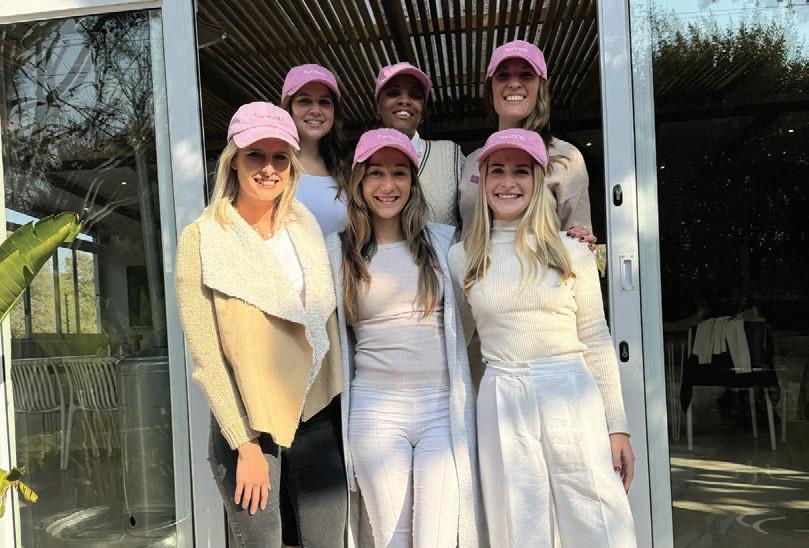

Let’s meet the remarkable women shaping Loop:
• Kimberley Taylor, founder and CEO: known for her “dare to be exceptional” attitude, Kim inspires many with her authenticity, vision and fail-forward approach.
• Nadine Jack, head of product and engineering: Nadine breaks barriers with intellect, grace and guidance, transforming challenges into successes.
• Keri Stewart, head of client engagement: Keri inspires excellence and empowers those around her, turning connections into lasting relationships.


• Shervon van Ginkel, product specialist: lled with compassion, Shev turns ideas into impactful realities with unwavering determination.
• Naledi Matutoane, software engineer: Naledi is rede ning boundaries and paving the way for others with incredible boldness and enthusiasm,
• Deandra Dalhuijsen, marketing manager: known for her kindness, Dee tackles every challenge with innovation, creativity and precision.
Loop’s success is a collective effort where women’s talents and perspectives contribute significantly to the company’s growth and innovation.
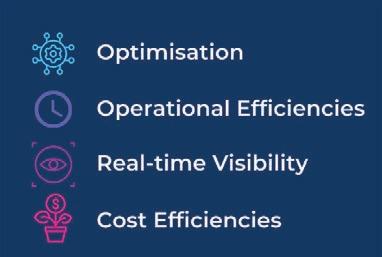

Loop’s platform is designed to transform the way businesses manage their delivery operations. By harnessing the power of technology, it offers a suite of tools that drive ef ciency, reduce costs and enhance customer satisfaction.
The platform delivers:
• Impressive efficiency gains: experience up to a 30% increase in delivery volume while saving planners an average of ve hours per week.
• Signifi cant cost reductions: plan and optimise routes to cut kilometres driven by 20% and reduce operational expenses.
• Improved customer satisfaction: bene t from a 50% reduction in customer interaction time and a 10% decrease in call centre queries.
• Scalability and growth: double the number of clients served while maintaining operational excellence.
• Real-time visibility and control: gain insights into your delivery operations with real-time data and analytics.



Loop provides a range of bene ts including optimisation, operational ef ciencies, cost savings, intelligence and actionable insights.
Kimberley emphasises the crucial role of STEM education in narrowing the gender gap. Early exposure to maths and science, coupled with strong female role models, can spark a lifelong passion for these elds. Parents, educators and tech companies alike can contribute to the change. By working together, we can create a future where the tech industry thrives on the collective talent and ingenuity of women, driving progress and innovation for generations to come.
Loop is proud to stand as a champion for women in supply chain, paving the way for a more inclusive and dynamic future for the industry. Together, let’s deliver on the promise of equality and empower the women who are shaping tomorrow’s world.













For more information:
+27 87 147 4100 info@loop.co.za www.loop.co.za

From artificial intelligence-powered forecasting to blockchain-secured transactions, women leaders are harnessing cutting-edge technologies to revolutionise supply chains. By
Picture a world where supply chains anticipate disruptions before they occur, where logistics networks adapt in real-time to changing conditions, and where arti cial intelligence (AI) transforms raw data into actionable insights. This isn’t science ction – it’s the rapidly evolving reality of supply chain management, driven by emerging technologies and spearheaded by visionary women leaders.

“The global supply chain industry is facing unprecedented challenges, from pandemic disruptions to geopolitical tensions,” says Ria Pinto, general manager and technology leader at IBM South Africa.
“However, emerging technologies, such as AI and hybrid cloud, offer a beacon of hope. Generative AI, in particular, has the potential to revolutionise the sector, automating mundane
BRENDON PETERSEN
Women hold only 23 per cent of tech employment positions in South Africa or 56 000 out of 236 000 ICT roles.
Source: Women In Tech ZA
tasks and empowering professionals to focus on strategic, predictive decision-making.”
Kimberley Taylor, CEO at Loop, underscores the transformative potential of these technologies. “These emerging technologies will shift supply chain management by opening access to previously underserved markets, especially in South Africa,” Taylor explains. “Currently, we’re only reaching a fraction of the potential market for deliveries in South Africa. To tap into the remaining market and manage the increased consumer volume, we must adopt various technologies.”
Pinto highlights the growing adoption of AI across industries, including supply chain management. “Chief supply chain of cers recognise its potential to enhance
“GENERATIVE AI, IN PARTICULAR, HAS THE POTENTIAL TO REVOLUTIONISE THE SECTOR, AUTOMATING MUNDANE TASKS AND EMPOWERING PROFESSIONALS TO FOCUS ON STRATEGIC, PREDICTIVE DECISION-MAKING.” – RIA PINTO
productivity, improve service levels and drive pro tability,” she notes. “From task automation in human resources functions to leveraging AI for end-to-end decision support in core supply chain functions, the possibilities are immense.”
Taylor provides concrete examples of AI’s impact: “Tech in supply chain can enhance ef ciency by automating manual tasks, saving people within logistics a lot of time – correcting address issues is one example. Tech within the supply chain can also increase accuracy by taking away human error, speci cally in the context of sorting parcels to the correct route and driver.”
The unique perspectives and leadership styles of women are contributing signi cantly to innovation in the sector. “Women’s perspectives and leadership styles bring a unique contribution to innovation within supply chain and technology,” Taylor explains. “The Loop group of women bring a diverse perspective within problem-solving by challenging conventional thinking and offering fresh insights.”
This problem-solving approach, combined with an emphasis on empathy and collaboration, is fostering a culture of innovation. Taylor re ects on the journey of women at Loop: “None of the women at Loop pursued a career speci cally in supply chain or logistics. By the nature of this space, many problems need to be solved and we are a group of women who love solving problems.”
Implementing these technologies requires careful strategy. Taylor emphasises simplicity: “We like to focus on simplicity – the world is complex enough. So, we don’t look at technology because it is trending, we look at it because it makes sense and makes the complex simple.”
Pinto shares IBM’s success in implementing AI: “We’ve witnessed rst-hand how AI can enhance transparency, security and ef ciency. By integrating conversational AI, we’ve achieved a real-time, single view of truth, enabling faster, fact-based actions and empowering our supply chain professionals to focus on complex problem resolution and continuous improvement.”
Digital transformation comes with challenges. Taylor acknowledges resistance to change as a signi cant barrier, particularly in South Africa. To overcome this, Loop prioritises “transparent communication and suf cient training to ensure adoption”.
Looking ahead, both leaders see continued innovation. Taylor anticipates that “AI and machine learning will enhance demand forecasting, inventory management and route optimisation, leading to more ef cient operations”. She also predicts a greater focus on sustainability, with companies adopting green logistics practices to reduce their carbon footprint.
Pinto concludes with a powerful vision: “The future of supply chain management is intrinsically linked with the adoption of emerging technologies. Generative AI, in particular, is poised to rede ne the sector, making supply chains more resilient, ef cient and customer-centric.”
As women continue to lead the charge in digital transformation, the supply chain and logistics industry is set for a future of unprecedented innovation and ef ciency. By embracing emerging technologies
and fostering a culture of diversity and collaboration, the sector is not just adapting to change – it’s driving it.
The impact of these innovations extends beyond operational ef ciencies. Taylor emphasises the potential for technology to promote sustainability: “Technology, such as route optimisation and route planning within delivery management software, can promote sustainability. With route optimisation and route planning, logistics companies will be able to decrease kilometres travelled and reduce the environmental impact of their delivery eet.”
This combination of operational excellence and environmental consciousness represents the future of supply chain management. As women leaders continue to push the boundaries of what’s possible with emerging technologies, they’re not just transforming their industry; they’re shaping a more ef cient, responsive and sustainable world.
“TECH IN SUPPLY CHAIN CAN ENHANCE EFFICIENCY BY AUTOMATING MANUAL TASKS, SAVING PEOPLE WITHIN LOGISTICS A LOT OF TIME.” – KIMBERLEY TAYLOR
With technology adoption expected to play a primary role in business transformation in the next five years, employers are increasingly looking for workers with technological literacy and engineering skills.
In this context, the share of artificial intelligence (AI) talent is evolving – albeit with different gender concentrations. New LinkedIn data offers novel insights into the gendered makeup of AI talent with a focus on the subset of workers with AI engineering skills.
These skills, used to develop and implement AI systems, are contributing to the development of innovative applications across a range of issues – from comprehensive healthcare analytics to predictive infrastructure maintenance.
For AI engineering, the concentration of female talent has more than doubled since 2016, from 0.09 to 0.2 per cent of LinkedIn’s female membership.
Male AI talent in 2016 was already tracking higher than women’s and has doubled since then (from 0.18 to 0.41 per cent) but has not outpaced the rate of growth for women’s talent.
The share of women with AI engineering skills has increased overall since 2016.
Yet, female AI engineering talent as a share of the overall industry workforce has a smaller industry presence than male talent in 2023 – and the differences are most pronounced in education and technology, information and media.
However, the sectors with the most significant increases in female concentration over time are technology, information and media, followed by professional services and financial services.
Gender representation within AI engineering also shows a promising trend. While men and women’s concentration of AI talent has been climbing, over the last four years the share of male AI talent has decreased with a corresponding increase in the share of women.
Although men still have substantially higher representation of AI talent, the increasing share of women is a positive signal for improving gender parity. At the industry level, gender parity in AI industry representation has increased gradually in education, professional services,

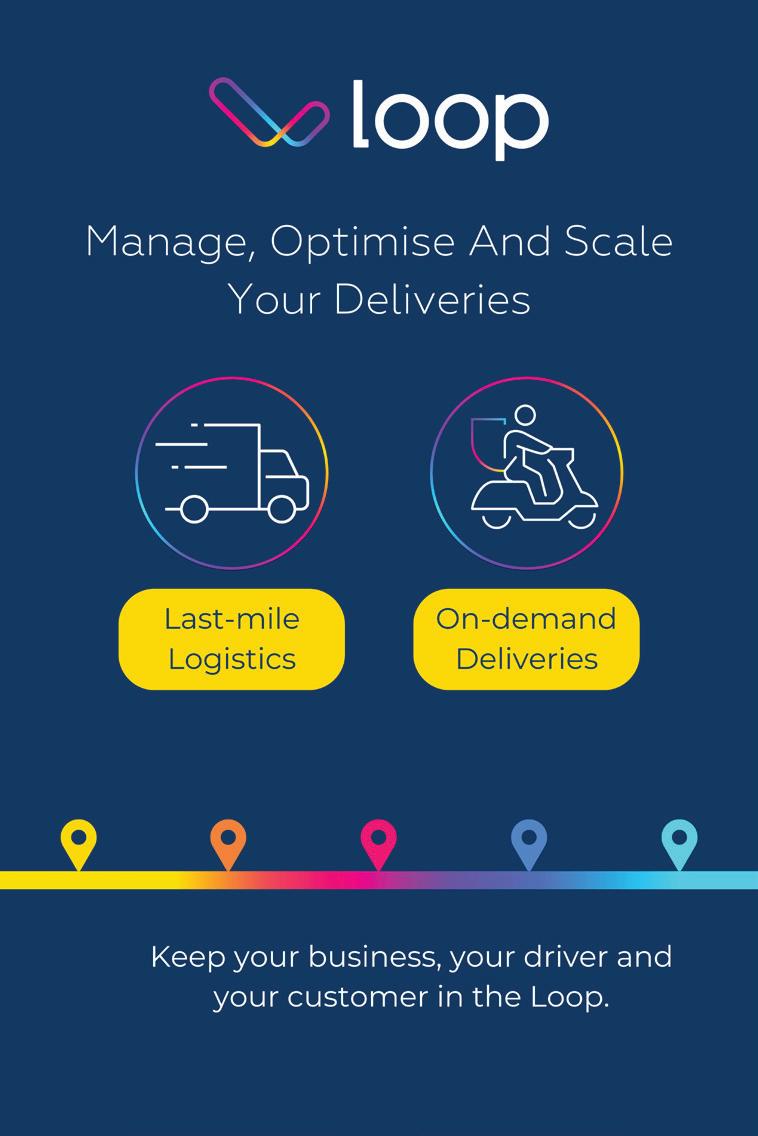
manufacturing and technology, information and media. Only in financial services has gender parity in AI engineering declined since 2016.
Source: Global Gender Gap Report 2024
Global Gender Gap Report 2024

Highlighting the role of women in promoting compliance, international standards and best practice. By
MWANGI GITHAHU
President Cyril Ramaphosa’s signing of the long-anticipated Procurement Bill into law in July this year marked a signi cant milestone for the South African supply chain industry.
The law mandates that a signi cant portion of government procurement contracts be awarded to historically disadvantaged individuals, such as women, and small, medium and micro enterprises (SMMEs).
As the global transport and logistics industry evolves, compliance with local and international regulations has never been more critical. ISO certi cations, including ISO 9001 (Quality), ISO 14001 (Environmental), ISO 45001 (Health & Safety), among others, are key benchmarks in the transport sector.
These certi cations ensure that organisations meet global best practices, leading to improved safety, ef ciency and holistic risk management.
JC Auditors, a leader in ISO certi cation and related compliance services, emphasises the need for organisations to align with internationally accepted standards.
JC Auditors’ managing director, Oliver Naidoo, says: “ISO standards apply universally across the industry and while there

are no speci c ISO requirements that pertain exclusively to women, best practices in the industry increasingly acknowledge the value of incorporating gender perspectives into compliance strategies.”
Naidoo points to ISO 53800, which provides guidelines for organisations to promote and implement gender equality and women’s empowerment. He says women are under-represented in the transport sector, particularly in leadership roles. “However, their participation is crucial for a wellrounded, inclusive approach to compliance and risk management. Encouraging the upskilling of women in compliance-related roles not only contributes to gender equality, but also enhances the overall effectiveness of a company’s compliance efforts.”
JC Auditors advocates for the inclusion of women in ISO training and certi cation programmes, which equips them with the knowledge and skills to lead in this critical area. These standards are not just about meeting legal requirements; they are about building resilient, safe and sustainable operations that can adapt to a rapidly changing environment.
Naidoo says that by fostering an inclusive environment, the supply chain industry can bene t from a wider range of ideas and solutions, leading to more innovative and resilient operations. As such, Naidoo added there is an absolute need to have more women at all levels of the supply chain sector.
“The supply chain sector has traditionally been male-dominated, but the need for diversity is increasingly recognised. Having more women at all levels is crucial not only for gender equality, but also for the enrichment of the industry,” he explains. “Women bring unique perspectives, problem-solving approaches and leadership styles that are vital for addressing the complex challenges faced by the sector today.”
Naidoo adds that, for instance, women approach challenges with a more structured and collaborative mindset, which can lead to more robust and well-rounded decisions.
“In leadership, this translates to more empathetic and holistic management, fostering environments where all employees feel valued and motivated.”
He says gender diversity is not just a social responsibility, but also a strategic advantage. “Our goal is to support the development of women in compliance roles, ensuring that they have the tools and opportunities to excel and lead.”
Naidoo emphasises that as the supply chain sector becomes more globalised, women who are trained and certi ed in these areas enhance their own professional development and also contribute to the overall compliance and ef ciency of their organisations.
For the Commercial Transport Academy (CTA), upskilling women is a strategic imperative. “Our organisation offers an international diploma for women wishing to develop their skills in the supply chain environment,” says CTA chief executive Nicci Scott Anderson.

Anderson says these programmes offer specialised training in various areas and expose individuals to ISO certi cations, environmental regulations and cybersecurity, equipping women to thrive in traditionally male-dominated elds.
“We are proud to be at the forefront of enhancing skills, knowledge-sharing and providing access to world-class mentors to support women in what I believe is going to be one of the most exciting industries to be involved in.”
“HAVING MORE WOMEN AT ALL LEVELS IS CRUCIAL NOT ONLY FOR GENDER EQUALITY, BUT ALSO FOR THE ENRICHMENT OF THE INDUSTRY.” – OLIVER NAIDOO


Aimed at breaking down barriers and equipping young women with tools for success, The Courier Incubator, powered by IVECO SOUTH AFRICA , is a catalyst for change in the industry.
IVECO South Africa and the Commercial Transport Academy has launched an empowering new initiative, the Courier Incubator, designed speci cally for young women to drive diversity in the courier and logistics industries. This initiative is part of IVECO South Africa’s commitment to promoting gender equality and providing valuable career opportunities for women in a traditionally male-dominated sector.
IVECO South Africa is aware that women face several barriers to entry into these industries, including gender stereotypes, lack of awareness about career opportunities and limited access to training and mentorship. Additionally, the perception of these industries as physically demanding and masculine can discourage women from pursuing careers in these elds.
The Courier Incubator aims to break down these barriers and help women in the programme build the con dence and skills needed to thrive.
This initiative is set to advance women in the fast-moving courier sector and focuses on empowering women through employment and business ownership opportunities.
The women were trained by the Commercial Transport Academy under the Women Inspiring Women in Transport Programme, a $3-million initiative funded by USAID Southern Africa. Despite their quali cations, including holding commercial driver’s licenxes, these women face the signi cant challenge of requiring two years of work experience to be considered for employment. The Courier

Incubator is bridging the gap by working with host employers Intertown Transport and The Courier Guy, who will host YES interns sponsored by Iveco South Africa and Hollard, as part of this programme.
Iveco South Africa has generously sponsored two vehicles for The Courier Incubator. These vehicles will be used by the host employers to provide the YES interns with hands-on experience in a real working environment, helping them overcome this hurdle and move closer to successful careers in the courier industry.
Key highlights include:
• Training and upskilling: participants will receive comprehensive training covering both soft and technical skills. The curriculum includes personal nance, social media awareness, defensive driving and logistics operations.
• Industry experience: through partnerships, participants will be hosted by the host employers for 12 months, gaining hands-on experience with IVECO Daily vehicles.
• Support: IVECO South Africa, along with its partners, will provide ongoing support and mentorship to ensure the participants’ success and integration into the industry.
The Courier Incubator reiterates one of IVECO South Africa’s core values – that diversity makes us stronger – and aligns with IVECO South Africa’s broader strategic goals of building capacity and promoting sustainability in the transport sector. By providing women with the necessary tools, skills, con dence and opportunities to succeed, IVECO South Africa aims to drive change and set a new standard in the industry.
According to Delray Vosloo, IVECO South Africa’s rst female director: “The Courier Incubator is one of the initiatives closest to my heart. It embodies our commitment to empowering women and driving positive
change in the industry. I am immensely proud of the strides we have made and the future we are building together.”
With IVECO South Africa being focused on creating a more inclusive industry, it also offers other mentorship opportunities for women in the industry. Mentoring is a critical component of the Courier Incubator, with participants receiving ongoing mentorship from industry professionals to help them navigate their careers and overcome challenges.
Additionally, IVECO South Africa offers mentorship opportunities through the YES Programme, which is currently in its second year. The youth intake for this programme has been predominately young black females. In 2023, IVECO South Africa also celebrated the rst female winner of the highly popular Thank You Trucker initiative, with Cynthia Thala walking away with the top prize.
The Courier Incubator is more than just a training programme; it is a catalyst for change. IVECO South Africa is not only transforming lives, but also setting a new benchmark for the industry.



For more information: info@courierincubator.co.za www.courierincubator.co.za
Unpacking the African Women in Supply Chain Association and the South African Association of Freight Forwarders partnership for skills training, creating jobs and entrepreneurship.
By LEBOGANG LETSOALO, founder of African Women in Supply Chain and director of SincPoint
The African Women in Supply Chain Association (AWISCA) and the South African Association of Freight Forwarders’ (SAAFF) partnership is focused on unlocking and developing capacity and capabilities through focused and results-oriented programmes and initiatives in collaboration with industry, and also with a special focus on people with disabilities. It will be rolled out across the nine provinces with localised efforts and resources to ensure the programmes are accessible to everyone.


Women and youth in our country often face the insurmountable hardship of joblessness and a myriad of uncertainties working within the informal sector. With a continent-wide agreement (AfCFTA), which relies entirely on the effectiveness of the supply chain sector, transport and logistics industries to succeed, it is a situation with the potential to solve many problems if done right.
the agreement. This is what the women and youth protocol aims to address. It intends to make sure that through policy and practical implementation, the systemic challenges facing women and youth are addressed.
The two organisations have also agreed to work with entrepreneurs to help them bene t from business support and mentorship to enhance technical supply chain skills through tailored engagements. They have set out on a transformational mission with a renewed focus on driving diversity and gender equity and addressing disparity in the logistics industry.
The partnership also includes the SMME (small, medium and micro enterprises) desk launched on 10 June to empower, elevate and educate SMMEs, women and youth-owned supply chain businesses to ensure excellence within supply chain through compliant, ef cient and effective SMME trade participation.
This partnership recognises the importance of the transport and logistics sector to the economy and therefore sees it as an area of great potential for the empowerment of South African women, youth and the previously disadvantaged populations and demographic groups to gain fair access to the African Continental Free Trade Area (AfCFTA).
CEO of SAAFF Dr Juanita Maree, a passionate captain of industry and advocate for inclusive participation, recognised the need to empower SMMEs as key enablers of economic growth and job creation, a much-needed catalyst for growth in South Africa.
The World Bank estimates that the AfCFTA will increase Africa’s income by $450-billion by 2035 and increase intra-African exports by more than 81 per cent. There is a collective understanding that while this is good, there must be concerted efforts geared towards empowering women and youth on the continent in line with the effective implementation of

“Through this partnership with AWISCA, we will create technical development programmes and mentorship and coaching for entrepreneurs, students, women and professionals. We will also look at support programmes that enable entrepreneurship for women in the transport sector through project funding af liations, industry research, supplier and enterprise development programmes in partnership with industry partners and provide assistance in marketing and public relations programmes,” says Dr Maree. The partnership comes at a particularly important time in terms of the AfCFTA’s implementation. It is a crucial partnership that should contribute to the transformation agenda of the country and help young people and women participate meaningfully in the AfCFTA. Through the upskilling and capacity-building programme, young people and women will gain globally competitive skills that will contribute to the economic success of the AfCFTA and deliver its developmental objectives across the continent.
“WE WILL ALSO LOOK AT SUPPORT PROGRAMMES THAT ENABLE ENTREPRENEURSHIP FOR WOMEN IN THE TRANSPORT SECTOR THROUGH PROJECT FUNDING AFFILIATIONS, INDUSTRY RESEARCH, SUPPLIER AND ENTERPRISE DEVELOPMENT PROGRAMMES IN PARTNERSHIP WITH INDUSTRY PARTNERS.” – DR JUANITA MAREE
Transformation and gender parity within the transport and logistic sector is worrying despite some pockets of change, writes TREVOR CRIGHTON

Over 40 per cent of female respondents to a survey unveiled at the 46th annual SAPICS – the professional body for supply chain management – conference in June this year highlighted either gender bias or the traditionally male-dominated logistics industry as a blocker to their career progression – but 61 per cent of respondents identifying as female agreed that there was equal opportunity for career advancement for all genders in their current organisation.
Of the female respondents to the survey, 69.8 per cent said they had experienced resistance when leading men in the industry and 64 per cent have witnessed or experienced sexual discrimination – compared with 33 per cent of male respondents.
Dr Alicia Weber, senior lecturer in the Department of Applied Management at UNISA, says four issues come to mind as barriers to entry for women in the logistics industry: myths about the sector and gender bias, funding and leadership opportunities, personal and family lives and the well-worn idea that logistics never sleeps.
“Unfortunately, the logistics and transport industry remains predominantly male-dominated, which perpetuates myths and misconceptions about the roles and opportunities available to women. These biases often discourage women from considering careers in the sector. Despite this, many companies are committed to fostering inclusive environments where women can thrive. Initiatives such as equal pay opportunities and exible working arrangements to accommodate family responsibilities are becoming more common in South Africa,” she says.
In terms of funding and leadership opportunities, Dr Weber says the lack of female representation in the industry means that fewer women advocate for increased female presence in the sector. “Additionally, young women entering the eld have limited examples of female leaders or mentors to guide them through an industry dominated by male leaders,” she explains.
Iveco recently launched the Courier Incubator – an initiative designed to empower women and drive diversity in the courier and logistics industry. This initiative speci cally provides comprehensive training and mentorship to empower women and ensure they have the skills and opportunities needed to succeed. “The incubator aims to break down these barriers by providing targeted support, training and mentorship to women, helping them build the con dence and skills needed to thrive,” says Iveco South Africa director Delray Vosloo. “It’s more

than just a training programme; it is a catalyst for change. By empowering women and providing them with the skills and opportunities to thrive, we are setting a new benchmark for the industry,” she adds.
“We have learned from our engagements with the South African transport and logistics industry that women need to be upskilled in the sector. However, a positive outcome from Gartner’s recent Women in Supply Chain Survey is the reported increase in the number of women in supply chain management roles, including leadership positions,” says Dr Weber. “We observe a similar trend among our students, with more females enrolled in our supply chain degrees than males. This trend suggests there will be a signi cant pool of women with supply chain and logistics skills available for employment in the future.”

“Something particularly interesting that emerged from the panellists at the SAPICS conference was the lack of woman-to-woman support within the industry. Many panellists agreed their challenges often stemmed not from working with men, but from the lack of support from other women regarding their career advancements,” notes Dr Weber.
Vosloo explains that there are several policies and legislative frameworks aimed at improving diversity, equity and inclusion within the industry. “Iveco Group demonstrates this by including ‘We contribute diverse strengths’ as a fundamental corporate value that drives the company culture of inclusivity and diversity. Our Courier Incubator initiative is a prime example of our commitment to diversity, equity and inclusion as it speci cally targets women from vulnerable communities, providing them with the skills and opportunities to succeed in the courier and logistics industry.”
“WE HAVE LEARNED FROM OUR ENGAGEMENTS WITH THE SOUTH AFRICAN TRANSPORT AND LOGISTICS INDUSTRY THAT WOMEN NEED TO BE UPSKILLED IN THE SECTOR.” – DR ALICIA WEBER

The economic inclusion of women is not just a matter of social justice; it’s a strategic business decision that can drive growth and innovation in Africa, writes BUSANI MOYO
Women’s participation in business improves society’s wellbeing by reducing poverty, enhancing innovation and expanding markets. Integrating women into the economy bene ts societies by creating a more skilled workforce, increasing consumer spending and achieving more equitable and fair environment, which results in a more robust and sustainable economy. These are not just empty claims; they are valid points supported by women holding some of the most prominent positions in corporate South Africa. Professor Parmi Natesan, chief executive of cer of the Institute of Directors









in South Africa (IoDSA), says: “Women’s participation in governance is essential for creating a more equitable and balanced leadership structure.”
Nicole Roos, managing director at Nestlé – East and Southern Africa Region, says her company’s commitment to promoting gender equality “is the recognition that diversity and inclusion are crucial for sustainable growth and operational excellence”. From the perspective of Exxaro, Dr Nombasa Tsengwa, the company’s CEO, agrees: “Empowering women is not only a matter of social justice, but also a strategic imperative that can unlock signi cant economic bene ts for businesses and economies alike.”
Nestlé, the multinational food and drink processing conglomerate, is recognised for its commitment to diversity and inclusion. Roos notes this recognition has not come by accident: “Nestlé’s commitment to gender equality is deeply rooted in its longstanding values and business principles.” She adds: “This commitment is not only a re ection of our core values, but also a strategic business decision aimed at leveraging diverse perspectives to drive innovation and growth.”
Nestlé’s commitment to women’s economic empowerment is evident through its various
“BY PROMOTING FEMALE LEADERSHIP AND SUPPORTING GENDER-NEUTRAL POLICIES, NESTLÉ FOSTERS AN INCLUSIVE WORK ENVIRONMENT THAT BENEFITS THE BROADER COMMUNITY.”
– NICOLE ROOS



“EMPOWERING WOMEN IS NOT ONLY A MATTER OF SOCIAL JUSTICE, BUT ALSO A STRATEGIC IMPERATIVE THAT CAN UNLOCK SIGNIFICANT ECONOMIC BENEFITS FOR BUSINESSES AND ECONOMIES ALIKE.” – DR NOMBASA TSENGWA








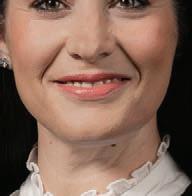
initiatives integrating sustainability, inclusivity and community support into its operations and supply chains. Roos explains: “One of the key programmes re ecting this commitment is the Zimbabwe Women Empowered in Business project. This initiative empowers women to start and sustainably run their Nicole Roos









businesses as subdistributors for Nestlé products.” She adds that this project, which provides comprehensive training in business management, entrepreneurship, nance and customer care, funded by Nestlé Zimbabwe, “not only promotes entrepreneurship, but also creates a sustainable market route for Nestlé products, enhancing local economic growth”.
Collaborations are also a signi cant part of Nestlé’s holistic approach to diversity and inclusion. In this regard, Roos gives the example of her company’s collaboration with The Female Quotient, the experiences, media and transformative business advancing equality in the workplace. “By promoting female leadership and supporting gender-neutral policies, Nestlé fosters an inclusive work environment that bene ts the broader community,” says Roos.
Other initiatives driven by Nestlé include Nescafé Plan and Cares for Water. Roos says: “These initiatives empower women within Nestlé’s supply chains and contribute to the overall wellbeing and sustainable development of the communities it serves.” She concludes: “This comprehensive approach ensures that women’s economic inclusion drives growth and innovation, bene tting both individual organisations and the broader African economy.”
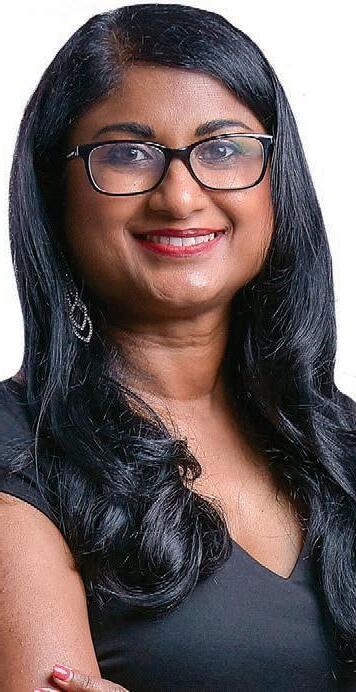

“Getting more women involved in business will help Africa realise its potential, and workplace equality will inevitably lead to change across society”, says a bold statement on the Institute of Directors website.
Professor Natesan explains what this means: “Women’s participation in governance is essential for creating a more equitable and balanced leadership structure. Their inclusion brings different perspectives, experiences and values to decision-making processes, which can result in more comprehensive and well-rounded governance outcomes. This diversity in thought is crucial for addressing complex issues and mitigating risks that homogeneous boards might overlook.”
She adds: “Women in leadership roles contribute signi cantly to developing inclusive cultures and more empathetic workplaces.” She says it has been shown that women’s leadership styles often “emphasise collaboration, mentorship, and holistic thinking”. Professor Natesan also believes women leaders inspire policies that advocate for “work-life balance, employee wellbeing and corporate social responsibility, driving sustainable growth”.
Asked how diverse boards impact business performance and decision-making in Africa, Professor Natesan says: “In Africa’s diverse and dynamic markets, boards that re ect a variety of backgrounds, experiences and perspectives are better equipped to understand and respond to the unique challenges and opportunities within the region.” She adds that the diversity of boards leads to a broader range of scenarios being considered, leading to better strategic decisions and improved business resilience.


“Diversity fosters innovation by challenging the status quo and encouraging creative solutions to problems. Research consistently shows that companies with diverse boards perform better nancially as they are more adept at capturing and addressing the needs of a diverse customer base, which is particularly important in Africa’s varied economic landscape,” Professor Natesan concludes.
Exxaro is a South African-based diversi ed resources company operating mainly
in coal. The company’s vision statement re ects how it perceives its responsibilities in general: “Guided by our purpose to Power Better Lives in Africa and Beyond, we understand that we cannot grow sustainably without deliberately creating a positive impact in the environment and communities we serve.” In keeping with this vision, Dr Tsengwa says: “Exxaro’s stance on women empowerment is comprehensive and rmly rooted in promoting gender equality and inclusivity within the organisation.”
She explains why the company’s stance on women empowerment is comprehensive: “We look at various components that give us a holistic approach because while we want to empower women and give them an equal footing, we also want to ensure everyone in our organisation feels like they belong. Our Gender Equality Charter demonstrates a commitment to raising awareness about gender equality issues, ensuring equal treatment for all employees, including females, males and LGBTQIA+ individuals, while actively identifying and implementing women empowerment initiatives.”
Exxaro has a solid infrastructure that ensures diversity is central to its operations. Some examples of initiatives identi ed by Dr Tsengwa include mentoring, learning and development, providing women access to career and leadership development opportunities, a gender-inclusive paid parental leave policy and a workplace harassment and bullying policy.
For anyone wanting to know how Exxaro has become so successful in driving inclusion and diversity, Dr Tsengwa has a ready answer: “The company’s recognition of women’s participation in the workforce is evident through its strategic targets, robust initiatives and commitment to creating a culture of respect, empowerment and growth. We have set a target to achieve 50 per cent women representation in management and specialist levels by 2025, underscoring our commitment to gender equity.”
She adds: “These efforts have positively impacted Exxaro’s bottom line and organisational culture by fostering a more inclusive and equitable workplace that, in turn, enhances employee morale, productivity and retention.”
“DIVERSITY FOSTERS INNOVATION BY CHALLENGING THE STATUS QUO AND ENCOURAGING CREATIVE SOLUTIONS TO PROBLEMS.” – PROFESSOR PARMI NATESAN
Tackling gender equality requires both legal and social undertaking.
By BRIGITTA MANGALE ,
director, Pro Bono & Human Rights practice and CLAUDIA GROBLER , associate, Dispute Resolution practice at Cliffe Dekker Hofmeyr (CDH)
The achievement of gender equality is a process dependant on various interconnected factors. The law, economic realities, and social and interpersonal dynamics must all work together if we are to triumph in this battle for equality. However, the importance of our law cannot be understated in realising the rights of women in our Constitutional dispensation. Our law continues to mutate in pursuit of these ideals.
In June 2022, the Constitutional Court in Women’s Legal Centre Trust v President of the Republic of South Africa (2022) handed down a powerful judgment progressing the rights of women in Muslim marriages. Here, two pieces of legislation were declared inconsistent with sections 9, 10, 28 and 34 of the Constitution as they fail to recognise the validity of marriages solemnised in accordance with Sharia law.
In a unanimous judgment, the Constitutional Court found that the effect of this denial is to deprive Muslim women and children of the remedies and protections they would otherwise have. The court held that there is no justifi cation for the continuing nonrecognition of Muslim marriages, especially considering “the historical context of systemic violation of the rights of Muslim women”. The court reasoned that a woman’s choice to conclude a Muslim marriage plainly “does not mean that she should not be protected from the economic and social hardships she suffers in such a marriage”.
In pursuit of equality, lawyers and lawmakers have a duty to interrogate missteps in our judicial processes and correct them. In a matter before the Cape Town Magistrate Court, a protection order was granted against a woman who disclosed on a private social media group that she was raped by an ex-boyfriend. She intended it as a warning to others
IN PURSUIT OF EQUALITY, LAWYERS AND LAWMAKERS HAVE A DUTY TO INTERROGATE MISSTEPS IN OUR JUDICIAL PROCESSES AND CORRECT THEM.
and a way to fi nd healing, community and support. The protection order directed that she was “not allowed to tell anyone, in any manner, that [the applicant] had raped her”. The court stated: “It is ‘strange’ that she was ‘raped’ [previously] ... and yet failed to lay one charge of rape. This court by no means wants to silence the respondent ... but in my humble view, she cannot continue to tell others that the applicant had ‘raped’ her.” Extracts from this judgment serve as a stark reminder that our law cannot work in isolation from the social realities of our country and an understanding of rape culture.

Fortunately, review and appeal processes allow for an interrogation of the law and facts considered by lower courts. On appeal, the Western Cape High Court in Segerman v Petersen (2022) overturned the ruling of the Magistrate Court, fi nding that the court was incorrect in drawing a negative inference from the respondent’s failure to report the rape to the police as “the reasons why rape victims do not lay charges are well-known and our courts have taken cognisance of it”.

CDH’s Pro Bono & Human Rights Practice is committed to playing its part in moving toward generation equality.
The Cape Town Practice, in particular, is focused on implementing and developing the law to protect women against violations of their basic human
rights, thereby taking meaningful steps towards gender equality. Our practice is pursuing a matter in which section 12(4) of the Prescription Act of 1969 is being challenged as unconstitutional. The intention is that a successful outcome will positively progress our laws around sexual abuse, which we know disproportionately affect women. But as is evident from the Segerman lower court judgment, there is more to achieving generation equality than the letter of the law.
How women and girl children are viewed, rape culture and social dynamics will all directly inform our journey to equality – a journey we must all take together.


For more information: www.cliffedekkerhofmeyr.com
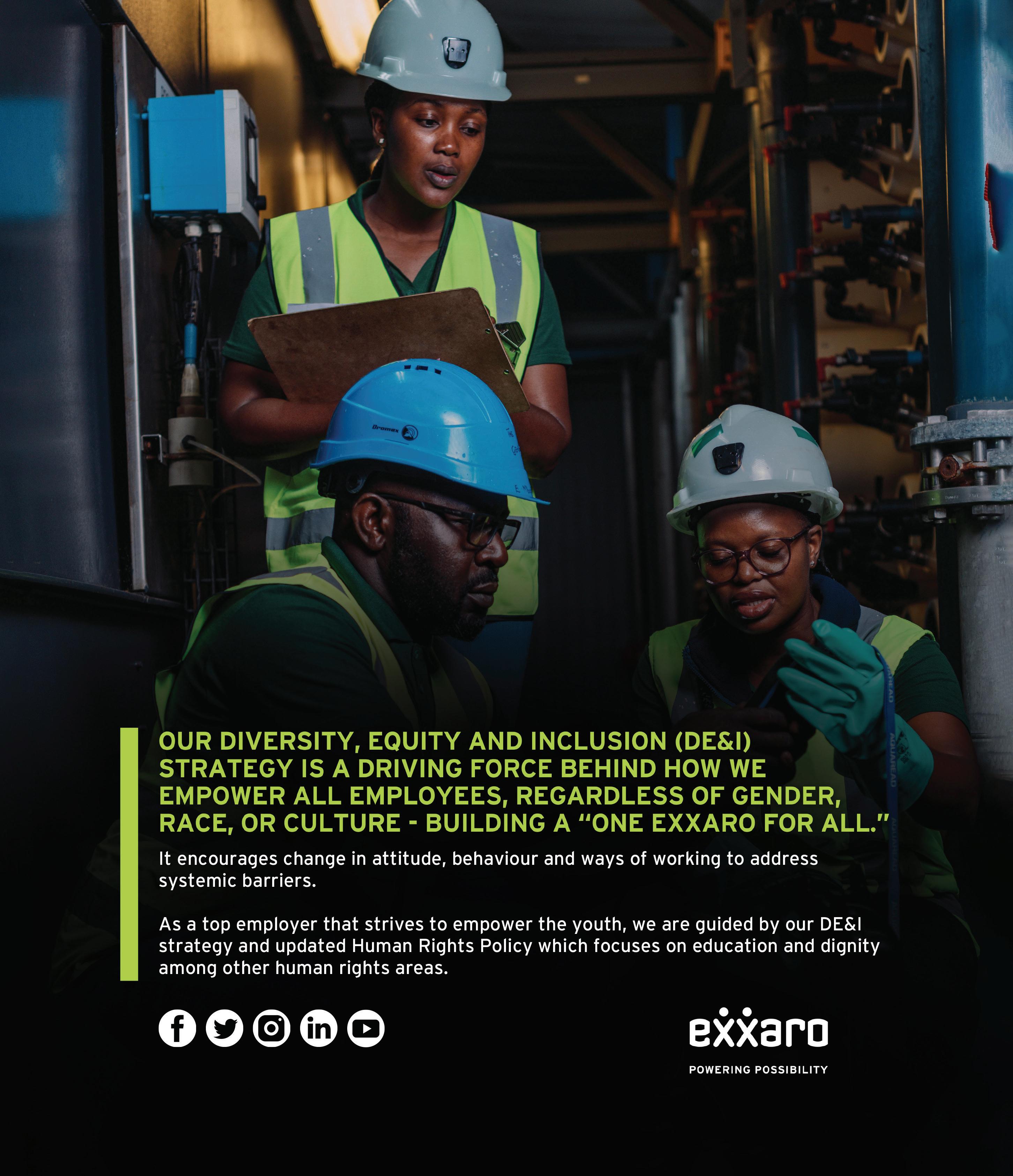
Exxaro aims to create an equitable, supportive and growth-oriented environment for women across all levels of the organisation. This commitment is deeply embedded in its policies and culture and is actioned through various policies and strategies.
To further enable women to thrive and advance in their mining careers, mining companies could implement the following additional measures.
Exxaro’s Employment Equity and Disability policy aims to eliminate discriminatory practices and foster a diverse and inclusive workplace, emphasising the importance of equal opportunities for women. The company’s Diversity, Equity and Inclusion policy drives several key objectives, including ensuring adequate representation of women in decision-making governance structures, advancing women in succession and career pipelines through mentorship and coaching and addressing pay inequalities through annual pay gap analyses.
When women feel valued and supported it leads to a higher level of engagement and performance. The company’s focus on personal growth and development empowers women to advance in their careers and contribute meaningfully to the organisation.
Initiatives, such as the Exxaro Women Indaba and Women’s Month activations, prioritise continuous learning and dialogue around gender equity. The company’s 100 days challenge against gender-based violence and its Gender-Based Violence & Sexual Harassment Toolkit are a proactive approach to creating a secure and supportive environment for women.
Empowering women to participate fully in the economy leads to innovation, diversity of thought and enhanced decision-making –critical drivers of business growth. Women’s economic inclusion increases their purchasing power and creates new market opportunities. As women gain nancial independence, they become key decision-makers in households and communities, in uencing spending patterns and driving demand for goods and services. Businesses catering to this growing demographic can unlock new revenue streams.
In addition, women’s economic empowerment has a ripple effect on broader economic prosperity. When women
D NOM A A N WA , CEO of Exxaro, discusses leading from the helm and strategies for creating a workplace where women feel like, and know that they belong
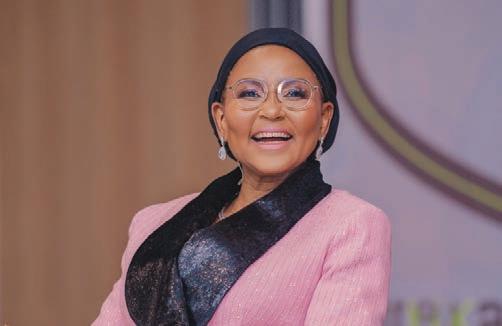
are economically active, they reinvest in their families and communities, leading to improved health, education and quality of life. This creates a more stable and prosperous society, which, in turn, supports a thriving business environment.
The journey towards full gender equality in the mining industry is ongoing. While there has been an encouraging increase in the number of women in various roles, more is needed.
Implementing programmes speci cally designed to bring women into the industry and ensure their growth is needed. Exxaro’s Professionals in Training programme is one such targeted effort.
However, such efforts must be part of a broader, sustained commitment to change. It’s not enough to simply open the door for women to enter the industry; they must be provided the support, mentorship and opportunities to advance. It is also vital to address the underlying issues that can make the industry particularly challenging for women, such as more exible working conditions, better support for work-life balance and stronger policies to combat harassment and discrimination.
Mentorship and sponsorship programmes. Establish formal mentorship and sponsorship programmes that connect women with senior leaders who can advocate for their advancement and guide them in navigating the industry’s challenges.
Leadership development. Invest in leadership development programmes providing women with the skills and con dence to take on senior roles. This includes technical and soft skills, such as negotiation, strategic thinking and networking. Flexible work arrangements. Offer more exible working arrangements so women can balance their careers with other responsibilities.
Address workplace culture. Offer unconscious bias training and ensure there are clear, enforceable policies against discrimination and harassment.
Benchmarking and accountability. Set targets and regularly measure gender diversity and inclusion metrics to ensure progress and to hold the organisation accountable for meeting goals.
By focusing on these additional measures, we can create a more equitable environment where women are truly empowered.


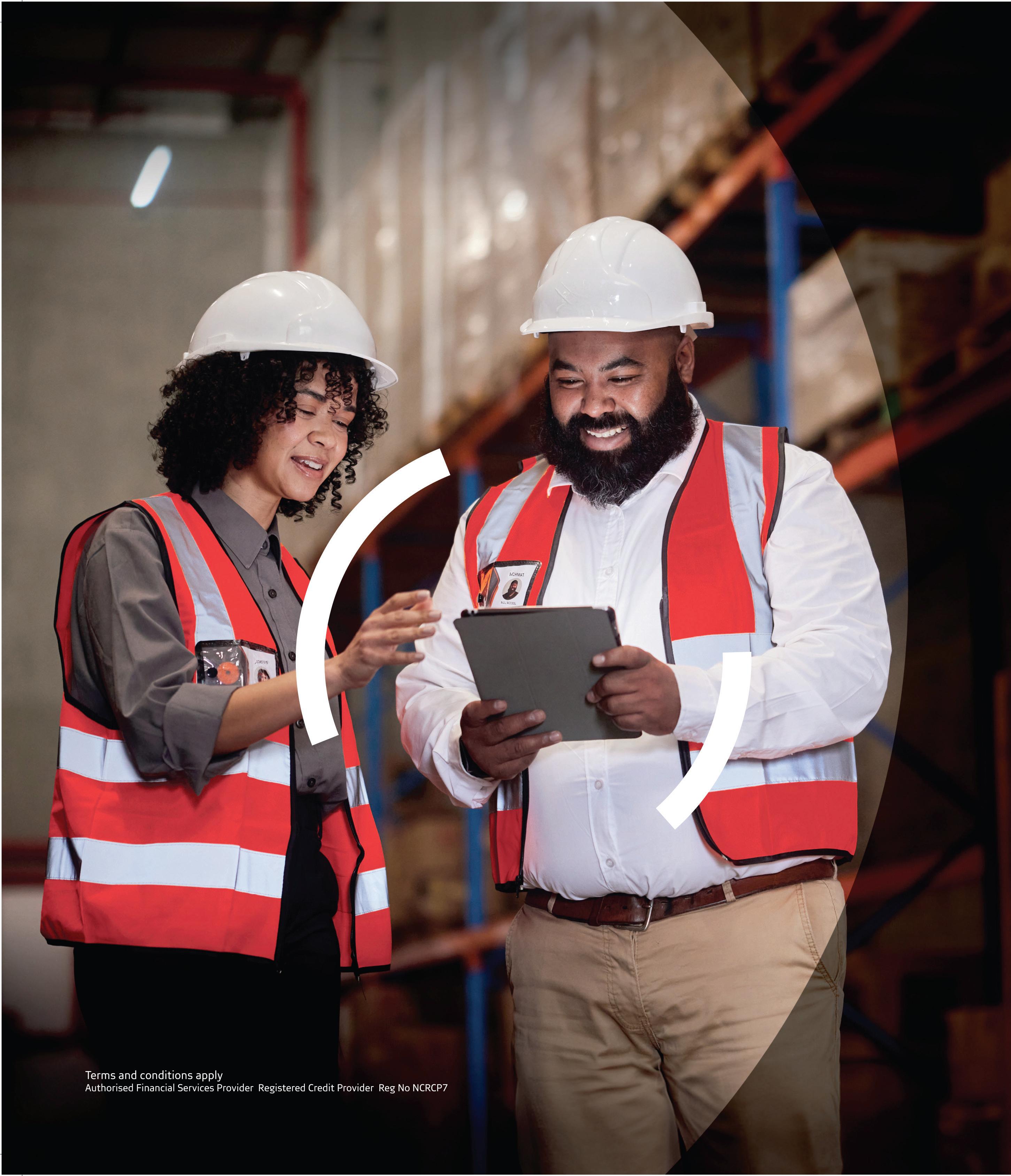





NESTLÉ EAST AND SOUTHERN AFRICA REGION is proud of its many women leaders who are mentoring and inspiring others to reach new heights
Nicole Roos was appointed chairperson and managing director for Nestlé (South Africa) (Pty) Limited, East and Southern Africa Region –comprising 23 countries – in November 2022. She began her career at Nestlé over 20 years ago as a marketing trainee.
Since then, she has held various positions, from brand manager of the former Eastern African Region (2002–2006) and category marketing manager of the Eastern and Southern Africa Region (2006–2008), before expatriation to the United States market as the category marketing manager for Gerber when it was acquired in 2008. She returned to South Africa as country business manager for infant nutrition in 2010, an executive leadership position she held for six years. Before assuming her current role, Roos was the business executive of cer for coffee and beverages (2016–2022). She grew the business into one of the most successful in the sector, despite the challenges of operating across multiple markets vastly different to each other.


Roos holds an honours degree in dietetics (University of Pretoria, South Africa) and a global master’s degree in business administration and digital transformation (University of Barcelona, Spain). Roos is passionate about developing young talent, advancing inclusivity in the workplace, circularity and sustainability across the value stream and digital transformation.















Katie Billington began her career with Nestlé in 2005 as part of the supply chain organisation in the UK (United Kingdom) and Ireland. Over the years, she has held various leadership positions across markets in Africa, Asia and the UK, developing a deep understanding of the complexities of global supply chains.
With extensive knowledge and a remarkable ability to inspire and lead others, Billington is the perfect mentor. She believes mentoring is a powerful tool for growth and development and is dedicated to empowering others to reach their full potential. “My career has been positively impacted by people who mentored me formally and informally. I hope to be able to do the same for others,” she says.
Billington’s expertise lies in relationships and interactions with people and she is passionate about developing young talent and advancing inclusivity in the workplace. Outside of work, she enjoys music and spending time outdoors.
As an executive mentor, Billington is motivated by
a strong belief in the potential of people. “I believe mentoring gives people an opportunity to strengthen their development. I also believe that it helps me to learn and grow more.”
Dudu Mokholo is a seasoned marketer with over 20 years of experience in classical marketing, holding a master’s degree in business administration and a master’s in management advancement programme from the University of the Witwatersrand, as well as a diploma in marketing management from the University of Johannesburg. Her career is de ned by transformative marketing strategies across diverse industries.
Before joining Nestlé, Mokholo held signi cant positions at Samsung Electronics, including chief marketing of cer for the Africa Of ce and executive board member at Samsung South Africa. Her strategic in uence extended to her roles at the Mobile Marketing Association, where she served on the boards of the South Africa and EMEA divisions and contributed to the Smarties Awards jury.
Earlier in her career, Mokholo made notable contributions at Tiger Brands, spending just under 13 years working across various categories. She was instrumental in repositioning the Tastic brand, establishing a digital footprint for culinary brands and driving market expansion strategies that extended South African heritage brands across Africa. Additionally, she gained valuable experience at Colgate-Palmolive and Reckitt Benckiser, where she managed prominent brands and honed her expertise in brand management and marketing strategy.

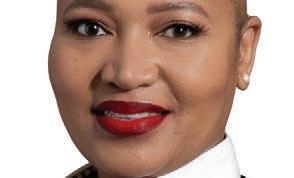

Mokholo is a dynamic strategic and innovative thinker with a strong foundation in classical marketing. She believes in the power of collaboration and is particularly passionate about brand communication, positioning, and innovation.




















Conny Sethaelo joined Nestlé in 2003 as a medical delegate in the Northern Cape. Over the years, she has held various roles, including market nutritionist, consumer and issues manager, and now corporate communications and public affairs director. Sethaelo’s achievements include successfully delivering the company’s Creating Shared Value objectives, excelling in stakeholder engagement, leading an exceptional internal communications team and protecting the company’s reputation through rigorous crisis and issues management strategies. She holds a BSc degree and a PGDip in dietetics from the University of KwaZulu-Natal. Sethaelo has also completed several leadership courses, especially those focused on women, both internally and externally.
As a mentor, she enjoys developing people and believes everyone has immense potential to excel with the right support and guidance. “Mentorship is the best way to help people realise their potential and enhance their personal and professional journeys,” she says. Sethaelo’s expertise lies in building relationships and in uencing with integrity.
In her free time, she enjoys cooking, hosting family and friends and singing, particularly gospel music, which helps her connect with a higher power. She is motivated to be an executive mentor by seeing people grow and believing in their maximum contribution when activated and engaged.
Dr Marianne Lomberg is a seasoned South African veterinarian with more than 15 years of international
business experience in the animal health space, including three years as head of sales for Sub-Saharan Africa for Dutch Animal Health company Kepro BV.
Since 2021, she has been the business executive of cer for Nestlé Purina’s operations in Eastern and Southern Africa as the company re-enters the continent with its pet food brands. Dr Lomberg has completed a Future Females Business School programme for women running cross-border businesses in Africa.
As a mentor, Dr Lomberg values the mutual learning experience, saying: “Everyone has walked a long road already to get to where they are. Their views on the world always enrich me and help me see my problems in a fresh light.” Her expertise lies in coaching for self-belief, bringing authenticity into the work environment and transferring skills into new and unfamiliar environments.
Dr Lomberg’s hobbies include reading, writing, running and environmental pursuits. She enjoys being an executive mentor because “helping people, especially women achieve their best is the reason I get up in the morning”. She believes mentoring is a vital pathway to empowering others.
Feroza Grosso Ciponte is a dynamic and accomplished professional with a 30-year career marked by achievements in nance, operations, supply chain management and strategic leadership. Born in South Africa, she rose from humble beginnings to earn an MBA and a black belt in process improvement. She broke barriers as the rst female of colour to manage a distribution centre in South Africa in the early 2000s and later gained international experience in Hungary and Switzerland. Her career spans various leadership roles, including market business excellence lead, supply chain lead, and head of




supply chain for East and Southern Africa. Grosso Ciponte developed and implemented a global supply chain strategy for automation, enhancing operational ef ciency and setting new standards. In her current position, she is responsible for driving growth and maintaining competitive advantage.
Grosso Ciponte is dedicated to mentoring and developing future leaders. She believes in nurturing talent and fostering a culture of continuous learning. Her journey as a trailblazer for women of colour in leadership positions inspires others, demonstrating that determination and vision can lead to global success.












Entrepreneurship is an important factor in economic development and growth. MWANGI GITHAHU shares an overview of the increasing visibility and success of women in entrepreneurship, highlighting their contributions to local economies
An analysis of key statistics underlining the growth of women-led businesses across various sectors collectively underscores the signi cance and growing impact of small and medium enterprises (SMEs) in driving economic development and innovation across Africa.
Head of client value propositions for SMEs at Absa Relationship Banking Khanya Matshikwe says: “Starting and running a business, in general, is not an easy exercise and requires support throughout because there are multiple barriers to entry for women seeking to start businesses.”
Matshikwe shares some of the main challenges facing women entrepreneurs in South Africa and Africa in general.
• Poor access to networks: mentorship and a network that can help provide access to markets is a key lever for any business that wants to grow.
• Representation in investment teams and the lack of collateral: the majority of funding teams are male-dominated. This creates a bias towards businesses founded by and/or led by men. The lack of representation means women are less likely to receive funding. Where funding is granted, there is also the challenge of access to collateral that can further limit the growth of businesses started by women.
• Family responsibilities: traditional gender roles remain common in our society, often assigning women the primary
responsibilities of homemaking and caregiving. The time dedicated to caring for young children and family members, including the elderly or ill, can impact the time available to start and develop a sustainable business. Data released this year from StatsSA for 2023 indicates that 42.3 per cent of South African households are led by women, this is typically without the support of a partner. This has the resultant effect of increasing the burden on women in business. Additionally, Matshikwe says many entrepreneurs may not have the knowledge to run a business. “They may have a fantastic idea and the skills necessary to run with the idea, but they may have limited knowledge when it comes to registering the company, managing accounts, marketing and managing the business.”
She adds that against the background of growing support networks, access to funding and government and private sector initiatives, women entrepreneurs are increasingly making substantial contributions to local economies through job creation and innovation.
Matshikwe says Absa is committed to supporting the growth and development of its SME clients and shares the success story of a family-owned and -operated business, Funky Ouma.
“Funky Ouma is the result of a very funky Ouma of ten grandchildren who, despite having played around with food and spices all her life, decided at age
“STARTING AND RUNNING A BUSINESS IN GENERAL IS NOT AN EASY EXERCISE AND REQUIRES SUPPORT THROUGHOUT BECAUSE THERE ARE MULTIPLE BARRIERS TO ENTRY FOR WOMEN SEEKING TO START BUSINESSES.” – KHANYA MATSHIKWE

sixty-seven to start her own brand with her youngest daughter, Johannita.
“Funky Ouma has positioned itself as a creative brand offering wonderful farm-fresh herb- lled salts and spices for everyday use (especially braai/barbeque). Twelve years later, the business has grown from the family kitchen to a beautiful modern facility. As the business has grown, it has expanded its range of products to include coffee, extra virgin olive oil and gift boxes. All Funky Ouma products are convenient and beautifully packaged.”
Matshikwe says the best part about the business is that it allowed Johannita to balance work and family responsibilities.





“THE SHE’S NEXT INITIATIVE HAS BEEN IMPACTFUL, WITH MANY SOUTH AFRICAN PARTICIPANTS REPORTING NOTABLE BUSINESS GROWTH AND ENHANCED MARKET ACCESS.” – LINESHREE MOODLEY
Earlier this year, Absa partnered with Visa to launch the 2024 She’s Next programme, a global advocacy programme that aims to support women-owned small businesses through funding, training and mentorship. The programme extends beyond conventional business paradigms to champion meaningful impact towards the progress of women across societies.
Country head for Visa South Africa, Lineshree Moodley, says: “The She’s Next initiative has been impactful, with many South African participants reporting notable business growth and enhanced market access. In the CEMEA (Central Europe, Middle East and Africa) region, 560
Women entrepreneurs are going digital – GEM data shows that more women (45 per cent) than men entrepreneurs (35.2 per cent), in response to the COVID-19 pandemic, adopted digital technologies in their business. Furthermore, it shows that more women (62.1 per cent) than men (57.9 per cent) have the intention to adopt digitalisation in future.
*Source: GEM Women Entrepreneurship in South Africa: What does the future hold? report
women have been supported so far. “Now in partnership with Absa, the programme extends to champion meaningful impact on the progress of societies.”
Moodley says the Absa partnership aims to amplify their reach and offerings in digital payments, with a speci c focus on the burgeoning youth market, strengthening SMEs and empowering women entrepreneurs. “She’s Next offers participants a chance to win over R1-million in prizes. In addition to the monetary prizes, the top applicants will receive training and capacity-building sessions courtesy of Visa, Absa and its partners.”
Providing an analysis of key statistics that underline the growth of women-led businesses across various sectors, Moodley agrees with Matshikwe about women entrepreneurs in South Africa and across Africa facing signi cant challenges, adding that these challenges also include insuf cient technological infrastructure, economic uctuations and a complex regulatory environment.
Nevertheless, Moodley says that in South Africa speci cally, women entrepreneurs are making substantial strides in traditionally male-dominated industries, such as manufacturing and nance, contributing to local economic development and resilience.
She adds that the visibility and success of women entrepreneurs in South Africa is steadily on the rise, signi cantly contributing to local economies. Women
“THE SANLAM FOUNDATION HAS THREE PROGRAMMES FOCUSED ON SUPPORTING SMES. ONE OF THESE PROGRAMMES IS SOLELY FOCUSED ON BLACK-WOMEN-OWNED SMES. IT IS DELIVERED VIRTUALLY AND HAS A NATIONAL REACH.” – NOZIZWE VUNDLA

are setting new standards in emerging industries, particularly in ntech and e-commerce. “At Visa, we have speci cally been able to contribute and shift the needle greatly in the ntech and technology industries through partnerships.”
Nozizwe Vundla, head of the Sanlam Foundation, says that supporting SMEs is a critical step in economic empowerment. “The Sanlam Foundation contributes to the Association of Savings and Investment of South Africa, Enterprise and Supplier Development (ASISA ESD) Fund to provide access to nance for entrepreneurs.”
Vundla adds that through the Project Accelerator ESD programme, the foundation has also provided a grant to



SMEs that aims to support SME owners with the adoption of alternative energy solutions. This initiative enables SMEs to reduce their environmental footprint, lower energy expenses, enhance their competitiveness and foster sustainability.
“The Sanlam Foundation has three programmes focused on supporting SMEs. One of these programmes is solely focused on black-women-owned SMEs. It is delivered virtually and has a national reach,” says Vundla.
The foundation’s implementing partner for this programme is the Black Umbrellas, an established ESD incubator that brings partners together to support the growth of SMEs, enabling economic participation that impacts communities. She adds that the outcome for an entrepreneur in this programme is the assessment of the value proposition and business model to test for viability and potential to deliver sustainable results.
Ithuba CEO Charmaine Mabuza argues that we should not forget the empowering role education and skills training play when
looking at supporting entrepreneurs. “As someone who has always believed in the power of knowledge, I can attest to how education and skills development not only enhance business acumen, but also instil the con dence needed to break through the barriers women face. When women are equipped with the right skills and education, they can navigate the complexities of the business world with greater ease and effectiveness.
“Access to business development services, mentorship programmes, networking opportunities and nancial literacy training are not just support mechanisms; they are transformative tools that empower women to not just survive, but also thrive in their ventures,” Mabuza explains.
“At Ithuba, we are committed to nurturing the wave of female entrepreneurship. Our Female Retail Management Programme, for instance, is speci cally designed to uplift previously disadvantaged women in business.”
Commission for Gender Equality report on Women in the South African Economy 2024

STATS SA General Household Survey 2023





Mabuza adds that by providing opportunities for further education, including attaining a bachelor’s degree, Ithuba ensures women are equipped to lead and innovate in their respective elds. “Moreover, through our Supplier Development and Enterprise Development programmes, we have supported numerous female entrepreneurs who have, in turn, become employers and industry leaders within their communities.
“This is the kind of ripple effect we are striving to create – a legacy of empowerment and success that extends beyond the individual to impact entire communities.”
On the issue of representation of women at all levels, Rand Merchant Bank Diversity, Equity & Inclusion head Darshni Padayachee says: “RMB is a majority female (52 per cent) organisation with an intentional focus on diverse representation at all levels of the organisation, including our decision-making forums.

“Our RMB Exco is 33 per cent female with a strong representation of female leadership across both the pro t-making and enablement areas and is 39 per cent female at senior management.”
Padayachee says RMB is a signatory to the UN Women’s Economic Empowerment Principles and their commitment to gender parity, so they are intentional about the upliftment of female talent. This is demonstrated through their partnerships with Business Engage and the 30% Club, the AWCA (African Women Chartered Accountants) and the IWFSA (the SA chapter of the International Women’s Forum) Young Leaders Connect. Another intentional strategy RMB employs is to support women who fearlessly strive to break through all the existing imposed challenges. They drive fearless thinking and support the annual Gender Mainstreaming Awards (GEM)
“ACCESS TO BUSINESS DEVELOPMENT SERVICES, MENTORSHIP PROGRAMMES, NETWORKING OPPORTUNITIES AND FINANCIAL LITERACY TRAINING ARE NOT JUST SUPPORT MECHANISMS; THEY ARE TRANSFORMATIVE TOOLS THAT EMPOWER WOMEN TO NOT JUST SURVIVE, BUT ALSO THRIVE IN THEIR VENTURES.”
– CHARMAINE MABUZA
founded by Business Engage by sponsoring the GEM RMB Africa’s Fearless Thinker award that recognises and seeks to identify individuals across industries who are recognised among their colleagues and/or community for their ground-breaking, innovative thought leadership on tackling issues of gender mainstreaming.
Padayachee adds: “There are numerous initiatives supporting women in the workplace, including access to personal empowerment and leadership programmes, mentors and executive coaches. Sponsorship is an additional way of ensuring that our leaders focus beyond their comfort zones on seeking out diverse talent.
“RMB’s support for working parents, for instance, includes access to on-site educare and parental transition coaching. “If the burden of care is reduced, women are less likely to step out of their careers. We know that to achieve parity in the workplace, we need to support gender parity in the home and recognise that the roles of both parents are changing.”
RE AD Visa’s She’s Next programme

A recent report from the Global Entrepreneurship Monitor (GEM), Women Entrepreneurship in South Africa: What does the future hold?, monitors the intricacies of the women’s entrepreneurship landscape. At a glance, the report, says it’s encouraging that more and more women are braving the odds and pushing through the barriers, venturing into entrepreneurship and impacting communities and society at large.
Compared to the GEM’s global average for women, the South African women surveyed have a higher perception of opportunity (61.7 per cent, compared to 55 per cent) and a higher rate of perceived capabilities (66.2 per cent, compared to 55.4 per cent).
Here are key takeaways from the GEM report that underscore the importance of targeted strategies to support women entrepreneurs in South Africa, enhancing their contribution to economic growth and social development.
1. Importance of women entrepreneurship for economic growth. Investing in women entrepreneurs is seen as a highly effective strategy for promoting sustainable economic growth.
Women tend to reinvest a larger proportion of their income into their families and communities, leading to broader social benefits. However, despite this potential, women are less likely than men to start businesses in South Africa, and their ventures often remain small with limited growth potential.
2. Need for policy improvements and greater awareness. While South Africa has policies promoting gender equality, their effectiveness is limited by inadequate awareness and promotion. The report suggests better implementation of policies, more focused awareness campaigns and creating a supportive environment that reduces bureaucratic obstacles and increases access to finance, mentorship and training for women entrepreneurs, especially in rural areas.
3. Promotion of networks and associations for women. Strong networks are vital for the success of women entrepreneurs. The report recommends developing more women-oriented business networks through local government, business incubators, or private sector support. Smaller networks, such as those based on specific industries or business sizes, may be more effective. These networks can help build confidence and facilitate business growth among women entrepreneurs.
RE AD Visa expands She’s Next initiative in Africa, empowering women entrepreneurs with digital capabilities

4. Encouraging early exposure to entrepreneurship. The report emphasises the importance of exposing women to business environments from a young age to foster future entrepreneurial intentions. Initiatives, such as school market days, visits to local entrepreneurs and promoting gender equality in education, are suggested. Targeting these efforts in rural areas with limited resources could increase entrepreneurial activities among women and support broader economic development.
5. Greater media attention on the importance of women entrepreneurship. Stereotyping is a significant issue in the development of women entrepreneurs, with research showing gender differences are linked to perceptions of responsibilities and capabilities. Although this perception has improved, society still perceives entrepreneurship as a male-dominated field. Reducing this stigma and recognising that women can manage successful businesses could help eliminate this stereotype. One suggestion is to increase media attention to women entrepreneurship and their capabilities, and successful women in the industry, which could positively impact society and boost confidence in women entrepreneurs.


L N H MOODL , country head, Visa South Africa, writes that the organisation is addressing the challenges faced by womenentrepreneurs through various initiatives offering women access to funding, digital advancements, training and networking to enhance their market access and business growth
Women entrepreneurs in South Africa and across Africa are making signi cant strides in transforming economies and driving social impact. However, their journey is not without challenges. Obstacles, such as limited access to funding, insuf cient technological infrastructure, economic volatility and complex regulatory environments are common barriers.
A recent Visa survey highlights that these challenges are particularly prominent in South Africa, Nigeria and Kenya. Despite this, digital payments and e-commerce have emerged as pivotal growth areas. With 83 per cent of women-owned small and medium enterprises that have adopted digital payments seeing
Lineshree Moodley shares why she is passionate about empowering women. “I believe that when women rise, they bring entire communities with them, creating ripple effects that extend far beyond individual success. Their growth isn’t just personal –it’s deeply interconnected with the prosperity of families, societies and future generations. This is why I am so passionate about unlocking the full potential of women entrepreneurs. Their power to inspire change is boundless. When we invest in their potential, we are not just building businesses; we are cultivating a better, more inclusive future for all.”
revenue improvements and over 50 per cent establishing an online presence in countries such as Nigeria and Kenya, the future is promising for women-led businesses in the digital era.
Despite these challenges, there has been impressive growth in women-led businesses across the continent. According to a report by African Business, women represent 58 per cent of Africa’s self-employed population, contributing about 13 per cent of Africa’s total gross domestic product. South Africa ranks among the top countries globally in terms of women entrepreneurs making substantial contributions to key sectors such as retail, agriculture and technology. In particular, women are breaking into traditionally male-dominated industries, such as manufacturing and nance, proving their resilience and capacity to drive economic development.









Furthermore, Visa has committed to the Women Impact Fund, collaborating with Standard Bank and the United Nations Economic Commission for Africa. This partnership addresses the structural barriers and investor biases that limit African women’s access to venture capital and private equity, where they currently account for just 7.6 per cent of private equity and receive only 7 per cent of venture capital funding. By providing technical training, portfolio management support and investment research, the fund enhances the capacity of women entrepreneurs to build sustainable and pro table businesses.
Visa has also partnered with IFundWomen, which provides microloans, grants and other nancial products to women-led businesses in South Africa. Since 2022, over 266 grants have been deployed globally, supporting industries ranging from recycling and education to food and construction. This has had a tangible impact, enabling these women to expand their operations, create jobs and contribute meaningfully to their communities.
PAYMENTS ECOSYSTEM






Visa South Africa has been instrumental in addressing the critical challenges faced by women entrepreneurs. Through initiatives, such as She’s Next, Visa offers women access to funding, training and networking resources. The programme, which has supported more than 560 women across the Central Europe, Middle East and Africa region has resulted in many participants reporting enhanced market access and business growth. This initiative also extends to partnerships with organisations such as Absa, aimed at amplifying the reach and offerings in digital payments, speci cally focusing on empowering women entrepreneurs.


has been another game-changer. The company has digitally enabled an estimated 16 million small



IN 2023, THE REVUP WOMEN INITIATIVE WAS LAUNCHED, PROVIDING CAPACITY-BUILDING TRAINING AND MENTORSHIP TO 500 EARLY-STAGE, WOMEN-LED START-UPS ACROSS AFRICA.
and micro businesses (SMBs) worldwide, just over 30 per cent of the multiyear goal we set in 2020 to digitise 50 million SMBs. In Africa, Visa’s investments in digital payment solutions have supported women entrepreneurs by providing secure and ef cient business operations, enhancing their competitiveness in a dynamic economy. This focus on digital transformation is particularly important as the ntech and e-commerce sectors continue to grow, offering women entrepreneurs new avenues for innovation and expansion.
One notable initiative is Visa’s partnership with AfriLabs and the Graça Machel Trust through its $200-million Equitable Access Initiative.
In 2023, the RevUp Women Initiative was launched, providing capacity-building training and mentorship to 500 early-stage, women-led start-ups across Africa. Visa’s commitment to supporting these start-ups, with each business receiving a $10 000 investment, re ects the company’s broader strategy of fostering gender-inclusive economic growth.
The visibility and success of women entrepreneurs in South Africa are steadily on the rise, signi cantly contributing to local economies. Women are setting new standards in emerging industries, particularly in ntech and e-commerce. Their success is fuelled by their ability to innovate and adapt to market needs, combined with a strong sense of community and collaboration.
At Visa, we acknowledge that embracing gender equality in entrepreneurship serves two pivotal roles. First, it enriches the start-up and entrepreneurship ecosystem by bringing diverse perspectives and solutions. Second, it plays a crucial role in social change by boosting women’s representation and impact in the business world.
We have also seen rsthand how gender equality in entrepreneurship enriches the start-up ecosystem by introducing diverse perspectives and solutions – fostering social change by elevating women’s representation in the business world. Through our innovations and partnerships, we aim to accelerate the growth of pioneering, secure and reliable digital payments, ensuring that women entrepreneurs are well-positioned to thrive in a rapidly changing economy.



Addressing the gender gap requires committed, intentional actions, says VIDESHA PROOTHVEERAJH , director of Vodacom Business
For corporates, focusing on gender equality is not about doing “the right thing”, but about harnessing a diverse pool of talent – one that creates exponential value. Time and time again, research has shown that empowering women and increasing gender diversity drives better business outcomes. But if it’s so easy, why are we still facing gender disparities in the workplace and broader society?
According to McKinsey’s Women in the Workplace 2023 Report, myths around women in the workplace exist, preventing progress. The report lists and debunks a few of these misconceptions, such as the myth that women are becoming less ambitious or that the biggest barrier to female advancement is the “glass ceiling” or that women want – and bene t most from –exible work.
A similar study from Deloitte, Women @ Work 2024, highlights that many of the issues facing women in the workplace today – hurdles that have existed for years – are only getting worse, with women feeling more stressed, overburdened and unsafe at work than ever before.
If we continue hoping the situation will x itself organically, it will take many decades for us to achieve anything even close to gender equality. For corporates, the task is to challenge the status quo and act to bridge the divide much sooner. At the Vodacom Group, we aim to reach gender parity at senior leadership levels by 2030.
Our goal is to ensure that women and men play an equal role in key decision-making and the development of our broader business objectives. We are already making signi cant strides to achieve this. Within Vodacom Business, our senior female executives are doing impactful work across traditionally male-dominated industries, from transport and logistics to mining, oil and gas and government. They serve as a prime example of what women can achieve when they are given a seat at boardroom tables. But we
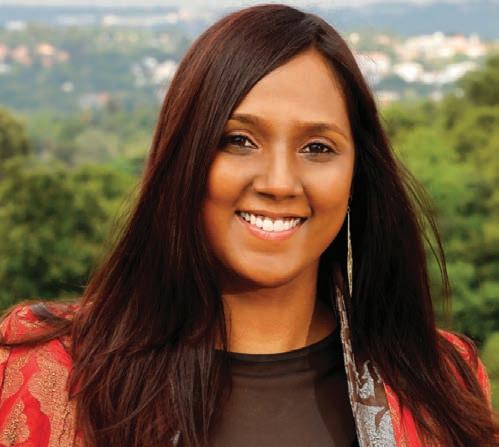
TO ACHIEVE OUR GENDER EMPOWERMENT GOALS, WE NEED TO LOOK BEYOND THE
don’t only champion diversity at the top. As part of our efforts to drive inclusion for employees at Vodacom, our Women’s Network Forum serves as a safe space for women in our business to connect, share their stories, receive career advice, enjoy networking and mentoring opportunities and unpack some of the common challenges they face.
However, to achieve our gender empowerment goals, we need to look beyond the business and support women in the larger world of work. Female entrepreneurs in this country still struggle to access funding, are hindered by gender bias and stereotypes and often lack the networks needed to succeed in male-dominated industries. But, these same entrepreneurs contribute signi cantly to economic growth and social upliftment, so it’s important to support them. We support and assist women-owned businesses by providing small and medium
enterprises with reliable and affordable connectivity and unlock operating ef ciencies through digital technology, Vodacom has also launched various initiatives to help South African women reach their full potential. This includes our Female Farmers programme, which has already provided digital literacy training to 1 300 local female farmers. A further example is #CodeLikeAGirl, which encourages young girls to explore careers in science, mathematics, technology and engineering, empowering them with coding skills and access to women mentors.
As the United Nations’ Sustainable Development Goals point out, gender equality is the foundation of a peaceful, prosperous and sustainable world. By ensuring the rights of women and the girl child, we can build inclusive economies and preserve our environment now and for future generations. Shifting perceptions and debunking myths around what women can and can’t do demands we dismantle the barriers limiting women, champion inclusive professional development opportunities and recruitment practices and address bias, both conscious and unconscious. Only once we do this can more women showcase the value they bring to corporates and the world at large. Women make up more than half the world’s population, and it is time we create environments that enable, inspire and empower them. At Vodacom Business, we remain committed to this goal.



Two
legal practitioners are making inroads into previously male-dominated areas and opening doors for other women to follow
arelise van der Westhuizen, director – dispute resolution, has amassed experience in legal practice and leadership. She has broken “age-old barriers” by heading up the South African office of one of the top international law firms. Zodwa Malinga is an associate in the construction and engineering sector. Her area of practice remains a niche area of law. One that is, for the most part, still male-dominated – that, too, is breaking an age-old barrier. Navigating the construction legal advisory sector is challenging for women, especially young black women.
There are differences in areas of specialisation between the two lawyers, however, there is one common feature: accessing spaces historically male-dominated. Through these two females (and others), we recognise the strides made over the past few years in training and retaining women in the legal industry, especially in niche areas of practice. However, says van der Westhuizen, women in the legal sector still face different challenges than men. “I rarely hear a man ask for advice on how to combine parenthood and a career as a lawyer. So much more work needs to be done,” she comments.
male representation in the judiciary, particularly the Constitutional Court, since the advent of the Constitution. Now, 30 years into our democracy, the head of the judiciary is a black woman, indicative of the country’s commitment to transformation and female empowerment.

Private legal practice has to some extent demonstrated an eagerness for transformation and women empowerment through the training and retention of women. More remains to be done. It matters that women are represented not only in leadership, but also in all areas of practice. It matters that young women coming from institutions of higher education to be trained as candidate legal practitioners have women mentors and leaders. Firstly, to eliminate the stereotypes of women leaders. Secondly, to see that they too can become leaders and mentors. Mentorship is the biggest contributor to women’s growth in industries such as the legal industry. As novelist Toni Morrison said: “When you get these jobs that you have been so brilliantly trained for, just remember that your real job is that you are free, you need to free somebody else. If you have some power, then your job is to empower somebody else.”

Last year (2023) marked a century since women were admitted to the legal profession. However, the promulgation of laws did not mean a rapid change in the status quo. On the contrary, women are still under-represented in the legal profession. This rings true for practice areas historically dominated by white males. Men of all races have been able to navigate practice as seen in the
“Our job as women lawyers, young and old, is to ensure that we all are and remain free,” says van der Westhuizen.
A fundamental aspect of corporate legal practice is problem-solving. Clients come to us with problems that require us to apply ourselves through collaboration and give them the best solution possible. The required skills are acquired through patience and practice. Lawyers do not always agree on a solution. We engage on, for example, a provision of a contract and debate its interpretation. We may not always agree on the solution, but we
present arguments and counterarguments for proper preparation. That is when everyone’s voice is (and should be) heard. It does not matter how junior one is. A solution is required and a legally trained individual should be allowed to contribute to the debate. That is how training takes place. We are obligated to ensure that young women feel safe enough to have and express a view on a matter. Importantly, everyone’s contribution should be acknowledged.
Junior and senior lawyers must engage to learn from each other. Junior attorneys contribute to legal developments daily under the guidance of senior attorneys. That is mentorship. Such guidance must be deliberate and intentional. Junior women attorneys must allow themselves time to learn. Niche areas of law require time and patience to develop the requisite expertise. Senior women attorneys cannot simply say that it will take time to teach young lawyers. There must be intention. Both senior and junior lawyers must engage with the intention of empowering each other in every aspect of law, not for ourselves, but for those who will come after us.
Women must not only take seats at the table, but also make the table longer for other young women to take seats and grow.


For more information: www.cliffedekkerhofmeyr.com

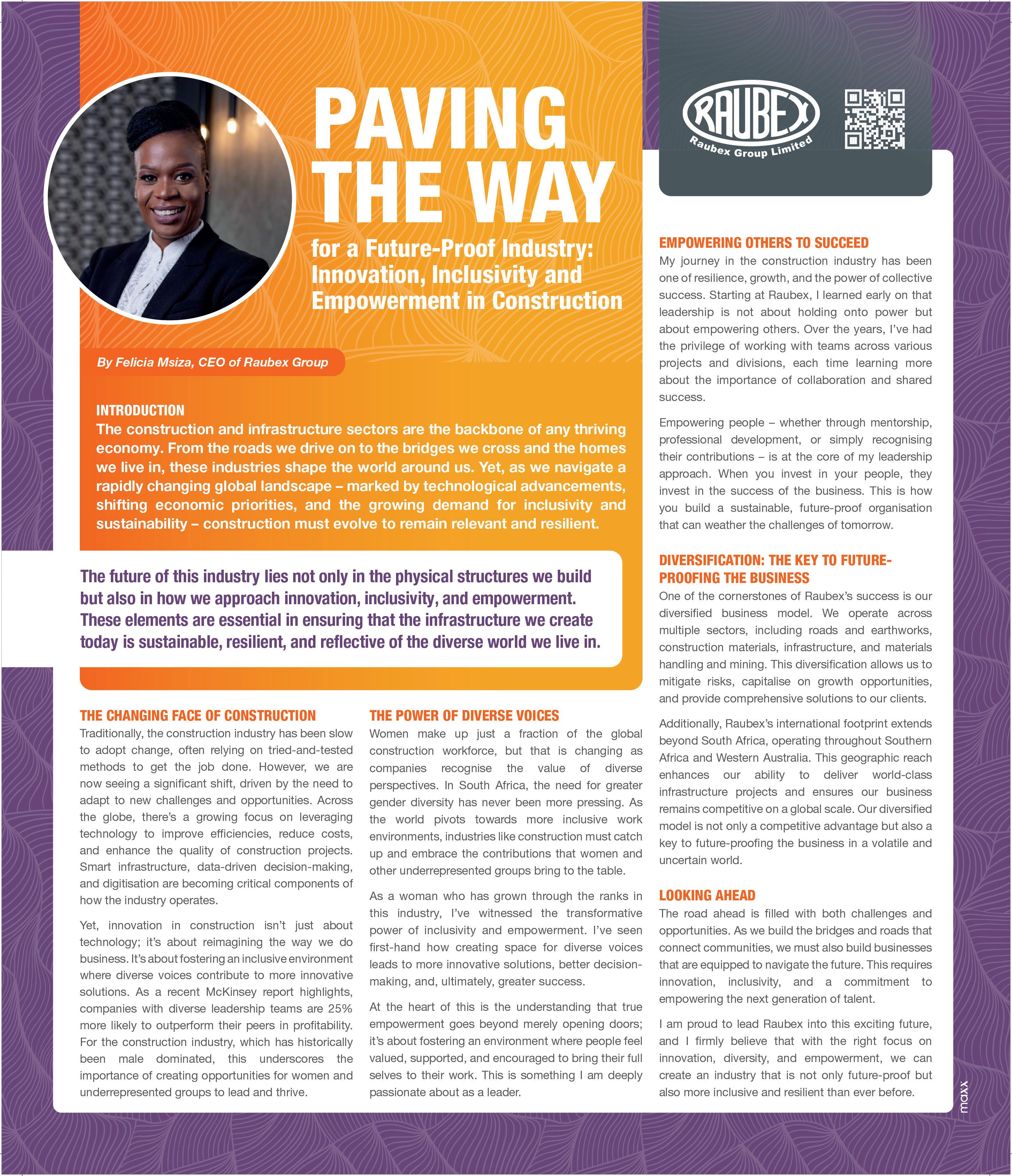
BRENDON PETERSEN unpacks how artificial intelligence is emerging as a transformative tool in the pursuit of gender parity at work
Organisations are increasingly using arti cial intelligence (AI) to tackle long-standing issues in recruitment, workforce diversity and workplace culture. Companies, such as IBM and Blue Pearl, have taken signi cant strides in leveraging AI to create more equitable environments, demonstrating how technology can drive real change.
Despite decades of effort, gender equality in the workplace remains a challenge. Biased recruitment practices, unequal access to opportunities and persistent stereotypes continue to hinder diversity. AI is now offering new tools to help overcome these barriers.
“AI can signi cantly reduce bias in recruitment by focusing on skills and competencies rather than demographic factors,” says Ria Pinto, general manager and technology leader at IBM South Africa. IBM’s AI-driven recruitment solutions use algorithms to evaluate candidates based purely on objective criteria. “Our solutions help organisations move beyond unconscious bias, ensuring everyone has an equal opportunity, irrespective of gender,” Pinto adds.
Blue Pearl, a specialist in cloud and data services, re ects this sentiment. The company has integrated IBM’s Watson technology into its recruitment processes, enhancing fairness. “We developed the Blue App to improve candidate matching using AI,” explains Chantel Govender, chief operations of cer at Blue Pearl. Originally created for internal resourcing, the
app has evolved into a tool addressing biased recruitment. “Our matching effectiveness increased from 38 to nearly 80 per cent after incorporating AI, showing its transformative power,” Govender notes.
IBM’s AI solutions extend beyond recruitment. The company’s Be Equal initiative exempli es how AI can drive gender parity in leadership roles.
By analysing organisational data, AI tools identify talent gaps and recommend career development opportunities tailored to women. Pinto highlights the importance of data-driven insights: “With AI, we can make more informed decisions that accelerate gender equality across the board.”
equality extend beyond the workplace. IBM’s Be Equal programme includes initiatives aimed at expanding digital literacy and access to technology for women in underserved communities. “Inclusivity starts with access,” says Pinto. “Our goal is to create pathways for women, not just within IBM, but in every community where we operate.”
For organisations looking to replicate these successes, Pinto offers practical advice: “Start by identifying biases in your current processes. Then, explore how AI can mitigate them. It’s not just about technology; it’s about using data to create more equitable outcomes.” Govender echoes this: “AI isn’t a one-size- ts-all solution. It’s about understanding your organisation’s unique challenges and customising AI to address them effectively.”

At Blue Pearl, AI does more than improve hiring – it’s a means to build a more inclusive workplace culture. The company has implemented AI tools to automate routine tasks, allowing employees to focus on higher-value work.

“By integrating AI into operations, we’ve created an environment that fosters inclusivity and respects individual contributions, regardless of gender,” says Govender. Blue Pearl’s focus on customising AI solutions for diverse teams has been key to shaping a culture prioritising equality.
The societal bene ts of AI’s role in promoting gender
“OUR SOLUTIONS HELP ORGANISATIONS MOVE BEYOND UNCONSCIOUS BIAS, ENSURING EVERYONE HAS AN EQUAL OPPORTUNITY, IRRESPECTIVE OF GENDER.” – RIA PINTO
The message is clear: AI has the potential to be a powerful tool for advancing gender equality, but its success relies on a strategic approach grounded in inclusivity and fairness.
• Focus on data: use AI-driven insights to identify where gender imbalances exist and target interventions accordingly.
• Eliminate bias in recruitment: leverage AI algorithms that prioritise skills over demographics for a fairer recruitment process.
• Customise AI solutions: adapt AI tools to suit the cultural and operational needs of your organisation.
• Invest in community engagement: extend gender equality initiatives beyond the workplace by using AI to support education and development programmes for women in underserved areas.
Source: IBM Africa


The energy sector has traditionally been dominated by men, however, as the world evolves, a broader range of skills with a speci c emphasis on women’s development is essential to navigate its growing complexities. To survive and thrive, companies in this industry must tap into the full range of talent available.
Encouraging more women to join the energy sector is not just a matter of equality. It is a crucial step towards creating a more innovative, inclusive and sustainable future.
The energy sector today needs a mixture of oil, gas and renewables to deliver energy that is secure, affordable and sustainable –the energy trilemma. Innovative solutions to address this energy trilemma are more likely to be delivered more effectively by diverse teams that represent a mixture of ages, skills, experiences, genders and cultural backgrounds. This has to be coupled with a culture that encourages openness and debate.
mentorship and career coaching. This will ensure women are empowered to graduate into senior leadership positions.
Another lever that can be pulled to create more diverse teams is to understand and address the issues holding women back, which can discourage them from pursuing a career in energy, for example, gender pay gaps, lack of mentoring and an absence of women as role models in senior leadership.
Monitoring pay disparities is essential because if talented women are not fairly paid, they will simply leave the organisation. However, it is not enough to monitor the pay gap: many leading companies now publish pay gap reports on their websites.
Organisations that take active steps to address obstacles to diverse teams are not only more pro table, as reported in McKinsey’s Diversity wins: How inclusion matters report, but also bene t from the diversity of thought and subsequently more innovative ideas and solutions.
A LO M O A LO , CEO at bp Southern Africa, writes that involvingmore women in the industry requires dismantling barriers to benefi t f rom diverse t hinking
The Fuels Industry Association of South Africa’s Human Resource Development Strategy aims to develop the industry’s human capital, focusing on helping designated groups, including new entrants, to acquire scarce and critical skills.
Getting female children to study STEM subjects at school is a challenge, and early-stage education is important to encourage girls to make better subject choices.
Although the industry has made some progress, it is vital to continue addressing racial and gender imbalances in all the businesses supporting and depending on this industry.
As bpSA looks towards its next 100 years in South Africa, we are determined to be a fully inclusive business, drawing on the talent residing across our youthful and diverse population to come up with sustainable solutions. We hope others in the industry will follow our example. Together we can make this industry more inclusive.






Numerous levers can be pulled to create more diverse teams. The rst is to build the foundation at grassroots level. Energy companies can invest in initiatives that support science, technology, engineering and mathematics (STEM) education for female learners, ensuring there is a solid pipeline of talent that can later become part of the sector. This should go hand-in-hand with a deliberate effort to ensure women are proportionally represented when hiring decisions are made. It is not enough to simply employ more women. Companies must embed the right support structures and create an enabling environment to nurture women’s leadership potential, such as
Given the various obstacles in women’s progression into senior positions, it is important to create supportive networks. These can take the form of company-wide or industry-wide associations or clubs where women can listen to expert speakers on relevant topics, freely exchange their views and form bonds with other women, inside and outside the organisation.



Such events help women to share and solve issues that may be holding them back.






Bringing more women into the industry will not happen overnight. It needs long-term thinking and planning. We need to present the energy industry as a desirable career and encourage women to start thinking about it from an early age, to become either employees or energy entrepreneurs.








For more information: 0860 222 166 helpdeskmailbox@bp.com www.bp.com/en_za/south-africa/home
It may be happening so gradually that motorists haven’t noticed. But in the past few years, there’s been a quiet revolution in the service station experience, writes
NOKWANDA
KHUMALO , GM, retail and convenience, bp Southern Africa
The newer and refurbished petrol station forecourts in South Africa’s main urban areas and on motorways look fresher, cleaner and more inviting than they used to. That’s because the fuel retail industry is aiming to elevate convenience for today’s motorists, who are looking for more than just fuel.
Traditionally, the business of a fuel retailer was just that: putting fuel in the tank. Toilets and snack shops were an add-on. But the energy landscape is evolving. Oil companies are becoming integrated energy companies, offering a range of services beyond fuel. For example, in Europe and the United States, fuel stations are having to accommodate electric charging points. While the rollout of electric vehicles is expected to be slower in Africa, international oil companies operating on the continent are diversifying their revenue streams.
Fuel retailing remains a core business, but other businesses are growing around it. Customers are the driving force for innovative new business models and service platforms delivering the convenience, mobility and energy products and services of today and the future.
According to a 2022 study, The future of the petrol station forecourt, by global management consultants Kearney, traditional fuel brands are rolling out infrastructure to prime sites to capture more market share and build consumer loyalty. They are also having
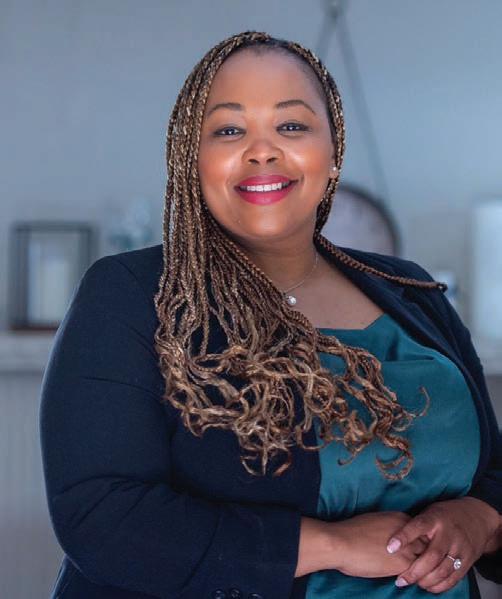
to respond to changing customer needs as today’s customers want personalised experiences and instant grati cation.
Modern fuel stations are becoming comprehensive hubs for fuel, rest and convenience shopping. In a regulated petrol price environment, there is little that fuel station operators can offer in the way of competitive pricing, other than on diesel, but they can offer motorists other inducements to maintain their loyalty to certain fuel brands.
One of those inducements is convenience shopping. Some customers visiting the shop may wish to buy just a coffee or a bar of chocolate while others may have broader needs: basic groceries, a choice of beverages or tinned foods.
Many of South Africa’s best-known fuel brands have partnered with well-established retail chains, whose trusted brands and rewards programmes attract motorists to the site.
For example, bpSA has expanded and enhanced its relationships with established brands such as Pick n Pay and its own Wild Bean Café coffee brand to boost nonfuel sales. It is reviving the bpexpress store format to become a scalable, customer-focused and pro table convenience model across the bpSA fuel network.
Fuel station operators are adopting new strategies to accommodate a bigger footprint and attract a growing customer base. Investing in high-visibility sites, such as on high-traf c motorways and junctions, is critical for visibility and accessibility.
New entrants are arriving in the fuel station business. While many black entrepreneurs are attracted to the potential of fuel retailing, they may lack the requisite capital to invest in the business. By partnering with nancial agencies, fuel companies can increase the diversity of their franchisees. Financial agencies offer nance and also assist with skills training and mentorships. At bpSA, 62 per cent of franchisees are black, demonstrating the group’s commitment to transforming the racial pro le of its business owners.
Rede ning convenience to meet customer needs entails investing in new technologies for selling fuel and enabling payments and strategic initiatives. In the long term, innovation coupled with growth will deliver an exceptional customer experience, reinforcing a brand’s dedication to its partners and loyal customers.


For more information: 0860 222 166 helpdeskmailbox@bp.com www.bp.com/en_za/south-africa/home

There is a correlation between diversity in leadership and organisational performance, writes BUSANI MOYO
Diversity in leadership brings varied perspectives to the table, fostering innovation and better decision-making. Diverse organisations are more effective at solving problems because they consider different viewpoints and experiences, resulting in more robust strategies. Organisations promoting diverse leadership often attract the best talent, increase employee engagement and drive more robust organisational performance.
How accurate are these claims? We look at how two South African giants in the food sector, the Oceana Group and Kellanova, formerly known as the Kellogg Company, are living proof of the role of diversity in boosting organisational performance.
Zodwa Velleman is the group executive of corporate and regulatory affairs at the Oceana Group, the global shing and food processing company and owner of South Africa’s famous Lucky Star brand. She agrees that “organisations that prioritise gender parity are more successful”. She adds: “They outperform their competitors on nearly every metric, from innovation to revenue growth to customers and employee satisfaction.”
Velleman continues: “Gender-diverse teams are better equipped to understand and cater for a diverse customer base, resulting in more effective marketing strategies, improved customer satisfaction and ultimately increased market share.”
Tamsin Darroch, marketing director at Kellanova South Africa, agrees that “gender diversity enhances decision-making quality and creativity by bringing different perspectives, lived experiences and skills to the table”. She adds: “Balanced

Oceana has 43 per cent women representation in executive management, while women hold 51 per cent of management roles at Kellanova South Africa.
* Source: Oceana; Kellanova South Africa
representation in leadership positions ensures different perspectives, experiences and ideas are considered and valued.”

Regarding how diversity in leadership correlates with organisational performance and innovation, Darroch says: “It leads to more effective and inclusive solutions that meet the needs and expectations of Kellanova’s diverse employees, consumers and stakeholders. It also fosters innovation and creativity, which is important for a company to succeed and develop talent.”
Both Darroch and Velleman make it clear that gender diversity in successful organisations is not accidental but a deliberate effort.
“For instance,” Darroch says: “Kellanova’s South Africa is committed to creating an inclusive and enabling environment for women in the workplace through a strategic and integrated approach that covers gendersensitive policies and programmes.”
It’s the same story at Oceana, where Velleman says: “Oceana is committed to driving a culture where diversity, equity and inclusion are fundamental principles. This commitment is evident in its efforts to embed these values across the organisation through training, awareness activities and engagement surveys.”
Concerning speci c policies and frameworks implemented to promote gender equality, Darroch identi es some elements in uencing her company’s policies.
• Work-life balance: ensuring that leave bene ts all employees, including women.
• A exitime working policy: allowing employees, including women whose roles allow, to plan their working schedule in line with their family needs.
• Four months of paid maternity leave: employees can take an additional two months if they wish.
Velleman says Oceana Group’s gender diversity initiatives are founded on the following strategic enablers.
• Supporting career development: this is accomplished through attraction, retention and talent management. The Oceana Maritime Academy equips more women with the skills they need to be promoted to management.
• Promoting diversity and inclusion: this fosters an ethical culture, effective governance and balanced decision-making. It also enhances organisational performance and aligns with stakeholder expectations.
• Empowering women within the organisation: together with promoting inclusivity, this aligns with the company’s customer base, enhancing its reputation.
• Focusing on employee wellbeing: this is accomplished through enhancing employee morale, engagement and job satisfaction.
“BALANCED REPRESENTATION IN LEADERSHIP POSITIONS ENSURES DIFFERENT PERSPECTIVES, EXPERIENCES AND IDEAS ARE CONSIDERED AND VALUED.” – TAMSIN DARROCH


The South African International Maritime Institute is committed to transforming South Africa’s maritime resources into a sustainable and thriving oceans economy. But the attainment of this goal depends on increasing gender diversity, writes NONDUMISO MFENYANA , project co-ordinator: sector education and training and skills development at the institute
The maritime industry remains largely male-dominated. According to the 2022 IMO-WISTA Women in Maritime survey, females account for just 29 per cent of the industry’s entire workforce. Clearly, it’s time for a change.
Further statistics are similarly concerning: the report revealed that only 2 per cent of the world’s seafarers and 10 per cent of search and rescue teams working in national maritime authorities are female.
Representation within South Africa’s maritime industry is not much better. And yet, unless these gures change, the industry’s ability to grow and thrive will be stunted –hence the South African International Maritime Institute’s (SAIMI) commitment to placing gender equality at the forefront of its strategic agenda. This is especially important, given that the industry has only recently turned its attention to addressing gender disparities.
These objectives include advocacy and co-ordination (promoting the maritime sector and increasing levels of training and the placement of trainees and graduates) and research and innovation, with SAMI engaging in projects that drive policy formulation, economic growth and innovation within the maritime sector. Education, training and skills development is a further focus, along with knowledge generation and information sharing.

SAIMI has identi ed several avenues for empowerment within these strategic objectives. For example, its bursary scheme, which supports women pursuing maritime studies from undergraduate to postgraduate levels. SAIMI has, furthermore, implemented a number of mentorship and leadership programmes.
The Advanced Programme for Development in Women Leadership focuses on nurturing and enhancing women’s leadership capabilities.
The Advanced Programme for Development in Women Leadership (APDW) focuses on nurturing and enhancing women’s leadership capabilities. The APDW offers comprehensive leadership training, strategic management workshops and personalised mentorship from seasoned industry veterans. This advanced programme prepares women for executive roles and decision-making positions, ensuring they are not only participants, but also key in uencers in the future of the maritime industry.
Through these initiatives SAIMI is driving meaningful change, fostering a community of empowered women leaders who will shape the maritime sector for future generations.
SAIMI further extends its gender empowerment efforts to the aquaculture sector as it plays a critical role in South Africa’s maritime economy. The institute supports women-owned businesses and co-operatives within the aquaculture sector by providing entrepreneurial opportunities and skills development, encompassing both soft and technical skills. While the sector currently sees limited participation from women, SAIMI is actively working to mitigate this challenge through advocacy and information-sharing initiatives aimed at increasing awareness and involvement.
Of course, the challenge of gender diversity cannot be addressed by a single organisation working in isolation. It requires input from multiple stakeholders working in partnership. The institute is therefore committed to deepening its relationships with like-minded organisations. These collaborations are crucial in advancing SAIMI’s mission to empower women and ensure their active participation in the maritime sector.
In line with its commitment to national development, SAIMI supports the Operation Phakisa: Oceans Economy initiative, which seeks to unlock the economic potential of South Africa’s oceans. SAIMI also provides strategic implementation support to this initiative, including the Value Chain Study, which identi es opportunities for women entrepreneurs in the maritime sector. Women are encouraged to explore these opportunities and contribute to the growth of a more inclusive maritime economy.
The SOUTH AFRICAN INTERNATIONAL MARITIME INSTITUTE is committed to gender equality and inclusivity and increasing the participation of women in the maritime sector
The maritime industry, historically dominated by men, is transforming. Globally, women are breaking barriers, taking on leadership roles and contributing signi cantly to the industry’s growth. In South Africa, the South African International Maritime Institute (SAIMI) plays a pivotal role in facilitating these changes, advocating for and supporting gender equality and inclusivity in maritime.
SAIMI recognises that inclusive progress in the maritime industry can only be achieved through active and increased participation by women. The institute’s efforts in gender mainstreaming in the sector are multifaceted, focusing on education, training and strategic partnerships that drive meaningful change.
One of SAIMI’s core objectives is to ensure women have equal access to opportunities within the maritime sector. This begins with education and training where SAIMI has implemented several initiatives aimed at increasing the participation of women in maritime studies and careers. These initiatives are designed to provide women with the necessary skills and to create an environment where they can thrive and lead.
Education and skills development are the critical components of empowerment, and SAIMI is committed to providing women with the tools to succeed in the maritime space. The organisation has launched various initiatives, such as the Maritime Awareness Programme supported by the DiveIn Website and App, which aims to educate the public about career opportunities in the maritime sector, starting from high school level. The programme includes school visits, career expos and workshops that highlight the diverse roles available in maritime.

SAIMI also offers key programmes targeted at women, such as the Sindiswa Carol ‘Tu’ Nhlumayo Merit Bursary, which supports young women pursuing maritime careers by removing nancial barriers that might hinder their progress, and the Imbokodo in Maritime Leadership Programme, aimed at empowering women in the sector with leadership skills and recognising their contribution in the various subsectors of the maritime sector.
Furthermore, SAIMI supports mentorship programmes that pair young women with experienced industry professionals. These mentorships provide invaluable guidance, helping women navigate the challenges of the maritime sector while building networks essential for career advancement. An example is the Emerging Researchers Programme, aimed at building research capacity by providing networking and research funding opportunities.
SAIMI understands the importance of collaboration in achieving gender equality. The institute has forged strategic partnerships with industry stakeholders, including government bodies, private sector companies and international organisations, to promote
THE INSTITUTE’S EFFORTS IN GENDER MAINSTREAMING IN THE SECTOR ARE MULTIFACETED, FOCUSING ON EDUCATION, TRAINING AND STRATEGIC PARTNERSHIPS THAT DRIVE MEANINGFUL CHANGE.
gender inclusivity in maritime. Some of the primary stakeholders include WOMESA (Women in the Maritime Sector in East and Southern Africa) and WISTA (Women’s International Shipping & Trading Association).
Moreover, SAIMI’s partnerships extend to creating platforms for dialogue and knowledge-sharing. It regularly hosts conferences, workshops and seminars, such as the recently held Women’s Seminar as part of the Women’s Month celebrations, which brought together industry leaders, policymakers and educators to discuss the challenges and opportunities related to gender equality in maritime. These events catalyse change, inspiring stakeholders to take concrete actions towards creating a more inclusive industry.
Despite signi cant progress, challenges remain in achieving gender equality in the maritime sector. Cultural stereotypes, gender biases and a lack of awareness about career opportunities continue to hinder the full participation of women.
SAMI remains steadfast in its commitment to fostering an inclusive maritime sector. Through its initiatives, SAIMI has already seen a marked increase in the number of women enrolling in maritime programmes, participating in training and research initiatives, and assuming leadership roles within the industry.
There is still much ground to be covered in the journey towards gender equality in the maritime sector, however, advancements for increased access and participation by women in the sector are within reach, through SAIMI and its partners’ efforts for a more inclusive, innovative and thriving maritime industry. By empowering the women of today, SAIMI is paving the way for the next generation of maritime leaders, ensuring that the legacy of progress continues to unfold.


For more information: www.saimi.co.za

TAUBIE MOTLHABANE , CEO of the CAPE TOWN INTERNATIONAL CONVENTION CENTRE , exemplifies a leadership style marked by adaptability and a strong focus on people
Since taking up the role of CEO of the Cape Town International Convention Centre (CTICC) in January 2020, just months before the world faced the unprecedented challenge of the COVID-19 pandemic, Taubie Motlhabane’s leadership has been instrumental in navigating the CTICC through dif cult times.
One of her rst major tasks was repurposing the CTICC into a fully operational hospital and vaccination centre, supporting Cape Town’s healthcare efforts during the critical pandemic period. This decisive action not only secured jobs, but also underscored her commitment to serving both her team and the broader community.
Beyond crisis management, Motlhabane has successfully steered the CTICC’s recovery, overseeing international events such as the
Netball World Cup. In the 2023 nancial year alone, the centre hosted 427 events, drawing nearly 275 000 attendees and contributing R5.7-billion to South Africa’s gross domestic product and R5.4-billion to the Western Cape’s economy. Her ability to balance business outcomes with social responsibility has positioned the CTICC as a leading venue on the global stage.
Motlhabane’s journey began in the North West province of South Africa, where her upbringing
played a signi cant role in shaping her values. Her mother, an educator, instilled in her the principles of independence and generosity, which have been central to her leadership philosophy. These early lessons, combined with her professional experiences, have driven her emphasis on empowerment and education.
Motlhabane’s career spans multiple sectors, including nance, government and tourism. Her early roles in public relations and media provided her with an understanding of customer service and the power of communication. These skills laid the foundation for her future success in the events industry. As business tourism manager for South African Tourism, she was instrumental in promoting the country as a global destination for conventions and
BEST WOMEN CEOS BY GLOBAL WOMEN LEADER AND EARNED THE WOMEN IN ENTREPRENEURSHIP AWARD FROM THE AFRICAN TOURISM LEADERSHIP
exhibitions. Her work helped shape her leadership roles and prepared her to take the helm of the CTICC.
Under Motlhabane’s leadership, the CTICC has garnered numerous prestigious accolades, re ecting both her visionary leadership and the centre’s global standing. Motlhabane has been recognised as one of South Africa’s Top 10 Best Women CEOs by Global Women Leader and earned the Women in Entrepreneurship Award from the African Tourism Leadership Forum. She was also named one of the Top 50 Most In uential Venue Professionals globally by the Eventex Index in 2023. The CTICC, under her tenure, has won the Best African Events Destination and Most Innovative Business and Destination awards, among others, solidifying its status as a premier venue for world-class events.
Sustainability is a fundamental pillar of the CTICC’s operations, and under Motlhabane’s leadership, the organisation has made a rm commitment to achieving net-zero carbon emissions. The CTICC aligns its operations with the United Nations Global Compact’s 10 Principles and the 17 Sustainable Development Goals, reinforcing its dedication to responsible business practices. It holds ISO certi cations in quality management (ISO 9001), environmental management (ISO 14001), occupational health and safety (ISO 45001) and food safety (ISO 22000), ensuring that its operations meet international standards.
At the heart of Motlhabane’s leadership is a people- rst approach. She believes the strength of any organisation lies in its people and takes pride in inspiring and empowering her team. “I understand the importance of showing people how they contribute towards the bigger picture,” she says. This philosophy of inclusivity and collaboration is evident in her management of the CTICC,


“I UNDERSTAND THE IMPORTANCE OF SHOWING PEOPLE HOW THEY CONTRIBUTE TOWARDS THE BIGGER PICTURE.” – TAUBIE MOTLHABANE
where employees are encouraged to take ownership of their work and contribute to the organisation’s strategic goals.
Motlhabane’s leadership extends beyond her internal team to the strong partnerships she has built across industries, governments and local communities. By focusing on collaboration and collective
problem-solving, she has fostered relationships that contribute to the CTICC’s continued growth and positive reputation globally.
As she continues to lead with purpose and passion, Taubie Motlhabane remains dedicated to building a future where the CTICC thrives as a global leader in innovation and sustainability. Her in uence will not only shape the success of the organisation, but also inspire the next generation of leaders to make a meaningful impact.









Do organisations look and feel different when there’s a woman at the helm? LISA WITEPSKI chats with some of South Africa’s most inspiring women to find the answer
Christi Maherry, co-CEO of Snode Technologies, has had her leadership skills shaped (and tested) in various settings: as a team leader when working in the intelligence industry and then as the founder of LAWTrust, which became one of the largest cybersecurity entities in South Africa before she sold it, 17 years after inception.
Maherry’s time as an entrepreneur was a critical one for evolving her leadership style. “I made a point of hiring an exco with very different skills and thought patterns. I never shied away from hiring people smarter than me because I didn’t feel I had to protect my position as leader; to the contrary, I’m a collaborator and I believe it’s more important to have a strong team than a single gure of authority.”
The diversity of skills was also important as Maherry believes in harnessing people’s strengths and lling in the gaps where necessary. So, if one team member has a special air for strategy but isn’t quite
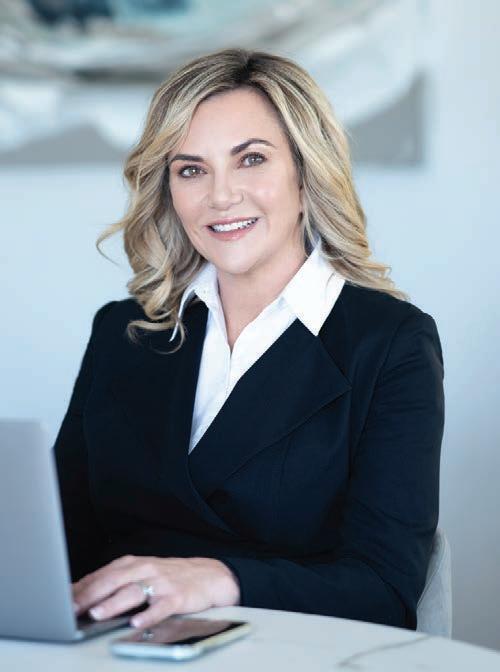
as polished at presenting, she’d delegate presenting to someone who shone in this area.
Maherry has a strict “no egos and no politics” rule because she believes people focused on themselves, rather than the team, add less value. She also strives to minimise hierarchies as far as possible because siloed thinking is less effective. She admits that it can be dif cult to nd people who embody all these attributes and share a similar mindset, especially as candidates may present differently when interviewed. That’s why her hiring process always includes a conversation at a coffee shop. “A candidate will obviously try their best to impress me, but I want to see how they treat others, especially when they have nothing to gain from the relationship,” she explains.
It’s this willingness to see the other side of a person’s nature that makes women good leaders, maintains Maherry. “We look at our team members as a whole person. For example, if someone has just had a baby, we’ll consider how this might affect how they show up. It’s about empathy.”
Her advice to aspiring women leaders? “I’ve often noticed that women hesitate to raise their hand for a role because they believe they are not ready or don’t have the skills, whereas a man would try anyway. You can’t wait for people to help you or see your value – you must be your own hero. This lesson applies as much in life as in business.”
Leadership comes naturally to Asanda Gcoyi, CEO of the Vapour Products Association. At school, she wouldn’t hesitate to raise her hand for the jobs other people didn’t want. She feels comfortable in challenging situations. As a university student, she volunteered to spend a week in Oranje, interviewing residents ahead of the 2005 elections – no small task for a black female. Similarly, she was the rst African female to attend Peking University’s international class where she completed her MBA. “My trajectory

“Women should never feel unable to reveal their softer side. It’s that ability to empathise that helps us find solutions.” – Asanda Gcoyi
has always been plotted according to the questions: What can I do now? What new way can I nd to stretch myself?”
While this quality has been a driving force throughout her career, her approach to leadership has evolved signi cantly. “I used to be impulsive, doing things because they felt right at the time. I’m now more grounded. I have come to understand the importance of understanding others, so I have become more consultative. Although I still understand the buck stops with me, I am open to input and eager to let people try things.” This may be because she has learned to develop trust in her team members – a natural outcome of her efforts to capacitate them. “When you’ve helped people grow, it’s important to let them try out the skills they’ve developed and to let them know that it’s okay if they fail.”
Gcoyi maintains that, as leaders, women are relatable. In the boardroom, the instinct to nurture translates into a natural talent for handling con ict. One of the questions she was frequently asked in her days as an executive coach was how women could become as “feared” as men – her answer was unchanging: “Women should never feel unable to reveal their softer side. It’s that ability to empathise that helps us nd solutions.”
Gcoyi believes actions like this make leadership a journey of self-discovery. “Often, we want to skip a step and move ahead because this journey forces us to confront parts of ourselves we don’t like. But that’s how we grow. Most of us know our strengths, but addressing your weaknesses helps you be a more grounded leader who is not easily shaken.”
If a single action could be said to encapsulate Nicole Dodd’s feelings about how women should approach power, it would be her recent decision to enter Mrs South Africa. “This was all about stepping out of my comfort zone, forging new networks and creating communities,” she says – all of which are actions women leaders need to work on. Dodd, a partner and specialist recruiter in tech and digital at REDi Recruitment, initially studied information systems. After realising a career in software development was not for her, she was contacted by her current employer, who thought she might be a match for one of their tech clients.
Instead, they offered her a job seeking out specialist IT skills within their own ranks. So began Dodd’s career climb: “When I rst joined the rm, I focused on building the IT recruitment portfolio, but also looked after the HR portfolio until a new consultant took over. Two years later, I started mentoring that consultant. In 2016, I moved into management and began building my own team to assist me with IT recruitment.”
Another move came in 2018, when Dodd concentrated on strategic projects, working independently until she decided she was ready to build and manage again. “I wanted to teach, nurture, impart my knowledge and experience and watch someone grow,” Dodd comments.
This accent on development remains the foundation of her approach to leadership. Dodd is keenly aware of the “emotional” side of leadership and maintains it is one of the strengths of female leaders. “We have a talent for making people feel seen, supported and valued.” She also believes women leaders are resilient and adaptable and can juggle the demands of work-life balance.
The key to harnessing these positives lies in leading with authenticity, but it also requires refusing to let others take responsibility for your con dence. “Have a support system in place, nd a community that shares your passion, and continue to learn and grow throughout your career,” she advises.
Research reported on science.org reveals that collaboration improves under women leaders.










A reflection on the fi ve-year journey of the VAPOUR PRODUCTS ASSOCIATION OF SOUTH AFRICA and a look at its future
Whether elding questions on youth access to vapour products or discussing evidence-backed research on vaping as a harm-reduced alternative to smoking, Asanda Gcoyi, chief executive of the Vapour Products Association of South Africa (VPASA), remains poised and un appable. Gcoyi has spent the past ve years striving to bridge the knowledge gap surrounding vaping and its potential role in tobacco harm reduction in South Africa.
Throughout Gcoyi’s tenure, VPASA has navigated complex conversations in the country’s public health landscape. As the Tobacco Products and Electronic Delivery Systems Control Bill works its way through parliament, a look back reveals the signi cant milestones the organisation has achieved under her leadership.
VPASA’s mission has always been to educate smokers and the public about vaping. VPASA has actively advocated for smokers to switch to vaping given the scienti c evidence that shows vaping’s role as a harm-reduced alternative to smoking.
Yet Gcoyi acknowledges that when she rst joined the organisation, the lack of public understanding about vaping was and in many ways still is a signi cant challenge. Many people equate vaping with smoking, leading to misconceptions that it could be as dangerous, if not more so, than smoking.
“We recognised there were a lot of misconceptions,” says Gcoyi. “Due to information gaps in the public domain, many smokers were left to gure things out for
themselves without any concerted effort by organised industry or anti-smoking advocates to inform them they could reduce their harm exposure from the toxicants found in tobacco smoke simply by switching to vaping.”
To address this, VPASA embarked on a multipronged educational campaign. Gcoyi’s understanding of the importance and the use of various media channels to reach a diverse
GCOYI HAS SPENT THE PAST FIVE YEARS STRIVING TO BRIDGE THE KNOWLEDGE GAP SURROUNDING VAPING AND ITS POTENTIAL ROLE IN TOBACCO HARM REDUCTION IN SOUTH AFRICA.


audience meant public relations and social media became a crucial tool for disseminating information. Television and radio interviews, with community radio taking centre stage more recently, provided a platform to reach demographics that might not be active on social media. The targeted content aimed to educate the public on the core differences between vaping and smoking.
VPASA’s commitment to consumer education extends beyond its own initiatives with the organisation giving its members opportunities to both learn and share their knowledge of and experiences with vapour products.
Gcoyi highlights an initiative by Vaping Saved My Life (VSML), a consumer advocacy group focused on providing practical information to consumers, empowering them to make informed choices and learn through real experiences.
“VSLM did a study last year — a social experiment — of a number of smokers on a journey to quit smoking,” explains Gcoyi. “The study became an educational tool with the smokers chronicling their day-to-day experiences.”
This real-world experiment documented the experiences of several smokers transitioning to vaping. Their resulting report offered valuable insights into the challenges faced by those seeking to quit smoking and the role vaping could play in their journeys.
Beyond its digital channels, partnering with local newspapers further allows VPASA to leverage the credibility and reach of traditional media. Informative write-ups on the differences between vaping and smoking provide consumers with a trusted source of information, complementing
Vapour Products Association of South Africa (VPASA) represents manufacturers, wholesalers and retailers of smoke-free vapour products in South Africa. We have come together to work with government and other stakeholders to develop legal regulations and standards for our industry and to ensure that consumers have access to all available information about vapour products.
As the united voice for the vapour products industry and a growing contributor to the South African economy, we are committed to ensure quality and safety in all our members’ products and marketing, and seek to contribute to the growing body of empirical evidence that our products represent a safer alternative to smoking and have the potential to save millions of lives.
VPASA’s efforts on social media and its website.
The organisation has also initiated collaborations and discussions with the Advertising Regulatory Board and the South African Bureau of Standards to introduce vapour product advertising guidelines and standards, respectively. These are particularly designed to promote responsible industry practices and limit the appeal of products to nonsmokers, especially the youth.
At a time when the legislative process has been slow, the industry has seized the initiative to avoid unscrupulous practices and misleading communication about vaping.
Gcoyi acknowledges that VPASA’s achievements need to be viewed in the context of ongoing challenges. One signi cant hurdle is the affordability of vapour products when compared to the illicit cigarettes that are prevalent in South Africa, especially in lower-income communities. As a result, many nicotine addicts struggle to switch to vaping as a tool in the journey to quit smoking. This means more af uent South Africans have a higher chance of switching to vaping, thus reducing their harm exposure.
Her biggest hope when the time comes for her to step down is that her successor will be someone who appreciates the challenges in terms of addiction, affordability and accessibility at the community level. “I hope everyone who gets the privilege of working in this space will be prompted to drive making these products affordable.”
GCOYI EMPHASISES THE IMPORTANCE OF WORKING WITH POLICYMAKERS TO ENSURE REGULATIONS PRIORITISE PUBLIC HEALTH AND THE GROWTH OF THE INDUSTRY.
VPASA has maintained its commitment to its core principles of harm reduction and responsible sale, distribution and use of vapour products. To this end, Gcoyi emphasises the importance of working with policymakers to ensure regulations prioritise public health and the growth of the industry. Over the past ve years, she and her team have lobbied the government and played key roles in the public hearing process for the Tobacco Products and Electronic Delivery Systems Control Bill.
The looming regulations, including excise tax, present a complex issue, but VPASA, she says, is steadfast in its belief that responsible practices, access and affordability must be recognised as key concerns. The industry will need to adapt to the evolving regulatory landscape with stricter regulations weeding out less reputable companies that prioritise pro t over responsible practices.
“The law will be enforced and the next ve years will be a good period for consumers. Responsible marketing and age restrictions are important for sustainability. The industry will become more professional and those
operating in it, who stick around as regulations are implemented, will be the ones in it for the long haul.”
With Gcoyi at its helm since 2019, VPASA has made signi cant strides in educating the South African public about vaping. Through targeted campaigns, collaborations and engagement with traditional media, the team has challenged misconceptions and provided consumers and the public at large with valuable information.
As regulations conversations continue, VPASA’s focus on responsible practices positions the organisation as a key player in shaping the future of the vapour products industry in South Africa. There are undoubtedly challenges ahead, particularly regarding affordable access. Yet VPASA’s commitment to harm reduction and consumer education has laid the groundwork for navigating the complexities that lie ahead.



For more information: +27 (71) 425 0214 info@vpasa.org.za vpasa.org.za

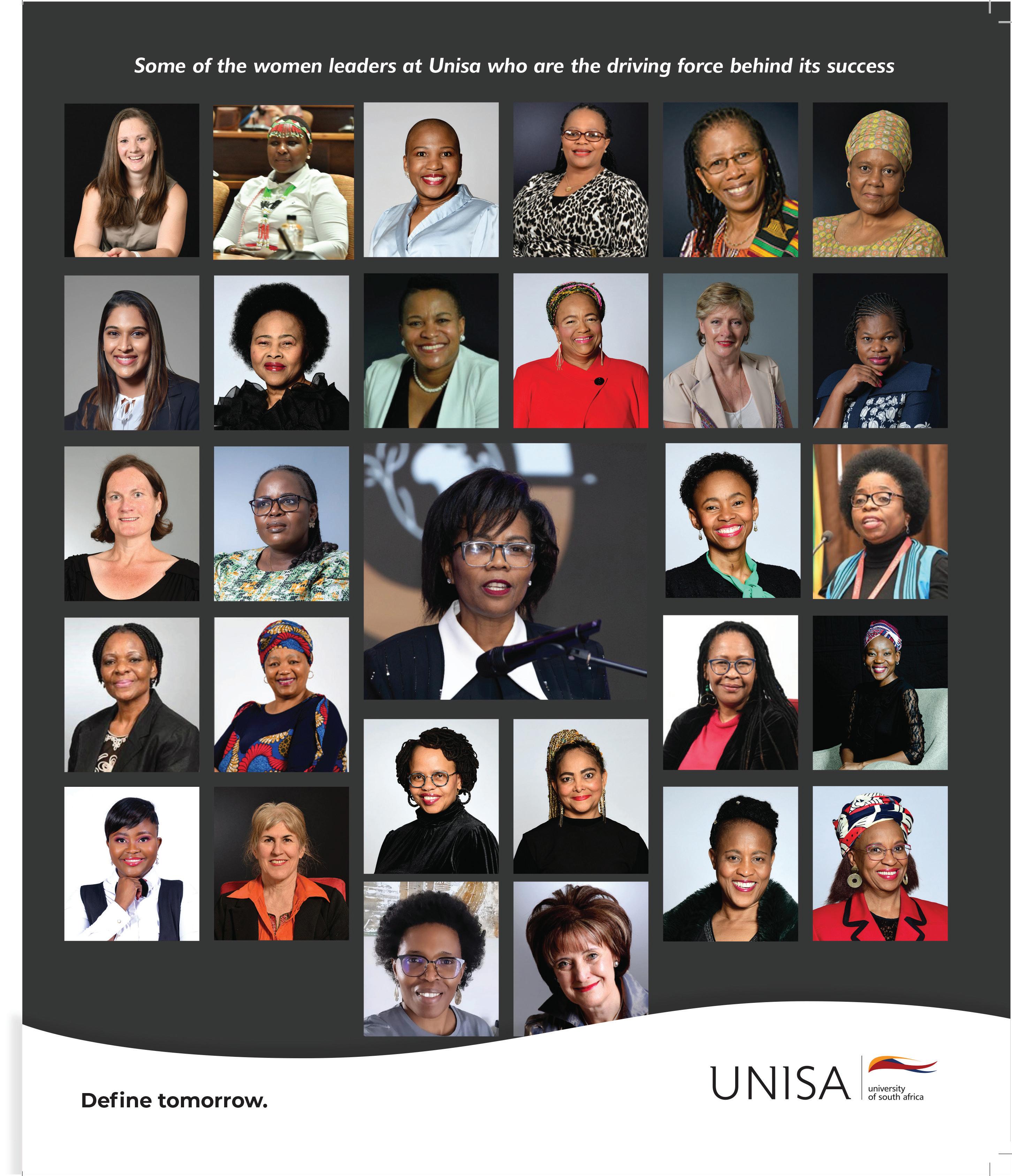

The University of Pretoria is providing mentorship and championing supportive and inclusive pathways for success, writes VUKANI MAGUBANE
The Faculty of Health Sciences (FHS) Research Hub and Graduate Hub at the University of Pretoria (UP), founded by black female leaders, Professor Tivani Mashamba-Thompson, supported by Dr Carol Nonkwelo, has set out to foster an inclusive research environment for future leaders in research at UP.
“By creating an environment where all researchers can thrive, the Hub not only helps individuals achieve their potential, but also contributes to the broader goal of diversifying the research community,” says Professor Mashamba-Thompson, professor of diagnostic research and the current deputy dean of research and post-graduate at UP’s FHS.
The FHS Research Support Hub, supported by UP’s Department of Research and
Innovation, is committed to creating an inclusive environment where mentorship and networking, professional development, advocacy and policy in uence, and resource allocation are prioritised. Professor Mashamba-Thompson emphasises that this enables a supportive environment to achieve real diversity and inclusion for previously disadvantaged groups.
Attracting young women to the sciences is highlighted annually by UP’s Women in Science Symposium, which focuses on women in scienti c elds. This year the
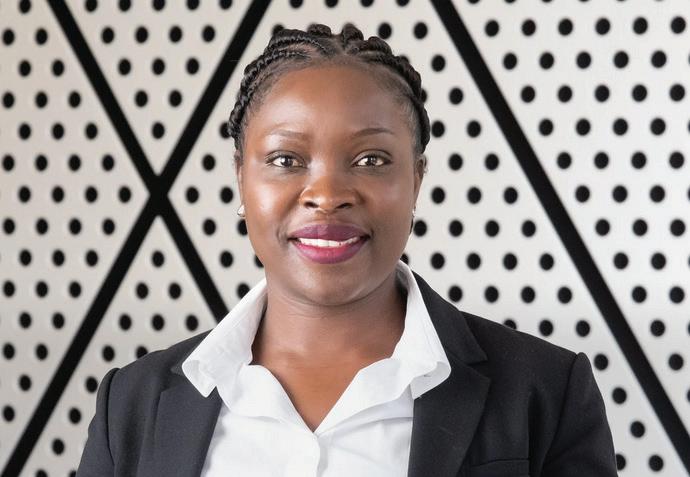
symposium focused on how successful women scientists can play a role in closing the gender gap in science.
The symposium participants highlighted the importance of young girls seeing female role models succeeding in science, technology, engineering and mathematics as a great motivator. “As women, we need to understand that when we actively, collectively work together to help each other rise, so much more can be done,” says Khanyisile Mahlangu, chairperson of the UP‘s temporary student committee.
SYMPOSIUM PARTICIPANTS HIGHLIGHTED THE IMPORTANCE OF YOUNG GIRLS SEEING FEMALE ROLE MODELS SUCCEEDING IN SCIENCE, TECHNOLOGY, ENGINEERING AND MATHEMATICS AS A GREAT MOTIVATOR.
For young girls excelling in science and mathematics seeing someone like them succeeding and thriving isn’t just inspirational; it is transformational. By
VUKANI MAGUBANE
In marking this year’s International Day of Women and Girls in Science, the United Nations noted that “although science, technology, engineering and mathematics (STEM) elds are widely regarded as critical to national economies, so far, most countries, no matter their level of development, have not achieved gender equality in STEM”.
Stellenbosch University (SU) and other leading universities in the country are doing their part in breaking down barriers and supporting young girls to gain exposure to STEM careers through various mentorship initiatives.

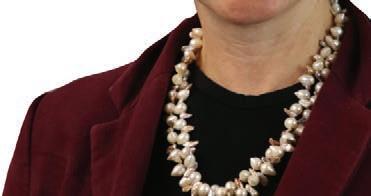
Since 2003, SU has hosted its annual Women in Engineering Roundtable for Grade 11 learners who excel in maths and science.
The girls are brought together to meet female role models from industry, academics and current engineering students to share their insights and experiences.
“SU is also part of an initiative run by several universities to guide and streamline Grade 12 learners into the STEM eld of study. STEM MentHER partners female academics and postgraduate students with learners, giving them access to tailor-made programmes so they can become role models for their peers in other environments,” says Professor Sara Grobbelaar, a professor in the Department of Engineering.
SU also runs an annual engineering Winterweek to give high school students a glimpse into the life of engineering

professionals through meeting and interacting with professionals in the industry.
TRAC South Africa is a national, nonpro t mathematics and physical science intervention programme of SU. It supports students in rural and township schools by helping them enhance their mathematics and physical science skills in Grades 11 and 12. Over 10 years, female learners in TRAC have increased by 10 per cent and more than 50 per cent of the female learners who go on to tertiary register for STEM courses.
“The university’s concerted efforts are evident in the rising percentage of women enrolling in engineering programmes – from just over 20 per cent a decade ago to 37 per cent in 2024 (404 out of 1 104 rst-year registrations are in engineering),” says Professor Grobbelaar. While many barriers still exist, progress is being made as young women see others looking like them succeed. “Mentorship programmes provide guidance and support, helping young girls envision themselves in these roles,” she adds.
STELLENBOSCH UNIVERSITY is encouraging more women to study engineering to enter the traditionally male-dominated industry and reports a steady increase in enrolments in the past decade
During a recent information session with Grade 12 girls, Prof Annie Bekker of Stellenbosch University’s (SU) Department of Mechanical and Mechatronic Engineering, planted a seed that will hopefully inspire more women to follow a career in what is traditionally a male-dominated eld: “Engineering took me to Antarctica, imagine where it could take you?”
Global statistics show that women are still under-represented in the science, technology, engineering and mathematics (STEM) elds. The World Economic Forum’s Global Gender Gap Report 2023 notes that women account for less than 30 per cent of the labour force in these elds.
Similarly, in South Africa, women generally make up 13 per cent of STEM graduates, according to a UNESCO (United Nations Educational, Scienti c and Cultural Organization) report, Cracking the code: girls’ and women’s education in STEM, while only one in ve engineers are women, reports the Engineering Council of South Africa (ECSA). “Women representation in engineering in this country is a story of attrition and lost opportunities to develop our country’s youth,” notes Prof Sara Grobbelaar, a professor in SU’s Department of Industrial Engineering.
The faculty is making a concerted effort to address the gender imbalance in engineering and various initiatives to attract and retain women students are paying off. Women enrolment in engineering programmes has increased from just over 20 per cent a decade ago to 37 per cent in 2024, which means that 404 out of 1 104 rst-year registrations at SU are within this eld.

ENROLMENT IN ENGINEERING PROGRAMMES HAS INCREASED FROM JUST OVER 20 PER CENT A DECADE AGO TO 37 PER CENT IN 2024.
a relatively small percentage of students eligible for entry into engineering diplomas, technologist quali cations or university engineering programmes, says Prof Grobbelaar.
“The problem starts with the schooling system where most of our human talent gets lost. The pipeline for human talent in South Africa is broken – especially if you are poor.” Of the small percentage who achieve the marks needed to apply for engineering programmes, only a few enrol for tertiary programmes. Retaining these students is also a challenge – nationally, only 50 per cent will graduate from their four-year programme within ve years, says Prof Grobbelaar.
Prof Celeste Viljoen, vice dean: teaching and quality assurance for SU’s Faculty of Engineering, says SU’s success rate is higher, with 75 per cent of rst year students completing their engineering degrees.
In April 2024, ECSA president Re lwe Buthelezi appealed for greater representation saying: “We must do everything humanely possible to encourage girls to choose STEM subjects and pursue careers in engineering as we prepare them for key engineering roles to drive infrastructure development and economic growth for a sustainable future.”
Prof Grobbelaar says this includes integrating STEM subjects with hands-on activities and science clubs and showing real-world engineering applications to help spark girls’ interest.
Women still experience challenges in what is perceived as a male-dominated eld, says Prof Viljoen. “These are often related to internalised and external unconscious biases and societal norms that cause them to retain the bulk of childcare duties. Prof Grobbelaar adds: “Representation matters; seeing successful women in engineering can help break down barriers and stereotypes.”
Mentorship, therefore, plays a signi cant role in encouraging more women to pursue engineering quali cations. “Scholarships and nancial support can be made more generally available to encourage female participation, especially in communities with signi cant nancial barriers,” says Prof Grobbelaar. Young women need to know that there are diverse career paths available within STEM elds. “It’s important for women to understand that they don’t have to t into a speci c technical role if that’s not their preference.
“By highlighting the diversity of roles within engineering and showcasing successful women in various positions, we can help more women envision themselves in these careers and make informed choices about their professional journeys,” concludes Prof Grobbelaar.



While these numbers do point to a welcome shift in the gender ratio, these enrolments are still among






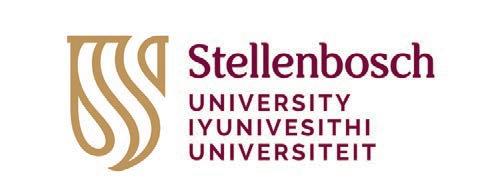





MORAG PHILLIPS and MARTIN HOPKINS unpack what fair pay
really means

Imagine you ask a group what “fair pay” means – you’ll nd a collection of views. If you then ask a group what “fair parenting” means, you’ll have another collection of views. The concept of fairness seems to rest partly in our own experience of the matter under consideration, tainted by our comparison of the application in our immediate context. To step out of pay for a while into the parenting world, a sibling allowed to have a smartphone at age 15 may deem it unfair when a younger sibling receives their smartphone at age 12. The sense of outrage that comes with an experience of unfairness makes it a burning issue. It burns brightly when it’s happening to us.
Fairness itself does not inherently have a bias. The concept of fairness revolves around treating all individuals or groups impartially and without favouritism or discrimination. It aims to ensure decisions, processes or outcomes are reasonable, justi able and consistent. Fairness typically refers to the quality of being reasonable and impartial. It involves ensuring decisions or actions are consistent, unbiased and considerate of all relevant factors. Fairness often focuses on the process or procedure by which decisions are made rather than the outcomes. For example, in a decision-making context, fairness might mean giving everyone an equal opportunity to voice their opinions or ensuring that rules are applied consistently to all individuals. So is it fair that both siblings got a smartphone? Does the timing make it different?

Managing pay practices with a focus on fairness, justice, equity and equality involves understanding each concept distinctly and designing a pay structure that balances these principles. Here’s a breakdown of each concept and how they relate to pay management.
1. Fairness: in pay practices implies impartiality and lack of bias. It ensures that decisions regarding pay are justi able and reasonable. Fair pay practices consider factors, such as job responsibilities and content, job grade, skills required and market rates for similar roles. Managers ensure fairness by applying consistent criteria across all employees and being transparent about how pay decisions are made. Again, it is the process or procedure, including measures to mitigate the in uence of conscious and unconscious bias.
2. Justice: is broader and often carries a moral or ethical dimension. Justice seeks to ensure individuals receive what they deserve or are entitled to, based on ethical or legal principles. In a pay context, justice refers to the moral or ethical dimension of pay practices. It involves ensuring employees receive what they deserve based on their contributions, efforts and performance. Just pay practices strive to reward employees proportionately to their impact on organisational goals and outcomes. Managers promote justice by aligning pay with performance metrics and recognising employees for their achievements fairly. Consideration of a living wage for a company’s lowest-paid employees is also relevant in the context of pay justice.
Fairness tends to focus on the impartiality and consistency of processes or decisions, while justice is concerned with the ethical or moral correctness of outcomes. Bringing these two concepts together, a just pay decision could reward a high-performer more than a nonperformer; the fairness is in the application and communication of the rules.
3. Equity: in pay practices involves ensuring employees receive fair remuneration relative to their contributions and responsibilities, regardless of demographic factors. Equity acknowledges that different roles may have different value contributions to the organisation and seeks to reward accordingly. Managers promote equity by conducting regular remuneration audits to identify and rectify any pay gaps based on unjusti able factors. An equity audit would test whether fairness has been applied. Equity re ects fairness by demonstrating that the outcomes of those decisions result in fair and just distributions of reward. In this way, equity is an outcome of fairness.
4. Equality relates to providing the same opportunities and treatment to all employees regardless of differences. In the context of pay, equality would mean paying equal wages for substantially similar work performed by employees. This concept is enshrined in laws and regulations to prevent discrimination based on protected characteristics. Managers uphold equality by ensuring that pay differentials are based on legitimate factors related to job performance and responsibilities, rather than personal characteristics.
We could ask which factor should be considered the most important. It is possible that pursuit of one element may mean we don’t achieve the other. In this example, we could say there is fairness, but not justice. Imagine a scenario where a company needs to downsize due to nancial dif culties. The company decides to retrench employees based solely on tenure, meaning those who have been with the company the shortest time are let go rst. This decision might be considered fair because it applies the same criteria (tenure) to all employees without discrimination. However, it may not be just if some newer employees have made signi cant contributions or have higher performance ratings compared to longer-tenured employees who are retained. In this case, fairness in terms of consistent application of criteria (tenure) is maintained, but justice may be lacking because deserving employees are being retrenched based on a criterion that does not necessarily re ect their value or contributions to the organisation.
This demonstrates that fairness and justice are distinct concepts that can sometimes con ict with each other depending on the context and the speci c criteria or principles being applied.
Achieving both fairness and justice often requires careful consideration of both the processes used to arrive at decisions and the outcomes that result from those decisions, taking into account relevant ethical, moral and contextual factors.
To design a pay structure that integrates fairness, justice, equity and equality, managers can consider the following strategies and practical tools.
• Job evaluation: conduct systematic job evaluations to assess the relative worth of different roles within the organisation, using a formal unbiased system – this creates the framework for just and fair decision-making.
• Performance management: implement a robust performance management system that objectively evaluates employee contributions and ties rewards to individual and team achievements. This creates defensibility for just decision-making.
• Internal pay audits: consider your internal pay patterns and any discrepancies that indicate equity issues.
• External market benchmarking: regularly benchmark salaries against industry standards to ensure pay rates are competitive and aligned with market trends to inform your own unique pay structure.
• Transparency: maintain transparency in pay practices by clearly communicating the criteria for determining salaries, pay increases and bonuses to employees.
• Regular reviews: conduct regular reviews of pay practices to identify and address any discrepancies or biases, ensuring that pay differentials are based on legitimate factors.
• Training and awareness: provide training to managers and employees on pay equity principles and practices to promote

understanding and adherence to fair and just pay standards. By integrating these principles into the design and management of pay practices, managers can create a pay structure that not only attracts and retains talent, but also fosters a culture of fairness, equity and respect within the organisation. The deep consideration of unintended consequences and testing whether all four dimensions have been considered is important. In summary, while fairness focuses on the fairness of procedures and decision-making, equity assesses whether those procedures result in fair and just outcomes. Together, fairness and equity aim to promote a more just and equitable organisation where everyone has equal opportunities and access to resources based on their circumstances and contributions.
A challenge to our industry is to see the determination of an organisation-specific living wage as a decision sparked by justice, supported by fair policy and resulting in an equitable outcome.
Morag Phillips is a master reward specialist, a SARA executive committee member, chair of the SARA Thought Leadership Committee and a member of the SARA Conference and Reward Awards Committee. Martin Hopkins is a master reward specialist and a member of the SARA Thought Leadership Committee and head of Reward Advisory Services at Bowmans Law.

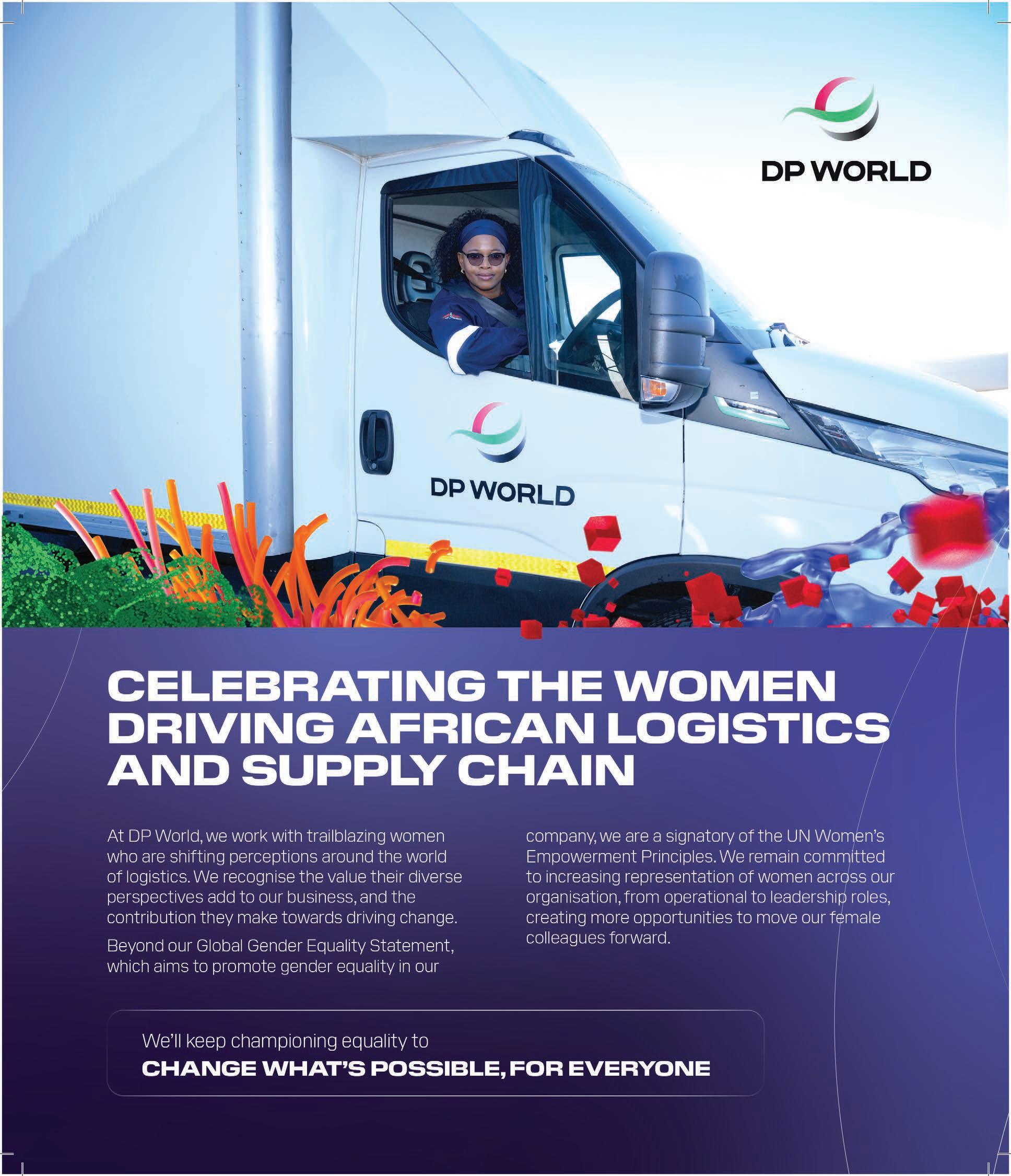
Gender representation in the South African automotive industry is being driven from within, writes TREVOR CRIGHTON
The South African automotive industry – important for its contribution to the country’s gross domestic product and global exports – is on a diversity, equity, inclusion and belonging (DEIB) drive that is rapidly turning it into a more representative industry.
Sarah Luthuli, executive director: human resources and transformation at MAN Truck & Bus South Africa, says they’re actively working to improve the industry’s diversity. “Currently, twenty-two per cent of our overall staff complement is female, and we endeavour to increase this number even more. At MAN, we believe DEIB is an essential driver of innovation, creativity and market success. Diverse teams bring a wider range of perspectives, experiences and ideas to the table,” she explains.
“Our commitment to employing seventy-two apprentices – thirty-six per cent currently female – is a testament to our long-term vision of creating a more inclusive industry. We also employ sixty students through the Yes4Youth programme, giving these young graduates an opportunity to be included in the world of work. Over the past two years, every new intake comprised a fty per cent ratio of female employees,” she says.
By investing in the development of young female talent, MAN is building a robust pipeline of skilled professionals. These women are the future engineers, designers and leaders who will shape the industry.

“Our goal is to create an environment where women feel empowered to reach their full potential. We are achieving this by creating one hundred per cent female project teams that manage complex projects for the business. This enable the women to grow and have visibility in the business,” explains Luthuli.
“At our recent annual Dealer of The Year Awards, the title for top bus salesperson was
awarded to Patricia Kriel and our Employee of the Year was awarded to Siyanda Mtolo, a black diesel mechanic from our Pietermaritzburg operation.”
South Africa’s rst locally produced eBus was manufactured in a bus body manufacturing factory in Olifantsfontein with a 12 per cent female staff complement and a chassis assembly plant in Pinetown with a female contingent of 28 per cent, which, Luthuli says, is a testament to the company’s commitment to DEIB and sustainable transportation.
“As we look ahead, we are con dent that by fostering a culture of inclusion and empowering our diverse workforce, we will continue to drive innovation and shape the future of the commercial vehicle industry,” she says.
The Retail Motor Industry (RMI) Organisation hosted its rst-ever “Women with Drive” webinar in August, gathering women from all spheres and levels of the industry to hear RMI president Jeánne Esterhuizen and MISA CEO Martle Keyter speak about the conditions women worked under in the past, and the challenges and barriers they overcame to lay a foundation for women who came after them.
The RMI has a proportionate representation of women in its leadership team, and many of its industry committees are women-led. Across its membership, it has seen an increase in women owning successful businesses such as electrical or mechanical workshops and motor body repair shops.
Margaret Wilcox invented the car heater, designing a system that transferred heat from the engine into the cab. She was granted a patent for the interior car heater in 1893.
Bertha Benz effectively invented improved brake pads, replacing the leather ones her husband Carl had fitted to their car when they failed on the vehicle’s very first road trip.
“OUR GOAL IS TO CREATE AN ENVIRONMENT WHERE WOMEN FEEL EMPOWERED TO REACH THEIR FULL POTENTIAL.” – SARAH LUTHULI
Florence Lawrence invented an Auto Signalling Arm in 1913 to warn following vehicles of turns and stops. Cars previously had no turn signals or brake lights.
The work overseen by Gladys Mae West at the US Naval Weapons Laboratory in creating the SEASAT and GEOSAT satellites to map the earth’s land and underwater surface laid the groundwork for the development of GPS technology that’s important to drivers today.

identical to the technology used for Europe. We are con dent that combining this proven best-in-class electrical consumption drive train with the local weight-optimised body will make the Lion’s Explorer E a similar success in the South African market, and we are herewith fostering our position as market and technology leader,” Aichinger says.







MAN TRUCK & BUS SA is leading the charge in electric bus technology. The company has introduced the Lion’s Explorer E, a locally designed and manufactured electric bus
The groundbreaking Lion’s Explorer E vehicle is the rst electric city bus to be both developed and built within South Africa. By combining the expertise of MAN’s local production facilities in Olifantsfontein and Pinetown, the company has created a bus that not only meets European standards, but also addresses the speci c needs of South African operators.
The Lion’s Explorer E boasts impressive speci cations. It is powered by four high-performance lithium-ion batteries of 80kWh each, resulting in a total energy content of 320kWh. This provides a range of up to 350km on a single charge. The MAN Lion’s Explorer 12E electric high- oor bus is a continuation of the current range of 12m long 4x2 LF bus design with slick bonded windows and an aerodynamically enhanced continuous side pro le.
The Lion’s Explorer E is designed to successfully drive zero-emission mobility forward. An integrated electric engine generates a peak performance power of 240kW. A maximum charging capacity of 150kW is enabled through a CCS Type 2 connector. Most battery electric vehicles (BEVs) suffer from excess dead weight, but the MAN Lion’s Explorer 12E is weight optimised and achieves a comparable passenger load carrying capacity as its equivalent MAN ICE product derivatives.

Jan Aichinger, managing director of MAN Automotive South Africa, emphasises the company’s commitment to leading the electric bus market in the country. With a strong market share in the traditional bus sector, MAN is determined to replicate this success in the electric segment.
“The Lion’s City E has, ever since its introduction, conquered the European market and become the European market leader, simply as MAN’s technology is superior. With the Lion’s Explorer E, we are not only introducing a locally developed concept, but also introducing the leading European technology to the South African market, as the main components are
Extensive testing has already been conducted in the Western Cape, with 17 000km of test mileage completed. Data collected will be shared, analysed and utilised by MAN SA’s Research & Development engineering teams to enhance its BEV products further, roll out production and develop the requisite market infrastructure. The vehicle is now set to undergo further trials in Gauteng.
“Meanwhile, a second locally produced vehicle has been shipped to our recently opened new design and test centre at our Ankara, Turkey-based plant. The Lion’s Explorer E will undergo an endurance test on a specially designed test track to ensure that the vehicle is t for the roughest South African conditions,” Aichinger informs.
As South Africa grapples with the challenges of urbanisation and air pollution, the Lion’s Explorer E offers a promising solution. By combining local manufacturing with advanced electric technology, MAN Truck & Bus SA is demonstrating its commitment to sustainable and ef cient public transportation.





For more information: www.man.eu/za

Measuring the impact of social initiatives is crucial to building sustainable, successful programmes, writes TREVOR CRIGHTON
It may seem obvious, but measuring the impact of an initiative – particularly where an organisation is funding entrepreneurs to create jobs and run sustainable businesses – is critical. “Measuring is important because you need to understand if you’re achieving your goals or wasting money,” says Bridgit Evans, executive director of the SAB Foundation.
“We work with entrepreneurs and want to understand what our investment in skills training, mentoring, coaching, psychological support and funding those businesses in the early stages is yielding – are they creating jobs, is their turnover increasing, are they becoming pro table?”
“It’s important for us to understand how the business is performing and also what the business owners think about the programme. We want to know how to improve so we can do better for more people – therefore measurement is vital,” says Evans. “There’s a lot of pressure on small, medium and micro enterprises to build the economy and there’s a whole ministry dedicated to building small businesses, but the challenge is we’re not actually measuring impact as a country.”

Reinoud Willemsen, partner at Embedding Impact, says impact measurement aims to understand if and how social impact has been achieved as a result of investments made. “Impact has to be understood from the perspective of the person experiencing the change; in other words, we need to engage the bene ciaries to understand if the activities implemented are addressing the issues they want to be addressed and if these activities are making the expected change, and if so, to what extent.”
He says impact doesn’t happen in isolation and not all impacts are positive, so funders must understand and accept negative impacts and accept accountability for these.
“Some clients would like to measure impact by narrating the changes observed, while others would like to express the changes in monetary terms by using the social return on investment methodology. With that, we place a nancial value on the changes experienced in a life by bringing back these changes to understand it from the perspective of aspects of wellbeing,” Willemsen explains.
Evans says quantifying impact can be simple in the light of understanding results, but there’s also little to benchmark against.
“We follow a business for ve years because we want to see if the support we gave them has had an impact by producing a sustainable operation beyond the programme,” she explains. “Because of how the last ve years have gone in the global economy, business survival is already a great outcome and we have a ninety per cent survival rate. But we need to see if they’re also still creating and maintaining jobs and building turnover.”
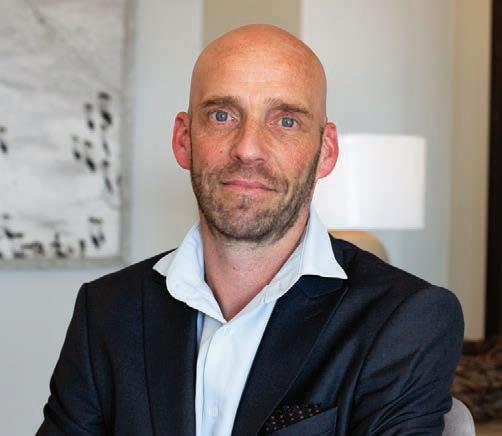
“IMPACT MEASUREMENT AIMS TO UNDERSTAND IF AND HOW SOCIAL IMPACT HAS BEEN ACHIEVED AS A RESULT OF INVESTMENTS MADE.” – REINOUD WILLEMSEN
“Success is determined by the individuals experiencing it,” says Willemsen. “In the case of women empowerment and gender parity initiatives, success most likely centres on aspects such as independence, ful lment and pride, alongside a likely improvement in income. Success is also determined by the set objectives: some funders are happy with any change, others would like to see a certain number of women being empowered and/or a certain range of change to be achieved. Learnings will need to be interpreted against the objectives achieved and in the context it is achieved.”
The SAB Foundation doesn’t have a speci c focus on funding women-owned businesses, but always works to ensure that participation in the programmes has a 50/50 gender split. “We also add wraparound support for female entrepreneurs because they play multiple roles – they are a business owner and also a mother, daughter, sister and provider, and that comes with other pressures,” says Evans.
The SAB Foundation has invested over R563-million to support 6 422 entities –70 per cent run by women and 55 per cent by youth, 87 per cent of the programmes are run by people in rural areas and 6 per cent of participants are persons with disabilities.
*Source: SAB Foundation Bridgit Evans
Debbie Goodman in discussion with Lauren
LIS TEN
ODEBBIE GOODMAN , CEO of Jack Hammer Global
Better support systems in professional environments are long overdue, says
ver the past few decades, there has been a signi cant increase in the participation of women in the workforce. Statistics South Africa reports that for Q2:2024, the labour force participation rate for women in South Africa is 55.8 per cent. And while there has been growing recognition of the importance of and support for women’s wellbeing in organisations – with topics such as maternity leave becoming more standardised – one taboo remains frustratingly overlooked: menopause. This is worrying when a signi cant proportion of women in the workforce –including those in senior leadership positions – fall within the menopausal range. So surely it is long past time to normalise and destigmatise the conversation around this natural life phase.
There is still this persistent idea that menopause only affects “older” women –meaning it does not impact our colleagues,
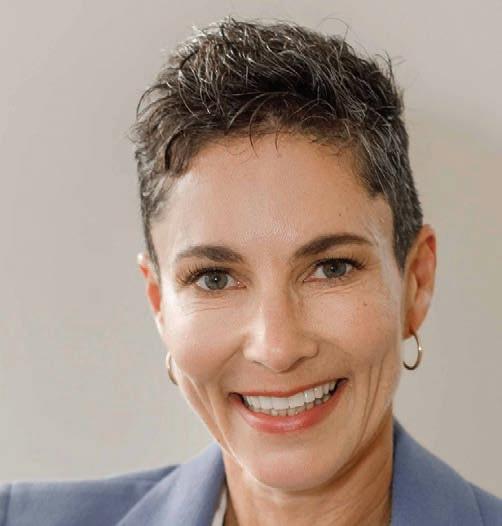
managers or most of the women we encounter during our workday. However, simple logic dictates that this is not true, given that menopause can start to arise even from the early 40s. So, there is a large number of women affected by menopause who show up every day and put in the work while battling the physical and emotional impact of menopause in silence.
Employers therefore have a signi cant role in ensuring that this sizeable portion of their workforce is properly supported. It is critical that women understand they are not alone, and that employers step up to provide the necessary support structures.
Most workplaces have policies and support available for a wide range of wellbeing-related matters, however, menopause is rarely, if ever, discussed, and it is almost nonexistent from a policy point of view. This lack of focus on menopause in corporate environments is startling given that women in their 40s and 50s often occupy senior and leadership roles, contributing substantially to company growth and culture.
There is no doubt that the issue of menopause is linked to ageism with resultant career implications. This means many women feel the pressure to hide their symptoms and overcompensate, which only compounds the burden of stress and anxiety. According to a UK study by BUPA, nearly 900 000 women left their jobs over an unspeci ed period of time due to menopausal symptoms – a third of them stating that lack of support was a major factor.
This level of attrition would be unnecessary if menopause were treated like any other health and wellness issue, such as pregnancy or burnout. Creating an open and supportive environment for women – especially those

navigating menopause – is essential to maintaining diversity and retaining top female talent.
Losing experienced employees and female leaders due to issues related to menopause – which could have been addressed through thoughtful policies and support systems –is essentially taking two steps forward and three steps back in terms of gender equality in the workplace.
As a starting point, organisations can improve awareness by educating employees, managers and executives about menopause and its effects. Training programmes, workshops and even basic awareness campaigns could go a long way towards shifting the stigma.
It is equally important that more female leaders speak openly about their experiences with menopause to normalise and destigmatise the conversation. With the right support, including clinical treatment where necessary, menopause does not have to put the brakes on a woman’s contribution in the workplace. The more open and comfortable everyone – both women and men – is about discussing menopause, the greater the productivity, wellbeing and retention of women in the workforce.
It is truly lamentable that an entirely manageable and natural occurrence in women’s lives has not yet received the attention it deserves. But by starting to raise awareness in workplaces and providing the necessary organisational support, we can begin to move in the right direction to the bene t of employees and organisations alike. By addressing the issue openly, companies can ensure they retain valuable talent and create healthier, more inclusive environments where all employees can thrive, regardless of age or gender.
South African insurance companies are helping lead the way in driving gender parity in the workplace. By
TREVOR CRIGHTON
The South African insurance industry is working hard to achieve better gender parity in a traditionally male-dominated business. Most research is done at C-suite level, but it’s not hard to extrapolate what the rest of the industry looks like. African Development Bank research shows that only 17.4 per cent of boardroom seats are occupied by women in South Africa, and the South Africa Board Index by Spencer Stuart reveals that just 25 per cent of nonexecutive directors on leading boards in the country are women.
Anashree Bheamadu, head of people at Discovery Insure, says senior female leadership at Discovery Insure comprises 47 per cent women. “We continue to emphasise achieving greater female representation at senior levels and building pathways for women to move into more senior leadership roles, helping build the pipeline in the levels below and effectively deal with the organisational and transitional barriers,” she says.

Bheamadu says the company is encouraged by the growing interest in insurance by women. “This dovetails neatly with our efforts to drive gender equality within our business. With the overall gender split leaning to majority women, it serves as a healthy pipeline for future female leaders,” she explains. “We are also fortunate as a business that we can plug into Discovery Women Move, an elevated platform for women by women within Discovery, that focuses on role modelling, networking, mentorship and inspirational leadership.
“Through this platform, we are empowered to highlight and address challenges women face in their career and leadership journeys, thus tackling them as a business with measurable programmes.”
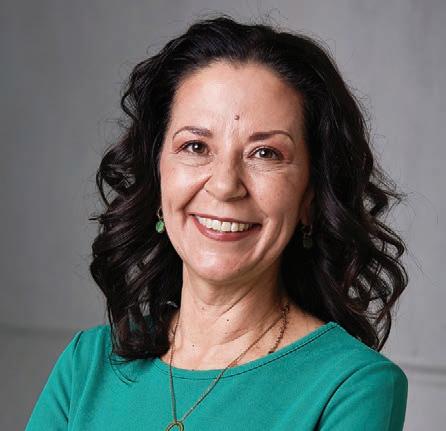
Seugnette van Wyngaard, head of First for Women at Telesure Investment Holdings (TIH), says the road to gender parity in the South African insurance industry has been a long one. “At First for Women, the majority of our workforce are women so we can authentically and consistently connect and resonate with the people we serve – women. It’s not a tick-box, but a business imperative. Every aspect of our brand has been designed for and by women. This is our differentiator, which has resulted in higher customer satisfaction, trust and loyalty.
“We encourage the South African insurance industry to embrace the UN Women’s Economic Empowerment Principles to promote gender equality in their workplace. Once adopted, businesses must ensure robust measurement and accountability mechanisms are in place. In addition, all women in senior roles should use their position to advocate for their female co-workers’ advancement. Doing so, through recognition, mentorships, encouragement and constructive feedback, is
not only an unspoken rule of the sisterhood, but also a business imperative,” says van Wyngaard.
Nonkululeko Maninjwa, head of transformation at TIH, says the women-focused diversity and inclusion initiatives provide equitable opportunities for learning and growth and include a young talent development programme, learnership and apprenticeship programmes, training programmes, and internal and external bursary programmes, with a variety of health and wellness programmes for female employees, a GBV support service and health screening days.
She explains that the insurance industry is facing a critical talent and skills shortage. “To attract a new generation of talent to the insurance industry and empower South African youth, TIH launched a bursary programme, open to full-time students aged eighteen to thirty- ve registered or accepted to study at various universities for undergraduate and postgraduate studies with a focus on speci c degrees. Thirty outstanding and deserving recipients were selected and are one step closer to achieving a future they have worked so hard to earn and rightly deserve,” concludes Maninjwa.
Women on South African boards report

A Women on South African Boards report from the University of Stellenbosch Business School shows that just 25 per cent of nonexecutive directors on leading South African boards are women, with 18.3 per cent of board members (nonexecutive or executive) being women and only 6.4 per cent being female executive directors. The same report shows that only 20.7 per cent of directors of JSE-listed companies are female.
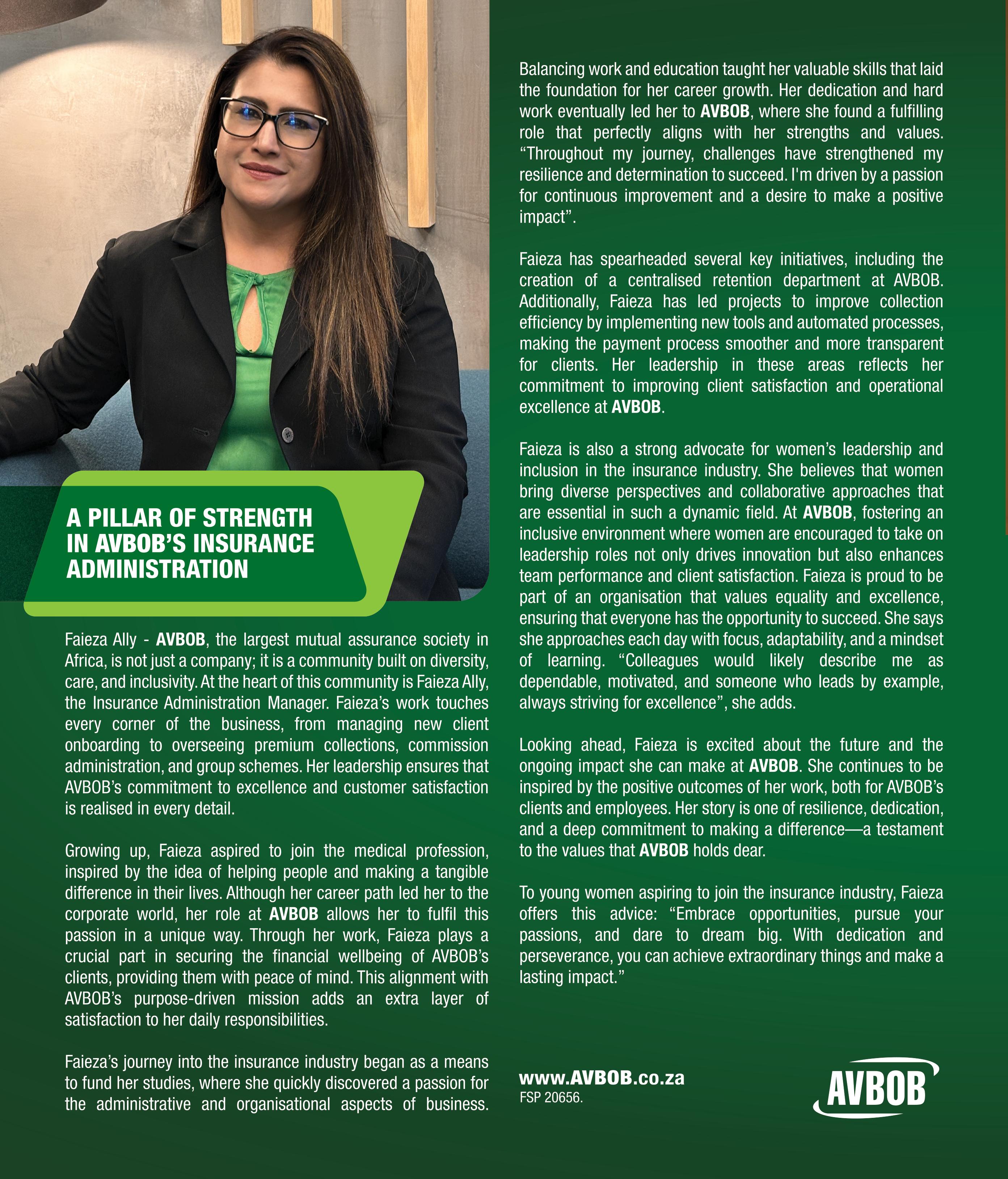


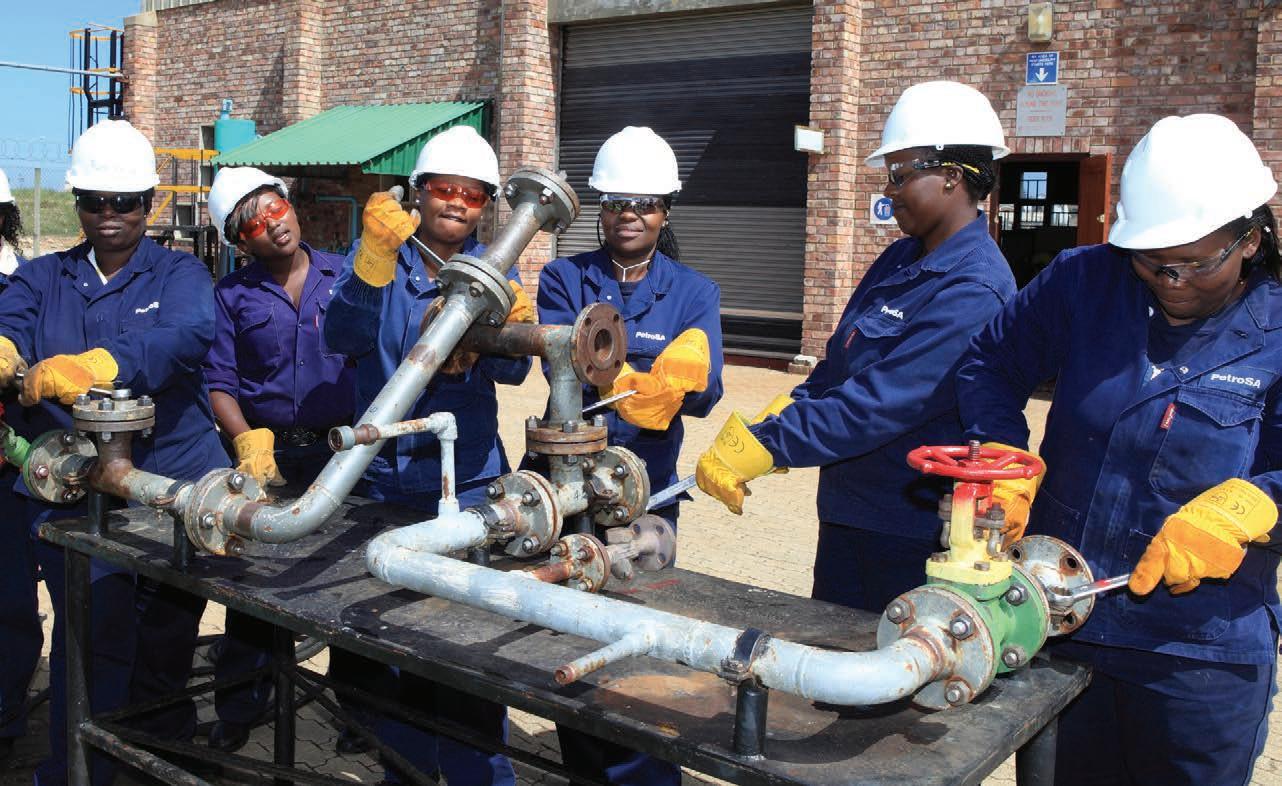
As the industry shifts towards cleaner energy solutions, the inclusion of diverse perspectives, particularly those of women, has become increasingly important for South Africa. With a mandate to contribute to South Africa’s security of energy supply, the Central Energy Fund (CEF) recognised the critical role women play in fostering innovation, sustainability and equity in a traditionally male-dominated eld.
By empowering the next generation of women in the energy sector, CEF aims to create an environment where women can thrive and lead, ultimately leading to an industry that is more inclusive, dynamic and resilient.
The state-owned entity, which controls subsidiaries with a focus on oil, gas, coal, renewable and clean energy options, remains resolute in its commitment to driving transformation and promoting gender equality across its group of companies through collaborative efforts involving education, mentorship, policy support and innovation.
There is much for CEF to be excited about as we have a R67-billion pipeline of projects at the CEF Group that no doubt will have tangible outcomes in terms of addressing security of supply issues with respect to energy. Giving women the opportunity to contribute to the strategic direction and the execution of this pipeline is not only important to the CEF Group, but also South Africa as a nation.
In every entity of the CEF Group, there is a substantive representation of women executives at board and exco level.
1.CEF Group Chairperson: Ayanda Noah
2.CEF Board Director: Unati Figlan
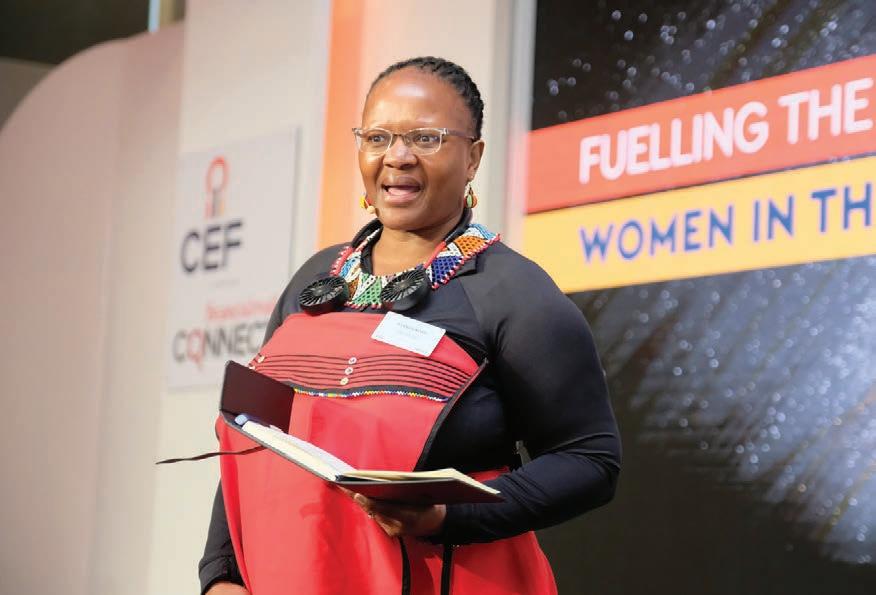
3.CEF Board Director: Gosetseone Leketi
4.CEF Group CFO: Ditsietsi Morabe
5.CEF Group Executive Legal, Risk, Compliance: Brenda Moagi
6.CEF Group Executive Corporate Services: Zinhle Thupana
7.CEF Group Audit Executive: Fhatuwani Tshikomba
8.SANPC Board Director: Dr Nompumelo Siswana
9.SANPC Board Director: Nosizwe Nokwe-Macamo
10.SANPC Board Director: Makgola Makololo
11.SANPC Board Director: Phumeza Zimasa-Dhlamini
12.SANPC Interim Executive Corporate Services: Rose Stevens
13.SANPC Interim Executive Legal & Compliance: Xoliswa Mpongoshe
14.PASA Board Director: Rebone Nkambule
15.PASA Board Director: Carmen Mpelwane
16.PASA Board Director: Matlhodi Ngwenya
17.PASA Executive Comms & Stakeholder: Unati Magida
18.PASA Executive Licensing & Regulations: Sibongile Malie
19.PASA Chief Information Of cer: Vuyiswa Ramosangoana
20.AEMFC Board Director: Dudu Hlatshwayo
21.AEMFC Board Director: Phutanang Motsielwa
22.SFF Acting CFO: Amina Allie


23.iGAS GM Operations: Sesakho Magadla
24.PetroSA CFO: Nombulelo Tyandela
25.SFF Executive: Natalie Taft
• Female representation increased from 33 to 38% in the nancial year 2023/24. The improvement in female representation denotes the group’s efforts to achieve a balanced gender pro le in its workforce.
• Female representation at top management level is 25.1%, and 31.3% at senior management level.
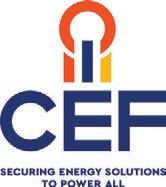







1.The CEF Group comprises entities, including:
• The African Exploration Mining and Finance Corporation (AEMFC) is responsible for the mining and supply of coal for the generation of electricity.
•The Petroleum Agency SA (PASA) promotes and regulates oil and gas exploration and production in South Africa.
•The South African National Petroleum Company (SANPC), which came from the amalgamation of the PetroSA, iGAS and SFF entities in 2023, is poised to become the leading player in South Africa’s oil and gas industry.
•Legacy Entities, made up of PetroSA, iGAS and SFF, is responsible for winding down legacy assets requiring further work before they can be fully transferred into the SANPC.
• To address the increased demand for cleaner, more sustainable energy supplies, CEF also has the in-house Energy Projects Division , which is responsible for the commercialisation of new energy technologies.
2.The organisation derives its mandate primarily from the Central Energy Fund Act No. 38 of 1977 and operates in South Africa with strategic partnerships in Ghana and Mozambique.
3.The organisation is also responsible for managing the Equalisation Fund on behalf of the government.
For more information, visit the company’s website at www.cefgroup.co.za
Women across our continent are a rising force in unexpected industries. Nearly 30 years post-Beijing, African women are redefining leadership and breaking barriers across business, tech, and more.
By RAINA JULIES
Next year marks 30 years since the Fourth World Conference on Women in Beijing, where 189 countries adopted a pivotal policy on gender equality. While the conference’s impact has arguably only been partially effective, it has spurred signi cant policy changes and raised global awareness, advancing women’s rights in education, health and political participation. However, ongoing issues, such as gender-based violence, wage disparities and limited leadership opportunities, highlight that true
Women also hold 50 per cent of entry-level positions, and they still lack access to the C-suite, with only 25 per cent in top positions.
However, 2024 may just mark a signi cant turning point for African women. By all accounts, African women are reshaping industries and rede ning leadership across the continent. From business and technology to agriculture and science, African women are breaking barriers and driving transformative change.

welcome individuals from all backgrounds, regardless of nationality or resources.
Currently pursuing her PhD in aerospace sciences, Sabry is conducting research at NASA’s Humanspace ight lab. Her signi cant contributions to the eld of space are complemented by her expertise in diverse disciplines, including mechatronics, robotic surgery, stem cell development, augmented reality, Formula 3 car design and bioastronautics.
Sabry is dedicated to increasing the visibility of Egyptians, Africans and Arabs on global platforms. Through her extraordinary journey to space, she inspires audiences to overcome challenges and view the world without borders. She shares her insights on the transition from engineering to entrepreneurship, recounts her space voyage and the Overview Effect, and highlights the crucial role of space technology in tackling pressing climate challenges on earth.
Here we pro le women who are not only breaking stereotypes, but also represent the resilience and adaptability of African women as they shift societal norms.
Sara Sabry is a trailblazing astronaut, activist and change advocate. As the rst Egyptian astronaut, the rst Arab woman in space and the rst woman from Africa to venture into space, she has etched her name into the annals of history through her remarkable contributions to space exploration.

The founder and executive director of the Deep Space Initiative (DSI), Sabry leads a nonpro t organisation committed to enhancing accessibility and opportunities within the space sector while promoting deep space exploration for everyone. Under her leadership, DSI has created inclusive research and educational opportunities that



A fervent advocate for equality and human rights, Sabry champions inclusivity on the global stage. She is actively involved in humanitarian initiatives aimed at addressing human rights concerns worldwide. Through her advocacy, she empowers marginalised communities and promotes social justice for all.
Her humanitarian efforts in the space sector have earned her numerous accolades, including the IAF Emerging Space Leader award, the STEAM Innovation award and the Space Future award. Sabry has been featured in major media outlets such as CNN, Forbes, Vogue, BBC, CNBC and France24. Her achievements as an astronaut, leader, entrepreneur and advocate re ect her unwavering commitment to making a positive impact and inspiring others to chase their dreams.





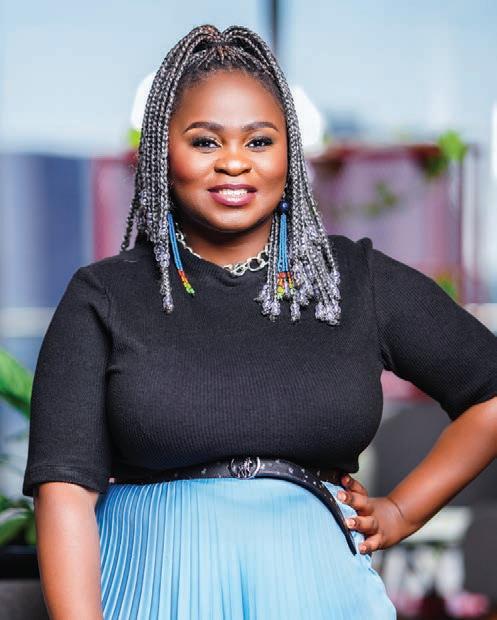
In the competitive broadband infrastructure sector where giants, such as Vumatel and Vodacom, dominate, Nomso Kana is emerging as a formidable player. This innovative nuclear scientist has transitioned into entrepreneurship, reshaping Africa’s digital landscape through her visionary company, Simsciex Technologies. Her journey exempli es resilience, passion and a commitment to a connected Africa.
Originating from a small village in the Eastern Cape, Kana proudly embraces her “Village Girl” identity as a source of motivation to break barriers and effect meaningful change in her community. Inspired by her parents, both educators, she developed a fascination for science after watching Star Wars
Kana’s career in nuclear science was marked by numerous accolades, but her ambition led her to establish Simsciex Technologies, aiming to tackle the continent’s broadband challenges. The idea for her venture emerged during her time as a scientist when she recognised the inef ciencies of transporting con dential reports. “The need for better technology solutions became clear,” she explains. “High-speed broadband could streamline our work, leading me to explore the broadband access space.”
Today, Simsciex Technologies is a prominent player in broadband solutions, providing services, such as bundled Wi-Fi packages, infrastructure development and strategic business insights across various sectors including aviation and energy. However, the
path has been fraught with challenges. “The ecosystem is monopolised, making it dif cult for small companies to secure jobs,” she notes. The company’s rst project involved deploying bre for the City of Johannesburg, a signi cant learning experience.
Driven by her mission to bridge the connectivity gap, Kana faces the challenge of building infrastructure in rural areas where homes are widely spaced, making connectivity costly. “I dream of equal internet access across the continent, but the resources required are immense.”
As a presidential commissioner for the Fourth Industrial Revolution, Kana recognises the economic impact of broadband. Citing Kenya’s ICT policy success and subsequent gross domestic product growth, she emphasises the transformative power of connectivity. In South Africa, Simsciex is improving rural and urban access through innovative solutions.
With broadband connectivity pivotal for economic growth – showing a 7–13 per cent increase in employment rates – Kana’s efforts are crucial. Although South Africa’s internet penetration has signi cantly improved, there’s still much to achieve. Simsciex is now eyeing opportunities in Tanzania and beyond, addressing Africa’s expanding connectivity needs.
Kana is poised to illuminate Africa with the promise of connectivity. The future is indeed looking brighter and more interconnected than ever before.
prioritise stewardship for future generations over personal legacies. “She envisions a thriving Africa through her ve commitments –a call to action for leaders to focus on collective success,” states Cleopatra Agoro, partner at Advisory Kulture.
Kuuya has built a distinguished career in strategy, culture, leadership transformation and public policy. Engaging in impactful dialogues with executives and national leaders, she shapes transformative discussions. Her accolades include the 2018 Emerging New Leader Award by the Crans Montana Forum and roles as a UNESCO Inclusive Policy lab expert and a contributor at Chatham House.
As a sought-after speaker, Kuuya captivates audiences with her vision for Africa’s future, inspiring action at conferences and corporate events. Additionally, she serves as a nonexecutive director for a listed bank in Tanzania, reinforcing her in uence in the nancial sector.
Driven by the vision of a prosperous Africa, Kuuya and her team at Advisory Kulture are committed to enabling future success. Headquartered in Johannesburg, with of ces in Lagos and Harare, Advisory Kulture provides tailored advisory services to address the
Ethel Kuuya is a dynamic leader and entrepreneur, driving a transformative movement across Africa with her visionary approach. In her insightful book, Leading Beyond Now, she sets a new benchmark for leadership in Africa. At the heart of her book are essential commitments needed to rejuvenate the continent. Kuuya calls for a signi cant mindset shift, urging leaders to







Esther Kimani, a bright new star in the world of agricultural technology, has garnered signi cant attention with her recent win of the Royal Academy of Engineering’s prestigious Africa Prize for Engineering Innovation. Announced earlier this year in Nairobi, Kimani’s innovative work focuses on addressing critical challenges facing smallholder farmers in Kenya, positioning her as a key gure in the future of sustainable agriculture.
Born and raised in Kenya, Kimani developed a keen interest in technology and agriculture from a young age. She recognised the struggles faced by smallholder farmers – the backbone of Kenya’s agricultural landscape. With an alarming statistic revealing that these farmers lose, on average, 33 per cent of their crops to pests and diseases, Kimani was determined to create a solution that would empower them to protect their livelihoods.
Her ground-breaking invention is a solar-powered pest detection tool that employs arti cial intelligence and machine learning-enabled cameras to identify agricultural pests and diseases swiftly.
who sustain Kenya’s economy. The tool’s affordability – leasing for just $3 per month, markedly cheaper than traditional pest detection methods – makes it a viable solution for farmers.
Kimani is not only changing how farmers approach pest management, but also inspiring a new generation of technologists dedicated to creating sustainable solutions. Her vision for the future includes further development of her technology, ensuring it continues to make a meaningful impact on agriculture and food security in Kenya and beyond.


The Africa Prize for Engineering Innovation, founded in 2014, aims to empower African innovators to develop sustainable and scalable solutions to local challenges. Over its decade-long existence, the prize has supported nearly 150 entrepreneurs across 23 countries, generating significant employment and benefitting millions of people with innovative engineering solutions.
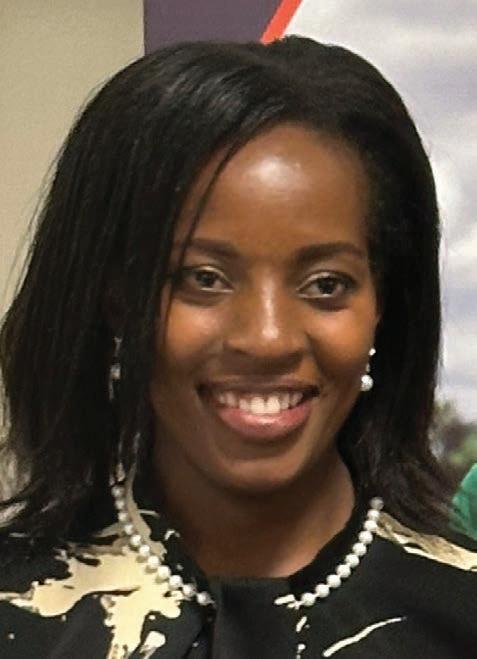
Poppy Tshabalala, managing executive of public enterprises at Vodacom Business, spearheads the company’s efforts to support digital transformation in South Africa’s public sector. Her role involves working closely with all levels of government, from national to local, to align Vodacom’s digital solutions with government needs.
With an extensive career across both public and private sectors – including positions at Accenture, Eskom, Microsoft and UNISA – Tshabalala brings a wealth of experience to her role. She has been instrumental in numerous impactful projects, such as enhancing the Gauteng Education Department’s eAdmission system, launching a free e-learning platform and rolling out virtual classroom solutions in rural schools. Under her leadership, Vodacom’s smart utility services have improved energy management and cost savings for municipalities.
Driven by a purpose-led vision, Tshabalala emphasises collaboration and integration within government departments to reduce silos and enhance service delivery. She is proud of Vodacom’s partnership with the government, working together to maximise limited budgets while enhancing ef ciency and citizen engagement through innovative digital solutions.
Looking ahead, Tshabalala remains committed to fostering partnerships that drive positive change and improve the quality of public services, ensuring that technology and humanity work hand in hand to move South Africa forward.
Komala Pillay, CEO of the Citizen Leader Lab, is championing the development of conscious leaders for the betterment of society and business. Transitioning from a successful engineering career, she has dedicated her efforts to improving the lives of South Africa’s most vulnerable communities through innovative human resources initiatives.
After nearly 20 years in the private sector, Pillay left her role at a global chemicals and energy company in 2020 to focus on a greater purpose. Recognising the urgent need to address socioeconomic inequalities in South Africa, she joined Citizen Leader Lab to cultivate capable leadership across all sectors.
“Our mission is to foster conscious leadership that builds social cohesion and uplifts communities,” Pillay explains. Central to this mission is the agship programme, Leaders for Education, which pairs public school principals with business leaders for immersive leadership development. This initiative bridges the gap between public and private sectors, empowering principals from under-resourced schools and fostering impactful partnerships.
The Leaders for Education programme transforms the way leadership development is approached. Rather than a traditional mentorship model, it promotes collaboration between principals and business leaders as co-creators of solutions. Participants develop essential leadership skills, increasing con dence and resilience while enhancing






communication and team management abilities. In return, business leaders gain insights and perspectives that illuminate challenges faced in education, fostering innovative solutions.
“Business leaders bring fresh perspectives and networks to the table, acting as thinking partners for principals who have long grappled with pressing challenges,” Pillay notes. This synergy nurtures an environment conducive to learning, inspiring positive changes in the education system.
The initiative also bene ts business leaders who develop their leadership skills outside their usual environments by exercising in uence without formal authority. Engaging with the school community helps them develop a deeper understanding of the challenges in under-resourced areas, which can improve relationships between businesses and local communities.
Pillay believes these collaborative engagements are vital for social renewal and capacity-building. As leaders in positions of power, executives can unlock potential and inspire change within their organisations and beyond. “Our work supports businesses in achieving their leadership goals while contributing to the socioeconomic upliftment of our country,” she states.


















“I learned the importance of humility, listening to diverse perspectives and making decisions that prioritise the collective good,” she notes.





Mosha Senyolo has made history as the rst black female president of the Association of South African Quantity Surveyors (ASAQS). Although she describes her appointment as “a surprise”, those around her recognise it as a well-deserved milestone in a career marked by numerous achievements.
“Becoming the rst black woman president of such a globally respected organisation was never an ambition of mine, but I am deeply honoured,” Senyolo re ects. “This achievement is a testament to my dedication and passion for our profession.”
Having served as junior vice president at ASAQS in 2021, Senyolo gained valuable insights into senior leadership responsibilities and the organisation’s strategic direction. Her previous roles under the guidance of predecessors Keith Skinner and Newton Baloyi have shaped her leadership approach.

During her presidency, Senyolo aims to enhance ASAQS’s legacy while implementing necessary changes. “I plan to translate innovative ideas into measurable achievements built on the strong foundation laid by past presidents,” she explains. Her focus will be on improving member engagement and satisfaction through tailored programmes and communication strategies. Moreover, Senyolo aspires to expand ASAQS’s in uence locally and internationally. “My goal is to foster a culture of continuous improvement, ensuring every initiative contributes to our collective success and the advancement of our profession,” she states.
Passionate about the future of quantity surveying in South Africa, Senyolo emphasises the evolving role of quantity surveyors. “We are increasingly recognised for providing strategic insights and maximising returns on investment for diverse stakeholders.”
Her commitment to ASAQS stems from a deep sense of patriotism – a value instilled in her by her father, Thabo Senyolo, one of South Africa’s rst black-quali ed quantity surveyors. “Patriotism embodies a belief in something greater than oneself,” she says, drawing inspiration from fellow South Africans dedicated to their professions.
Lindiwe Mupona’s passion for transportation engineering is as dynamic as the intricate networks she helps to develop, ensuring South Africans move ef ciently and safely.
From an early age, Mupona was captivated by the complexities of urban planning and transport infrastructure. This interest led her to earn an honours degree in town planning, and later, a master’s degree in transportation studies from the University of Cape Town, where she graduated in 2004. Her career began as a junior transportation planner for a consortium preparing a Public Transport and Rationalisation Plan for the City of Cape Town. During this time, she discovered GIBB, a black-owned, multidisciplinary engineering and architectural rm involved in the same project. When she relocated to Gauteng in 2005, she joined GIBB’s Pretoria of ce. Today, Mupona plays a pivotal role in the rm’s transportation division, working on transportation planning, traf c engineering and modelling projects for public and private clients.
Despite her expertise and dedication, Mupona faced obstacles, including the

registered as a professional engineering technologist in 2019,” she explains. Mupona nds ful lment in designing ef cient, safe and sustainable transportation systems that bene t communities. “Traf c neering is about making cities and ommunities more liveable. It requires a understanding of human behaviour and urban planning,” she says. She enjoys applying her knowledge to tangible projects, whether designing a new taxi rank or

South Africa is witnessing a remarkable shift in leadership with a series of ground-breaking female appointments that are reshaping the landscape of various sectors. Notably, the recent appointment of Justice Mandisa Maya as the first female Chief Justice marks a historic milestone for the judiciary, symbolising progress towards gender equality in a traditionally male-dominated field. Her leadership is expected to inspire future generations of women in law and governance.
In the corporate sector, trailblazing female CEOs such as Bertina Engelbrecht are making significant strides.
Engelbrecht, who leads the multinational Clicks
contributing to major initiatives such as the Gautrain or the Bus Rapid Transport (BRT) system.
Some of the work Mupona is proudest of includes conducting a feasibility study for the proposed Cape Town Airport to CBD Rail Link, her work on the Gautrain modelling, being the lead transportation modeller for the development of the existing Saturn model for the City of Johannesburg Inner City Transport Master Plan and working as the lead on various other traf c impact studies and assessments, as well as her work on several transportation plans, the development of the Gauteng Visum Transport Model for the Gauteng Transport Master Plan and the design of traf c signals.
Balancing her demanding career with motherhood has been challenging. “I’ve learned to let go of ‘mom guilt’ and rely on my support system, including a full-time helper and tutor for my children. Working from home has also helped me achieve better balance,” she shares.
Mupona encourages other women in engineering to set boundaries and prioritise themselves and their loved ones. “Engineering can be tough and women may face obstacles, such as gender bias, but overcoming these challenges builds strength. Resilience, continuous learning and a problem-solving mindset are key,” she concludes.





Group, has been recognised for her innovative approach and commitment to diversity and inclusion within the workplace. Engelbrecht – the first woman to be appointed as Clicks Group CEO – won the 2023 Gender Mainstreaming RMB Fearless Thinker Award, the Positive Role Model Award and the Inclusive Leader Award.

Her leadership style emphasises collaboration and empowerment, setting a precedent for aspiring female leaders across the continent.



The African Women Leaders Network (AWLN), implemented with the support of the Office of the African Union Special Envoy on Women, Peace and Security, and the United Nations’ Entity for Gender Equality and the Empowerment of Women (UN Women), aims to enhance the leadership of women in the transformation of Africa, in line with the Africa Agenda 2063 and the 2030 Sustainable Development Goals (SDG). Aspiration 6 of the Africa Agenda 2063, “The Africa We Want”, envisions an Africa that is people-centred with gender equality and where women are empowered and play their rightful role in all spheres of life. This aspiration is also reflected in SDG Goal 5. The AWLN initiative is primarily a movement of women, facilitated by the African Union Commission (AUC) and the United Nations, under the leadership of HE Moussa Faki Mahamat, AUC chairperson, and HE Amina J Mohammed, deputy secretary-general. It is supported through the Office of the Special Envoy of the AUC Chairperson for Women, Peace and Security, Bineta Diop, and former UN under-secretary-general and executive director of UN Women, Dr Phumzile Mlambo-Ngcuka. The UN Women Liaison Office convenes AWLN’s regional consultation forums and provides co-ordination support to regional and country offices to establish local-level AWLN Chapters.

Natascha Viljoen was the fi rst South African woman to helm a major profi t driver within multinational mining giant Anglo American. Today she is the new executive vice president and COO of Newmont, an American-based mining company.
Statistics South Africa recently released a report, Gender Series Volume XI: Women Empowerment, 2014–2024, that reveals ongoing disparities in the labour market. According to the report, women in South Africa are more likely to face unemployment and less likely to participate in the workforce compared to men.
Economic empowerment is a cornerstone of achieving gender equality, yet significant gaps hindering progress remain. In South Africa, women continue to face challenges in accessing economic opportunities, despite policies aimed at promoting inclusion.
Gender Series Volume XI: Women Empowerment, 2014–2024


Nompumelelo Mpofu was the first black female to be appointed as the CEO of the South African Civil Aviation Authority (SACAA).
The 2024 Global State of Women’s Leadership

The Global Gender Gap Report 2024

Major Mandisa Mfeka is breaking barriers as the first black female combat pilot in the South African Air Force.

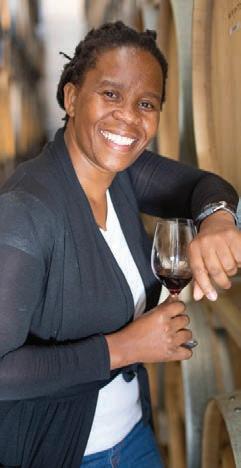
Nolitha Fakude was the fi rst black woman to chair the South African business operations of Anglo American, a leading global mining company, and an advocate for transformation in the mining sector.
Ntsiki Biyela , founder of Aslina Wines, was South Africa’s fi rst black woman winemaker.
